
|
TORAH PORTIONS
araw
VA-EYRA (And I Appeared)
Exodus 6:2-9:35
There are 84 Aleph-Tavs in this week's Torah portion
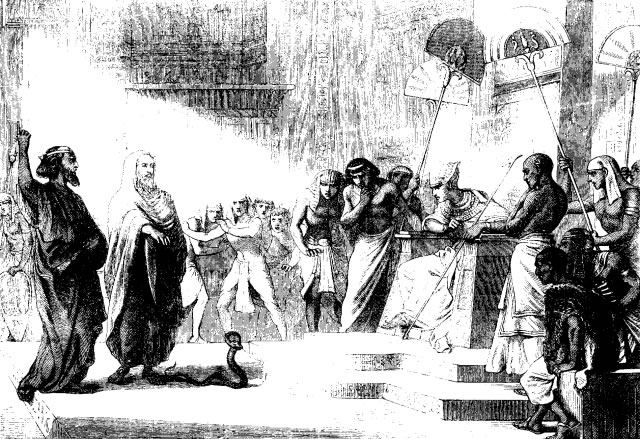
Note: you will need the oldheb.ttf (old Hebrew) and the SGreek Mediuim fonts to see the Hebrew and Greek text, as well as the three English fonts: Cooper Black, Impact and Frontlight MT Light. Right click the links and choose "Save Target As". Then go to the file, and either right click them and choose "install", or drag them into the font page.
oldheb.ttf
SGreek Medium
Cooper Black
Impact
Frontlight MT Light
NOTE: All of the yous and yours underlined as "you" and "your" indicates that the you and the your are plural. Also any of the words that are in bold pink lettering as "you" refers to the feminine gender, but it is only applied when it does not commonly refer to a woman. This only is applied to this week's Torah portion text at this time.
CHAPTER 6
Exodus 6:2-30
Exo 6:2 And Elohim spoke to Moses, and said to him, I am hwhy: 3 And I appeared to Abraham, to Isaac, and to Jacob, on the name in El Shaddai, and My Name, YAHWAH, I did not make known to them. 4 And I have also established (arisen) ta-My Covenant with them to give to them ta-the land of Canaan, ta the land of their sojournings which they sojourned in her. 5 And I, I have heard ta-the groaning of the Sons of Israel which Egypt has with enslaved (enbondaged) them; and I remembered (recalled, memorialized) ta-My Covenant.
6 By thus, say to the Sons of Israel, I am hwhy, and I will bring you out from under the burdens of Egypt, and I will deliver you from their enslavement (bondage), and I will redeem you on an Outstretched (Stretched Out) Arm, and in Great Punishments (Judgments, Sentences, Executions): 7 And I will take you to Myself for a People, and I will be to you for Elohim: and you shall know for I am hwhy, your Elohim, that brought you out [(the One bringing you out)] from under the burdens of Egypt. 8 And I will bring you [(I will make you go)] to the land which I have lifted up (bored up) ta-My Hand to give her to Abraham, to Isaac, and to Jacob; and I will give her to you of a possession: I am hwhy.
9 And Moses spoke thus to the Sons of Israel: and they did not listen to Moses from anguish (shortness, impatience) of spirit, and from cruel (harsh, severe) enslavement (bondage).
10 And hwhy spoke to Moses, to say, 11 Go, speak to Pharaoh, King of Egypt, and shall send away ta-the Sons of Israel from his land. 12 And Moses spoke to the Face of hwhy, to say, Behold, the Sons of Israel, they did not listen to me; and how should Pharaoh listen to me, and I am of uncircumcised lips?
13 And hwhy spoke to Moses and to Aaron, and commanded them to the Sons of Israel, and to Pharaoh, King of Egypt, to bring out ta-the Sons of Israel from the land of Egypt.
14 These were the heads of the house of their fathers:
The sons of Reuben, firstborn of Israel; Hanoch, and Pallu, Hezron, and Carmi: These are the families of Reuben.
15 And the sons of Simeon; Jemuel, and Jamin, and Ohad, and Jachin, and Zohar, and Shaul, son of a Canaanitess (Canaanite woman): These were the families of Simeon.
16 And these were the names of the sons of Levi according by their birthings; Gershon, and Kohath, and Merari: And the years of the life of Levi were seven and thirty and a hundred years. 17 The sons of Gershon; Libni, and Shimi by their families. 18 And the sons of Kohath; Amram, and Izhar, and Hebron, and Uzziel: And the years of the life of Kohath were three and thirty and a hundred years. 19 And the sons of Merari; Mahali and Mushi: These were the families of the Levites by their birthings.
20 And Amram took ta-Jochebed, his aunt, to himself for a woman (wife); and she birthed to him ta-Aaron and ta-Moses: And the years of the life of Amram were seven and thirty and a hundred years. 21 And the sons of Izhar; Korah, and the Nepheg, and Zichri. 22 And the sons of Uzziel; Mishael, and Elzaphan, and Zithri. 23 And Aaron took ta-Elisheba, daughter of Amminadab, sister of Nahshon, to himself for a woman (wife); and she birthed to him ta-Nadab, and ta-Abihu, ta-Eleazar, and ta-Ithamar. 24 And the sons of Korah; Assir, and Elkanah, and the Abiasaph: These were the families of the Korahites (Korhites). 25 And Eleazar, son of Aaron, took to himself from the daughters of Putiel to himself for a woman (wife); and she birthed to him ta-Phinehas: These were the heads of the fathers of the Levites by their families.
26 He was Aaron and Moses which hwhy said to them, Bring out ta-the Sons of Israel from the land of Egypt upon their armies. 27 These were the ones speaking to Pharaoh, King of Egypt, to bring out ta-the Sons of Israel from Egypt: He was Moses and Aaron.
28 And was, in the day hwhy spoke to Moses in the land of Egypt, 29 And hwhy spoke to Moses, to say, I am hwhy: Speak to Pharaoh, King of Egypt, ta-all which I have spoken to you. 30 And Moses said to the Face hwhy, Behold, I am of uncircumcised lips, and how should Pharaoh listen to me?
(NOTE: Not all verses will have comments)
Verses two and three
2 And Elohim spoke to Moses, and said to him, I am hwhy: 3 And I appeared to Abraham, to Isaac, and to Jacob, on the name in El Shaddai, and My Name, YAHWAH, I did not make known to them.
These are the sources that hwhy revealed to each of the founding fathers as "El Shaddai", which are noted in the Torah portions of Lekh L'kha, Toldoth and Vay-Yishlakh, in the book of Genesis:
ABRAHAM
Genesis 17:1 And Abram was a son of ninety years and nine years, and hwhy appeared to Abram, and said to him, I am El Shaddai: walk to My Face, and be perfect (complete),
ISSAC
Genesis 28:1 And Isaac called to Jacob, and blessed him, and commanded him, and said to him, You shall not take a woman (wife) from the daughters of Canaan. 2 Arise, go to Padan Aram, to the house of Bethuel, father of your mother; and take for yourself from there a woman (wife) from the daughters of Laban, the brother of your mother. 3 And El Shaddai will bless you, and will fructify you, and will multiply you, and you will be for an Assembly of Peoples;
JACOB
Genesis 35:9 And Elohim appeared to Jacob still (again) in his coming from Padan Aram, and blessed him. 10 And Elohim said to him, Your name is Jacob: your name shall not be called Jacob any more (still), for but Israel shall be your name: and called ta-his name Israel. 11 And Elohim said to him, I am El Shaddai: fructify and multiply; a nation and an assembly of nations shall be from with you, and kings shall go out from your loins;
Joseph also knew him as "El Shaddai", which is noted in the Torah portion of Va-Y'khi, in the book of Genesis
Genesis 48:3 And Jacob said to Joseph, El Shaddai appeared to me in Luz, in the land of Canaan, and blessed me,
As late as the time of Joseph, He was known as "El Shaddai", and it was guaranteed that Joseph's grandchildren didn't know His Name.
There have been put out various pronounciations to hwhy's name, for examples like Yahweh, Y'hovah, Y'howah, Yahuwah, Yuhwah, and the pronounciation of the Hebrew letters to His Name, Yod, Heh, Vav, Heh. There are those who use the typical name of "the LORD", or "GOD". To me, it doesn't matter how His Name is pronounced, because He will tell us how His Name is pronounced.
Verses four and five
4 And I have also established (arisen) ta-My Covenant with them to give to them ta-the land of Canaan, ta the land of their sojournings which they sojourned in her. 5 And I, I have heard ta-the groaning of the Sons of Israel which Egypt has with enslaved (enbondaged) them; and I remembered (recalled, memorialized) ta-My Covenant.
hwhy was making note to these verses from chapter two in last week's Torah portion of Sh'moth, in the book of Exodus
Exodus 2:24 And Elohim heard ta-their groaning, and Elohim remembered (recalled) ta-His Covenant of ta-Abraham, of ta-Isaac, and of ta-Jacob. 25 And Elohim saw ta-the Sons of Israel, and Elohim knew.
As I noted in the Torah portion of Sh'moth, in the book of Exodus, when hwhy remembered His Covenant with Abraham, Isaac and Jacob, it does not mean that He forgot about it until now. It means that He kept it in mind, and then brought it forth in priority. It is just like cooking two different things on a stove that go together to make a recipe. One item is put at the back burner cooking low while focusing and cooking the other item on the front burner. But when it is done, the item that was in the back burner is brought forth to the front burner to be worked on next. It is an act of priorities to hwhy. hwhy had to accomplish something first before he can bring the next task to the forefront for part of His Eternal Plan. This is similar in the Torah portion of Mikeyts, in the book of Genesis, when the Chief Cup Bearer who forgot about Joseph for two years, recalled Joseph who interpreted his dream, and told Pharaoh what Joseph did for the Chief Cup Bearer, hwhy's Plan to bring Joseph from the back burner to the front.
Indirectly related, hwhy had restated His Covenant to those who would go astray. An example of it is when hwhy told the Israelites that if they disobeyed to the extremes, hwhy will remove them from the land and scatter them in the nations. This is where hwhy continues on with this account, which is noted in the Torah portion of B'hukothai, in the book of Leviticus
Leviticus 26:40 And they shall make known (confess) ta-their iniquity and ta-the iniquity of their fathers on their transgressions (maligns) which they transgressed (maligned) against Me, and also which they have walked in contrariness with Me; 41 Also I, I will walk with them in contrariness, and I will bring them in the land of their enemies; if then shall knee bend (humiliate) their uncircumcised hearts, and then shall they accept (delight) ta-their iniquity: 42 And I will remember ta-My Covenant of Jacob, and also ta-My Covenant of Isaac, and I also will remember ta-My Covenant of Abraham; and I will remember the land. 43 And the land, she shall be wasted (forsaken) from them, and she shall enjoy ta-her Shabbaths among the desolation (devastation) from them: and they, they shall accept (delight) ta-their iniquity: because, and in because they despised (rejected, spurned, scorned) on My Judgments, and their souls abhorred (detested) ta-My Statutes. 44 And yet, that I will also not despised (rejected, spurned, scorned) them in their being in the land of their enemies, and I will not abhor (loathe) them to consume (finish, expire) them to void (dissolve, break up, violate) My Covenant with them: for I am hwhy, their Elohim. 45 And I will remember for them the Covenant of the Firsts (Beginnings), of which I brought them out from the land of Egypt to the eyes of the nations, to be to them for Elohim: I am hwhy. 46 These are the Statutes and the Judgments and the Teachings (Torahs) which hwhy has given between Him and between the Sons of Israel in Mount Sinai on the hand of Moses.
Also indirectly related, In the book of the Prophet Ezekiel, hwhy was against Jerusalem breaking the Covenant as noted in the book of the prophet Ezekiel
Ezekiel 16:59 For thus saith Adonai hwhy; I will even deal with thee as thou hast done, which hast despised the oath in breaking the Covenant. 60 Nevertheless I will remember ta-My Covenant with thee in the days of thy youth, and I will establish unto thee an Everlasting Covenant.
In the Brith Khadashah (the New Covenant), Zacharias implied the Abrahamic Covenant regarding John the Baptist, which is noted in the Gospel of Luke
Luke 1:67 And his father, Zacharias, was filled with the Holy Spirit, and prophesied, saying, 68 Blessed be hwhy, Elohim of Israel; for He hath visited and redeemed His People, 69 And hath raised up an Horn of Salvation for us in the house of His servant, David; 70 As He spake by the mouth of His holy prophets, which have been since the world began: 71 That we should be saved from our enemies, and from the hand of all that hate us; 72 To perform the mercy promised to our fathers, and to remember His Holy Covenant; 73 The Oath which He sware to our father, Abraham,...
After Yeshua's resurrection, the apostles Peter and John noted the Covenant of the Fathers to the People at Solomon's Porch after a lame person was healed, which is noted in the book of the Acts
Acts 3:25 Ye are the children of the prophets, and of the Covenant which hwhy made with our fathers, saying unto Abraham, And in thy seed shall all the kindreds of the earth be blessed.
For it was this phrase that came from hwhy telling Abimelech, King of Gerar, that Abraham was a prophet, which is noted in the Torah portion of Vay-Yeyra, in the book of Genesis
Genesis 20:7 And now, restore the woman (wife) of the man; for he is a prophet, and will pray in unto you, and shall live: and if you do not with restoring, know for dying, you shall die, you, and all which belongs to you.
In other words, the Covenant made with Abraham, Isaac and Jacob still exists to this day.
Verses six through eight
6 By thus, say to the Sons of Israel, I am hwhy, and I will bring you out from under the burdens of Egypt, and I will deliver you from their enslavement (bondage), and I will redeem you on an Outstretched (Stretched Out) Arm, and in Great Punishments (Judgments, Sentences, Executions): 7 And I will take you to Myself for a People, and I will be to you for Elohim: and you shall know for I am hwhy, your Elohim, that brought you out [(the One bringing you out)] from under the burdens of Egypt. 8 And I will bring you [(I will make you go)] to the land which I have lifted up (bored up) ta-My Hand to give her to Abraham, to Isaac, and to Jacob; and I will give her to you of a possession: I am hwhy.
hwhy is providing the precursor to the First Word (Commandment), which is noted in the Torah portion of Yithro, in the book of Exodus
Exodus 20:2 I am hwhy, your Elohim, who has brought you out from the land of Egypt, from the house of slavery (bondage).
When hwhy said that He will bring them out from the judgments, He was referring to the upcoming plagues that will impact Egypt.
In the opposite effect, the Prophet Jeremiah spoke of warnings against Judah that hwhy will use His Outstretched Arm to destroy them, which is noted in his book
Jeremiah 21:3 Then said Jeremiah unto them, Thus shall ye say to Zedekiah: 4 Thus saith hwhy, Elohim of Israel; Behold, I will turn back ta-the weapons of war that are in your hands, wherewith ye fight against ta-the king of Babylon, and against ta-the Casdi, which besiege you without the walls, and I will assemble them into the midst of this City. 5 And I myself will fight against you with an Outstretched Hand and with a Strong Arm, even in Anger, and in Fury, and in Great Wrath. 6 And I will smite ta-the inhabitants of this City, both ta-the Adam and ta-the animals: they shall die of a great pestilence.
Monte Judah of Lion and Lamb Ministries noted that in verse seven in this week's Torah portion passage
7 ...and you shall know for I am hwhy, your Elohim, that brought you out [(the One bringing you out)] from under the burdens of Egypt.
Moses was not just saying this to Israel, but he will say this phrase to Pharaoh and to Egypt.
Also, hwhy noted that He will uses His Outstretched Arm to give the land to whom He chooses, which is noted in the book of the prophet Jeremiah
Jeremiah 27:1 In the beginning of the reign of Jehoiakim, son of Josiah, King of Judah, came this Word unto Jeremiah from ta hwhy, saying, 2 Thus saith hwhy to me; Make thee bonds and yokes, and put them upon thy neck, 3 And send them to the King of Edom, and to the King of Moab, and to the King of the Ammonites, and to the King of Tyrus, and to the King of Zidon, by the hand of the messengers which come to Jerusalem unto Zedekiah, King of Judah; 4 And command them to say unto their masters, Thus saith hwhy of Hosts, the Elohim of Israel; Thus shall ye say unto your masters; 5 I have made ta-the earth, ta-the Adam and ta-the animals that are upon the ground, by My Great Power and by My Outstretched Arm, and have given it unto whom it seemed meet unto Me. 6 And now have I given ta-all these lands into the hand of Nebuchadnezzar, King of Babylon, My servant; and ta-the beasts of the field have I given him also to serve him.
hwhy will use His Outstretched Arm to gather all of Israel to the wilderness, whichi is noted in the prophet Ezekiel
Ezekiel 20:30 Wherefore say unto the House of Israel, Thus saith Adonai hwhy; Are ye polluted after the manner of your fathers? And commit ye whoredom after their abominations? 31 For when ye offer your gifts, when ye make your sons to pass through the fire, ye pollute yourselves with all your idols, even unto this day: and shall I be enquired of by you, O House of Israel? As I live, saith Adonai hwhy, I will not be enquired of by you. 32 And that which cometh into your mind shall not be at all, that ye say, We will be as the heathen, as the families of the countries, to serve wood and stone. 33 As I live, saith Adonai hwhy, surely with a Mighty Hand, and with a Stretched Out Arm, and with Fury poured out, will I rule over you: 34 And I will bring you out from the people, and will gather you out of the countries wherein ye are scattered, with a Mighty Hand, and with a Stretched Out Arm, and with fury poured out. 35 And I will bring you into the wilderness of the people, and there will I plead with you face to face.
Indirectly related, Monte Judah of Lion and Lamb Ministries noted that in a different matter, Yeshua healed a man with a withered hand, which is noted in the Gospel of Matthew
Matthew 12:10 And, behold, there was a man which had his hand withered. And they asked him, saying, Is it Torahful to heal on the Shabbath days? that they might accuse Him. 11 And He said unto them, What man shall there be among you, that shall have one sheep, and if it fall into a pit on the Shabbath day, will he not lay hold on it, and lift it out? 12 How much then is a man better than a sheep? Wherefore it is lawful to do well on the Shabbath days. 13 Then saith He to the man, Stretch forth thine hand. And he stretched it forth; and it was restored whole, like as the other.
It took an act of the man to stretch out his hand to be healed.
Verse nine
9 And Moses spoke thus to the Sons of Israel: and they did not listen to Moses from anguish (shortness, impatience) of spirit, and from cruel (harsh, severe) enslavement (bondage).
The Israelites didn't believe Moses, because the last time that he went to Pharaoh, Pharaoh gave them harsher tasks. The Israelites feared that if Moses went to Pharaoh again that they would get punished even more harshly. They did not trust or believe Moses. This showed that they already broke the precursor of the First Word (Commandment) before it became official at Mount Sinai. We as believers in Yeshua would have gone or could go through this spiritual harsh enslavement by the world, the flesh and the devil and shortness of our spirits via circumstances in our lives.
Verses ten through twelve
10 And hwhy spoke to Moses, to say, 11 Go, speak to Pharaoh, King of Egypt, and shall send away ta-the Sons of Israel from his land. 12 And Moses spoke to the Face of hwhy, to say, Behold, the Sons of Israel, they did not listen to me; and how should Pharaoh listen to me, and I am of uncircumcised lips?
Moses went back to his excuse numbers two and four at Mount Sinai, which is noted in the Torah portion of Sh'moth, in the book of Genesis, in summary:
Excuse #2: They won't believe me
Excuse #4: I am slow of speech
Verse thirteen
13 And hwhy spoke to Moses and to Aaron, and commanded them to the Sons of Israel, and to Pharaoh, King of Egypt, to bring out ta-the Sons of Israel from the land of Egypt.
Notice that hwhy did not respond to Moses' excuses, but instead spoke to Moses and to Aaron. It is like hwhy saying to Moses but without saying it, "I am not going through this again. Here is Aaron".
Verses fourteen
14 These were the heads of the house of their fathers:
The sons of Reuben, firstborn of Israel; Hanoch, and Pallu, Hezron, and Carmi: These are the families of Reuben.
These are the meaning of each of their names (Note: Strong Concordance numbers will be symbolized by "S"):
REUBEN
Reuben (in Hebrew "R'oo-veyn" (Nbwar) S7205 [7200 + 1121]): See a son
Hanoch (in Hebrew "Khah-nokh" (Kwnx) S2585; 2596): Initiated, dedication, narrowed
Phallu (in Hebrew "Pahl-loo" (awlp) S6396; 6395): Distinguished
Hezron (in Hebrew "Khets-rohn" (Nwrux) S2696; 2691): Courtyard, court, tower, village
Carmi (in Hebrew "Kahr-mee" (ymrk) S3756; 3754): Gardencer, vineyard
Putting the definitions of the names together, it makes a phrase:
"See, a son who is dedicated was distinguished in the courtyard as a gardener"
Sound familiar? It is noted in the Gospel of John
John 20:11 But Mary stood without at the sepulchre weeping: and as she wept, she stooped down, and looked into the sepulchre, 12 And seeth two angels in white sitting, the one at the head, and the other at the feet, where the Body of Yeshua had lain. 13 And they say unto her, Woman, why weepest thou? She saith unto them, Because they have taken away my Lord, and I know not where they have laid Him. 14 And when she had thus said, she turned herself back, and saw Yeshua standing, and knew not that it was Yeshua. 15 Yeshua saith unto her, Woman, why weepest thou? Whom seekest Thou? She, supposing Him to be the Gardener, saith unto Him, Sir, if thou have borne Him hence, tell me where Thou hast laid Him, and I will take Him away. 16 Yeshua saith unto her, Mary. She turned herself, and saith unto Him, Rabboni; which is to say, Master.
The reason the Yeshua was presumed to be a gardener, because He "is" "the Gardener" who planted the garden in Eden, which is noted in the Torah portion of B'reyshith, in the book of Genesis
Genesis 2:8 And hwhy Elohim planted a Garden in Eden from the East, and put (set) there ta-the Adam which was formed (fashioned, molded). 9 And hwhy Elohim sprouted from the Ground every pleasant (delightful) Tree for sight (appearance), and goodness for food; and the Tree of Life was in the midst of the Garden, and the Tree of the Knowledge of Good and the Evil.
According to Bill Cloud of Shoreshim Ministries, Eden is located in the land of Israel, the Garden of Eden is located in Jerusalem, and The Tree of Life is located in the Temple Mount at the Holy of Holies where the Temple stood.
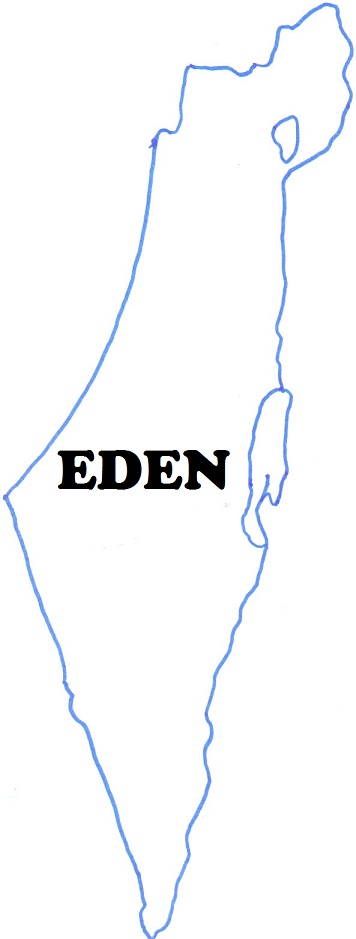
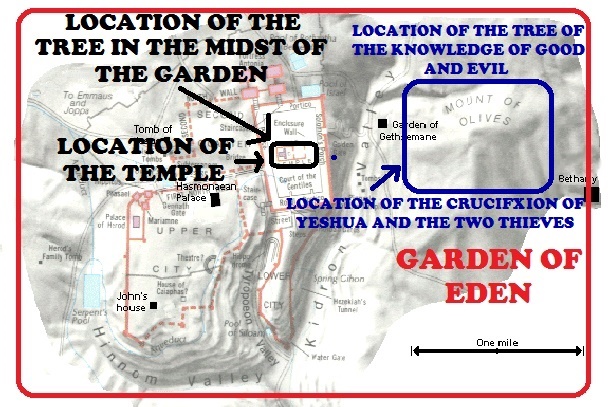
Verse fifteen
15 And the sons of Simeon; Jemuel, and Jamin, and Ohad, and Jachin, and Zohar, and Shaul, son of a Canaanitess (Canaanite woman): These were the families of Simeon.
These are the meaning of each of their names (Note: Strong Concordance numbers will be symbolized by "S"):
SIMEON
Simeon (in Hebrew "Shee-mohn" (Nwems) S8095; 8085): Hearing
Jemuel (in Hebrew "Y'moo-eyl" (laemy) S3223 [3117 + 410]): Day of El
Jamin (in Hebrew "Yah-meen" (Nymy) S3226; 3225): Right hand or side
Ohad (in Hebrew "Oh-hahd" (dha) S161): United, unity
Jachin (in Hebrew "Yah-kheen" (Nyky) S3199; 3559): (He or It) shall establish, erect, set up
Zohar (in Hebrew "Tsoh-khahr" (rxu) S6714; 6713): Whiteness, dazzle, sheen
Shaul (in Hebrew "Shah-ool" (lwas) S7586; 7592): Asked, inquired
Canaanitish woman (in Hebrew "K'nah-ah-neeth" (tynenk) S3669; 3667; 3665): Pedlar, humiliated, subdued, vanquish, bend the knee
Putting the definitions of the names together, it makes a phrase:
"On the day of El, on who is called of the right (hand) shall be erected in dazzling white, and those inquiring Him will bend the knee"
Looking at scriptures related to this story, which are noted in the Gospels of Luke and Matthew
Luke 22:69 Hereafter shall the Son of Man sit on the Right Hand of the Power of hwhy.
Matthew 17:1 And after six days Yeshua taketh Peter, James, and John, his brother, and bringeth them up into an high mountain apart, 2 And was transfigured before them: and His Face did shine as the sun, and His Raiment was white as the light.
Verses sixteen
16 And these were the names of the sons of Levi according by their birthings; Gershon, and Kohath, and Merari: And the years of the life of Levi were seven and thirty and a hundred years.
These are the meaning of each of their names (Note: Strong Concordance numbers will be symbolized by "S"):
LEVI
Levi (in Hebrew "Ley-vee" (ywl) S3878; 3867): Attached
Gershon (in Hebrew "Geyr-shohn" (Nwsrg) S1648; 1644): Refugee, stranger
Kohath (in Hebrew "K'hath" (thq) S6955): To ally oneself, allied
Merari (in Hebrew "M'rah-ree" (yrrm) S4847; 4843): Bitter
Putting the definitions of the names together, it makes a phrase:
"Attached is a stranger who is allied to bitters"
This is what was revealed to me of these two accounts, which is noted the Torah portion of B'shalakh, in the book of Exodus, and which is noted in the Gospel of Matthew
Exodus 15:23 And they came to Marah, and they were not able to drink the waters from Marah, for they were bitters: Upon thus, her name was called Marah. 24 And the People, they murmured upon (over) Moses, to say, What shall we drink? 25 And cried to hwhy; and hwhy showed (pointed out, instructed, made see) him a tree, and was cast (thrown) to the waters, and the waters, they became sweet: There was made for him a Statute and an Ordinance, and there, they were tested (tempted),
Matthew 27:33 And when they were come unto a place called Golgotha, that is to say, a Place of a Skull, 34 They gave Him vinegar to drink mingled with gall: and when He had tasted thereof, He would not drink. 35 And they crucified Him [attached Him to the tree], and parted His Garments, casting lots: that it might be fulfilled which was spoken by the prophet, They parted my garments among them, and upon my vesture did they cast lots. 36 And sitting down they watched Him there; 37 And set up over His Head his accusation written, THIS IS YESHUA THE KING OF THE JEWS.... 45 Now from the sixth hour there was darkness over all the land unto the ninth hour. 46 And about the ninth hour Yeshua cried with a Loud Voice, saying, Eli, Eli, lama sabachthani? that is to say, My El, My El, why hast Thou forsaken Me? [became a stranger to his Father] 47 Some of them that stood there, when they heard that, said, This Man calleth for Elias. 48 And straightway one of them ran, and took a spunge, and filled it with vinegar, and put it on a reed, and gave Him to drink [allied to the bitters].
Continuing with the names of the Levites:
Verse seventeen
17 The sons of Gershon; Libni, and Shimi by their families.
These are the meaning of each of their names (Note: Strong Concordance numbers will be symbolized by "S"):
GERSHON
Gershon (in Hebrew "Geyr-shohn" (Nwsrg) S1648; 1644): Refugee, stranger
Libni (In Hebrew "Leev-nee" (ynbl) S3845; 3835): White
Shimi (In Hebrew "Shee-mee" (yems) S8096; 8088; 8085): Famous, heard
Putting the definitions of the names together, it makes a phrase:
"A refugee who is white and is famously heard"
This can be compared to this account, which is noted in the Gosepel of Matthew
Matthew 17:1 And after six days, Yeshua taketh Peter, James, and John, his brother, and bringeth them up into an high mountain apart, 2 And was transfigured before them: and His Face did shine as the sun, and His Raiment was white as the light.
It can also include the twenty four elders, probably twelve of those are Yeshua's disciples, which is noted in the book of Revelation
Revelation 4:4 And round about the throne were four and twenty seats: and upon the seats I saw four and twenty elders sitting, clothed in white raiment; and they had on their heads crowns of gold.
Verse eighteen
18 And the sons of Kohath; Amram, and Izhar, and Hebron, and Uzziel: And the years of the life of Kohath were three and thirty and a hundred years.
These are the meaning of each of their names (Note: Strong Concordance numbers will be symbolized by "S"):
KOHATH
Kohath (in Hebrew "K'hath" (thq) S6955): To ally oneself, allied
Amram (In Hebrew "Ahm-rahm" (Mrme) S6019 (5971; 6004 + 7311)): Exalted People
Izhar (In Hebrew "Yeets-hahr" (rhuy) S3324; 3323; 6671): Glisten, press out, anointing oil
Hebron (In Hebrew "Khehv-rohn" (Nwrbx) S2275; 2267; 2266: Join, association, society, spell, charmer, enchantment
Uzziel (In Hebrew "Oo-zee-eyl" (layze) S5816 (5797; 5810 + 410; 352; 193)): Strength of El; El is my strength
Putting the definitions of the names together, it makes a phrase:
"An Ally of an exalted people, anointed to be joined to the strength of El"
This is Yeshua, the Messiah, in which messiah means "Annointed One".
Verse nineteen
19 And the sons of Merari; Mahali and Mushi: These were the families of the Levites by their birthings.
These are the meaning of each of their names (Note: Strong Concordance numbers will be symbolized by "S"):
MERARI
Merari (in Hebrew "M'rah-ree" (yrrm) S4847; 4843): Bitter, grieved
Mahli (In Hebrew "Makh-lee" (ylxm) S4249; 2470: Sick, weak, wounded
Mushi (In Hebrew "Moo-shee" (yswm) S4187; 4184): Sensitive, to touch, feel, handle
Putting the definitions of the names together, it makes a phrase:
"Grieved with wounds to the touch"
This is when the suffering Yeshua was crucified at the cross who was marred with the cat of nine tails, shredding His flesh, grieving Him so badly for the sake of His Sheep that are not of this fold in Judea, the Ten Northern Tribes of Israel, who were divorced from Israel, and those who are grafted into the Israel Branch.
Adding this, which is noted in the Gospel of John
John 20:24 But Thomas, one of the twelve, called Didymus, was not with them when Yeshua came. 25 The other disciples therefore said unto him, We have seen the Lord. But he said unto them, Except I shall see in His Hands the Print of the nails, and put my finger into the Print of the nails, and thrust my hand into His Side, I will not believe. 26 And after eight days again His disciples were within, and Thomas with them: then came Yeshua, the doors being shut, and stood in the midst, and said, Peace be unto you. 27 Then saith he to Thomas, Reach hither thy finger, and behold My Hands; and reach hither thy hand, and thrust it into My Side: and be not faithless, but believing. 28 And Thomas answered and said unto Him, My Lord and my Elohim. 29 Yeshua saith unto him, Thomas, because thou hast seen Me, thou hast believed: blessed are they that have not seen, and yet have believed.
Verse twenty
20 And Amram took ta-Jochebed, his aunt, to himself for a woman (wife); and she birthed to him ta-Aaron and ta-Moses: And the years of the life of Amram were seven and thirty and a hundred years.
These are the meaning of each of their names (Note: Strong Concordance numbers will be symbolized by "S"):
AMRAM
Amram (In Hebrew "Ahm-rahm" (Mrme) S6019 (5971; [6004 + 7311]): Exalted People
Jochebed (In Hebrew "Yoh-kheh-vehd" (dbkwy) S3115 (3068; 1961; 1933;/[3050 + 3513]): Yah is Glorified
Aaron (In Hebrew "Ah-hah-rohn" (Nrha) S175; 727; 717): Ark, pluck, gather
Moses (In Hebrew "Moh-shey" (hsm) S4872; 4871): Drawn out
Putting the definitions of the names together, it makes a phrase:
"An exalted people whom Yah is glorified are plucked and drawn out"
Connecting this, which the apostle Paul noted in his letter to the assembly in Thessalonica
1 Thessalonians 4:13 But I would not have you to be ignorant, brethren, concerning them which are asleep, that ye sorrow not, even as others which have no hope. 14 For if we believe that Yeshua died and rose again, even so them also which sleep in Yeshua will the Lord bring with Him. 15 For this we say unto you by the Word of the Lord, that we which are alive and remain unto the coming of the Lord shall not prevent them which are asleep. 16 For the Lord himself shall descend from heaven with a shout, with the voice of the archangel, and with the Trump (Shofar) of hwhy: and the dead in Messiah shall rise first: 17 Then we which are alive and remain shall be caught up together with them in the clouds, to meet the Lord in the air: and so shall we ever be with the Lord . 18 Wherefore comfort one another with these words.
Verse twenty-one
21 And the sons of Izhar; Korah, and the Nepheg, and Zichri.
These are the meaning of each of their names (Note: Strong Concordance numbers will be symbolized by "S"):
IZHAR
Izhar (In Hebrew "Yeets-har" (rhuy) S3324; 3323; 6671): Glisten, press out, anointing oil
Korah (In Hebrew "Koh-rakh" (xrq) S7141; 7139): Depilate (remove hair), make (one) bald
Nepheg (In Hebrew "Neh-phehg" (gpn) S5298): Spring forth, sprout
Zichri (In Hebrew "Zeekh-ree" (yrkz) S2147; 2142): Memorable, remember, recount, record
Putting the definitions of the names together, it makes a phrase:
"Pressed to be removed, but shall spring forth for to be memorialized"
Comparing this to the accounts, which are noted in the Gospels of Mark and Luke, and in the book of the Acts
Mark 16:2 And very early in the first day of the week, they came unto the sepulchre at the rising of the moonlight. 3 And they said among themselves, Who shall roll us away the stone from the door of the sepulchre? 4 And when they looked, they saw that the stone was rolled away: for it was very great. 5 And entering into the sepulchre, they saw a young man sitting on the right side, clothed in a long white garment; and they were affrighted. 6 And he saith unto them, Be not affrighted: Ye seek Yeshua of Nazareth, which was crucified: He is risen; He is not here: behold the place where they laid Him. 7 But go your way, tell his disciples and Peter that He goeth before you into Galilee: there shall ye see Him, as He said unto you.
Luke 24:1 Now upon the first day of the week, very early in the mountain, they came unto the sepulchre, bringing the spices which they had prepared, and certain others with them. 2 And they found the stone rolled away from the sepulchre. 3 And they entered in, and found not the Body of the Lord Yeshua. 4 And it came to pass, as they were much perplexed thereabout, behold, two men stood by them in shining garments: 5 And as they were afraid, and bowed down their faces to the earth, they said unto them, Why seek ye the Living among the dead? 6 He is not here, but is risen: remember how He spake unto you when He was yet in Galilee, 7 Saying, The Son of Man must be delivered into the hands of sinful men, and be crucified, and the third day rise again. 8 And they remembered His Words,
Acts 17:3 Opening and alleging, that Messiah must needs have suffered, and risen again from the dead; and that this Yeshua, whom I preach unto you, is Messiah.
Yeshua's suffering, resurrection, and the memorial of His resurrection. "He is alive".
Verse twenty two
22 And the sons of Uzziel; Mishael, and Elzaphan, and Zithri.
UZZIEL
These are the meaning of each of their names (Note: Strong Concordance numbers will be symbolized by "S"):
Uzziel (In Hebrew "Oo-zee-eyl" (layze)) S5816 (5797; 5810 + 410; 352; 193): Strength of El; El is my strength
Mishael (In Hebrew "Mee-shah-eyl" (lasym) S4332 (4310 + 410; 352; 193)): Who is El; What is El
Elzaphan (In Hebrew "El-tsah-phan" (Npula) S469 (410; 352; 193 + 6845)): El of Treasures; El Treasures; El Reserves; El Stores; El Protects
Zithri (In Hebrew "Seeth-ree" (yrto) S5644; 5643; 5641: Cover, absent, protective
Putting the definitions of the names together, it makes a phrase:
"El is my strength, but who is El? He is El that protects and hides His people by His covering"
This is how is compared, which is noted in the book of Psalms
Psalms 32:7 Thou art my Hiding Place; Thou shalt preserve me from trouble; Thou shalt compass me about with songs of deliverance. Selah.
Psalms 119:114 Thou art my Hiding Place and my Shield: I hope in Thy Word.
Verse twenty three
23 And Aaron took ta-Elisheba, daughter of Amminadab, sister of Nahshon, to himself for a woman (wife); and she birthed to him ta-Nadab, and ta-Abihu, ta-Eleazar, and ta-Ithamar.
These are the meaning of each of their names (Note: Strong Concordance numbers will be symbolized by "S"):
AARON
Aaron (In Hebrew Ah-hah-rohn" (Nrha) S175; 727; 717): Ark, pluck, gather
Elesheba (In Hebrew "Eh-lee-sheh-vah" (ebsyla) S472 (410; 352; 193 + 7651; 7650): My El is an Oath (El Swears)
Aminadab (In Hebrew "Ah-mee-nah-dahv" (bdnyme) S5992 (5971; 6004 + 5068): People of liberty (willingness, free, volunteer)
Nahson (In Hebrew "Nakh-shohn" (Nwsxn)) S5177; 5172): Enchanter, hiss, whisper, spell, observe
Nadab (In Hebrew (Nah-dahv) (bdn) S5070; 5068): Liberal, voluntary, offer freely
Abihu (In Hebrew Ah-vee-hoo" (awhyba) S30 [1 +1931]): Father of Him
Eleazar (In Hebrew "Ehl-ah-zahr" (rzela) S499 (410; 352; 193 + 5826): El is a helper
Ithamar (In Hebrew "Ee-thah-mahr" (rmtya) S385 (339; 183 + 8558): Coast of a palm tree; a coveting palm tree
Putting the definitions of the names together, it makes a phrase:
"An ark, who El sworn is offered freely, observed voluntarily, by the father of Him whose El is a helper like a coveting palm tree"
This ark is Yeshua
John 3:16 For hwhy so loved the world, that He gave His only Begotten Son, that whosoever believeth in Him should not perish, but have Everlasting Life.
Verse twenty four
24 And the sons of Korah; Assir, and Elkanah, and the Abiasaph: These were the families of the Korahites (Korhites).
These are the meaning of each of their names (Note: Strong Concordance numbers will be symbolized by "S"):
KORAH
Korah (In Hebrew "Koh-rakh" (xrq) S7141; 7139): Depilate (remove hair), make (one) bald
Assir (In Hebrew "Ahs-seer" (ryoa) S617; 616; 615; 631): Prisoner, captive, bound
Elkanah (In Hebrew "Ehl-kah-nah" (hnqla) S511 (410; 352; 193 + 7069)): El has obtained (purchase, bought, possess, redeem, recover, attain)
Abiasaph (In Hebrew "Ah-vee-ah-saph" (Poa) S23 (1 + 622): Father of gathering
Putting the definitions of the names together, it makes a phrase:
"Remove hair from a prisoner from what El has purchased by a father of gathering"
This connects to these accounts, which is written in the prophet Isaiah and in the Gospel of Matthew
Isaiah 50:6 I gave My back to the smiters, and My cheeks to them that plucked off the hair:...
Matthew 26:14 Then one of the twelve, called Judas Iscariot, went unto the Chief Priests, 15 And said unto them, What will ye give me, and I will deliver Him unto you? And they covenanted with him for thirty pieces of silver.
Verse twenty five
25 And Eleazar, son of Aaron, took to himself from the daughters of Putiel to himself for a woman (wife); and she birthed to him ta-Phinehas: These were the heads of the fathers of the Levites by their families.
ELEAZAR
These are the meaning of each of their names (Note: Strong Concordance numbers will be symbolized by "S"):
Eleazar (In Hebrew "Ehl-ah-zahr" (rzela) S499 (410; 352; 193 + 5826): El is a helper
Putiel (In Hebrew "Poo-tee-eyl" (layjwp) S6317 (6317 + 410; 352; 193)): Contempt of El (Disparaged of El)
Phinehas (In Hebrew "Peen-khas" (oxnyp) S6372 (6310; 6284 + 5175; 5172)): Mouth of a serpent
Putting the definitions of the names together, it makes a phrase:
"El is a helper, to El who was contempt by the mouth of a serpent"
This connects to this account, which is noted in the Gospsels of Matthew and Mark
Matthew 4:1 Then was Yeshua led up of the Spirit into the wilderness to be tempted of the devil. 2 And when He had fasted forty days and forty nights, He was afterward an hungred. 3 And when the tempter came to Him, he said, If Thou be the Son of Elohim, command that these stones be made bread. 4 But He answered and said, It is written, Man shall not live by bread alone, but by every Word that proceedeth out of the Mouth of hwhy. 5 Then the devil taketh Him up into the Holy City, and setteth Him on a pinnacle of the Temple, 6 And saith unto Him, If Thou be the Son of Elohim, cast Thyself down: for it is written, He shall give His angels charge concerning thee: and in their hands they shall bear thee up, lest at any time thou dash thy foot against a stone. 7 Yeshua said unto him, It is written again, Thou shalt not tempt hwhy, thy Elohim. 8 Again, the devil taketh Him up into an exceeding high mountain, and sheweth Him all the kingdoms of the world, and the glory of them; 9 And saith unto Him, All these things will I give Thee, if Thou wilt fall down and worship me. 10 Then saith Yeshua unto him, Get thee hence, Satan: for it is written, Thou shalt worship hwhy, thy Elohim, and Him only shalt thou serve. 11 Then the devil leaveth Him, and, behold, angels came and ministered unto Him.
Mark 14:55 And the Chief Priests and all the council sought for witness against Yeshua to put Him to death; and found none. 56 For many bare false witness against Him, but their witness agreed not together. 57 And there arose certain, and bare false witness against Him, saying, 58 We heard Him say, I will destroy this Temple that is made with hands, and within three days I will build another made without hands. 59 But neither so did their witness agree together. 60 And the High Priest stood up in the midst, and asked Yeshua, saying, Answerest Thou nothing? What is it which these witness against Thee? 61 But He held His Peace, and answered nothing. Again the High Priest asked Him, and said unto Him, Art Thou the Messiah, the Son of the Blessed? 62 And Yeshua said, I Am: and ye shall see the Son of Man sitting on the Right Hand of Power, and coming in the clouds of the heavens. 63 Then the High Priest rent his clothes, and saith, What need we any further witnesses? 64 Ye have heard the blasphemy: What think ye? And they all condemned Him to be guilty of death.
hwhy helped Yeshua through the tempations and the contempt of those who submitted to the serpent.
Phinehas was the High Priest that took a javelin and killed a Simeonite and a Midianite princess, which is noted in the Torah portions of Balak and Pinkhas, in the book of Numbers
Numbers 25:1 And Israel dwelled in the Shittim, and the People became profaned (polluted) by fornicating to the daughters of Moab. 2 And they called to the People to the sacrifices of their elohim: and the People ate, and they bowed down (prostrated) to their elohim. 3 And Israel was fastened (linked) to Baal Peor: and the Anger of hwhy glowed against Israel. 4 And hwhy said to Moses, Take ta-all of the heads of the People, and hang them to hwhy before (at the front of) the sun, and shall be turned back the Fierce Anger of hwhy from Israel. 5 And Moses said to the Judges of Israel, Kill a man of his men that was fastened (linked) to Baal Peor. 6 And behold, a man from the Sons of Israel came, and brought near to his brothers ta-the Midianitess (Midianite woman) to the eyes of Moses, and to the eyes of all of the Congregation of the Sons of Israel, and they were in weeping (mourning) at the Entrance of the Tent of Appontment. 7 And Phinehas, son of Eleazar, son of Aaron, the Priest, looked (saw), and arose from the midst of the Congregation, and took a spear (javelin, lance) in his hand; 8 and went after the man of Israel to the pavillion (cavity, scooped out area), and stabbed (thrusted) ta-both of them, ta the man of Israel and ta-the woman, to her abdomen. And the pestilence, she was restrained (refrained, withheld) from upon the Sons of Israel. 9 And they were that had died among the pestilence four and twenty thousand.... 14 And the name of the man of Israel that was struck, which was stricken of ta-the Midianitess, was Zimri, son of Salu, ruler of the house of the father to the Simeonites. 15 And the name of the woman that was struck, the Midianitess, was Cozbi, daughter of Zur; he was a head of the mothers of the house of a father in Midian.
Why was Phinehas able to kill humans when he was a Levitical Priest who was not to be involved with killing human beings at all, and what gave him the right to do this? I have heard from a Hebraic roots teacher that Phinehas' mother was a Midianite, but I have a different theory.
Looking at the birth of Phinehas in this Torah verse, his mother was a daughter of Putiel. Who is Putiel?
Looking at the word PUTIEL
The Hebrew word for Putiel is "Poo-tee-eyl"- Peh, Vav, Tet, Yod, Aleph, Lamed (layjwp) is from Strong's Concordance number 6317, and its definition
From an unused root (probably meaning to disparage) and H410; contempt of God; Putiel, an Israelite: - Putiel.
There is no root word, but there is a possible alternate word:
from Strong's Concordance number 6336 "Poo-thee"- Peh, Vav, Tav, Yod (ytwp), and its definition
Patronymic from an unused name meaning a hinge; a Puthite (collectively) or descendant of an unknown Puth. (As if from H6312.): - Puhites [as if from H6312].
from Strong's Concordance number 6312 "poo'ah" or "poov-vah" (hwp or hawp), and its definition
From H6284; a blast; Puah or Puvvah, the name of two Israelites: - Phuvah, Pua, Puah.
from 6284 "pah'ah" (hap), and its definition
A primitive root; to puff, that is, blow away: - scatter into corners.
There is a person named Puah and Phuvvah, and it is noted in the Torah portion of Vay-Yigash, in the book of Genesis, and in the Torah portion of Pinkhas, in the book of Numbers
PHUVAH
Genesis 46:13 And the sons of Issachar; Tola, and Phuvah, and Job, and Shimron.
PUAH
Numbers 26:23 The sons of Issachar by their families: of Tola, the family of the Tolaites: of Pua, the family of the Punites: 24 Of Jashub, the family of the Jashubites: of Shimron, the family of the Shimronites.
As one can see, the names of these four brothers on the information of Phuvah and Puah are similar. In my humble, but strong opinion, it reveals to us that Phinehas' mother was of the tribe of Issachar. Noting this is interesting in itself that there was a intertribal marriage between Phinehas' father, Eliezer, the current High Priest in this time, and his mother, a descendant of Issachar. In other words, Phinehas was not a full fledged Levite. Would this be sufficient enough evidence for him to do what he did as a Levite Priest? It is possible, but that's not all.
Looking further into his heritage in the book of Exodus, this is what the scripture says regarding his tribal founder, Levi, which is noted in this week's Torah portion
Exodus 6:23 And Aaron took ta-Elisheba, daughter of Amminadab, sister of Nahshon, to himself for a woman (wife); and she birthed to him ta-Nadab, and ta-Abihu, ta-Eleazar, and ta-Ithamar.
This is the $64,000 question: "Does it say what tribe Amminadab was from"? The answer is "yes", and it is found in the Torah portion of B'midbar, in the book of Numbers
Numbers 2:3 And the ones encamping eastward at the sunrising shall be the standard (banner, flag) of the Camp of Judah by their armies: and the ruler of the sons of Judah was Nahshon, son of Amminadab.
Phinehas is all the more not a full fledged Levite, but a descendant of Levi AND OF JUDAH!!! This would make Nahshon as Phinehas' great uncle, and it is a very good reason why Phinehas had the privilege to kill Zimri and Cozbi, because he bears the JUDAIC HERITAGE, which could be claimed as a warrior heritage not of the Priestly line. In many ways, that is why hwhy gave him a pass, because part of his heritage was of a NON-LEVITE heritage. I have no doubt that Phinehas' family's was one of many examples of intertribal heritages, and was most likely common practice at the time for the Israeletes when they dwelled in Egypt, before hwhy separated the Levites to be Priests.
This is a pedigree chart of Phinehas, which in my opinion, is a more correct pedigree.
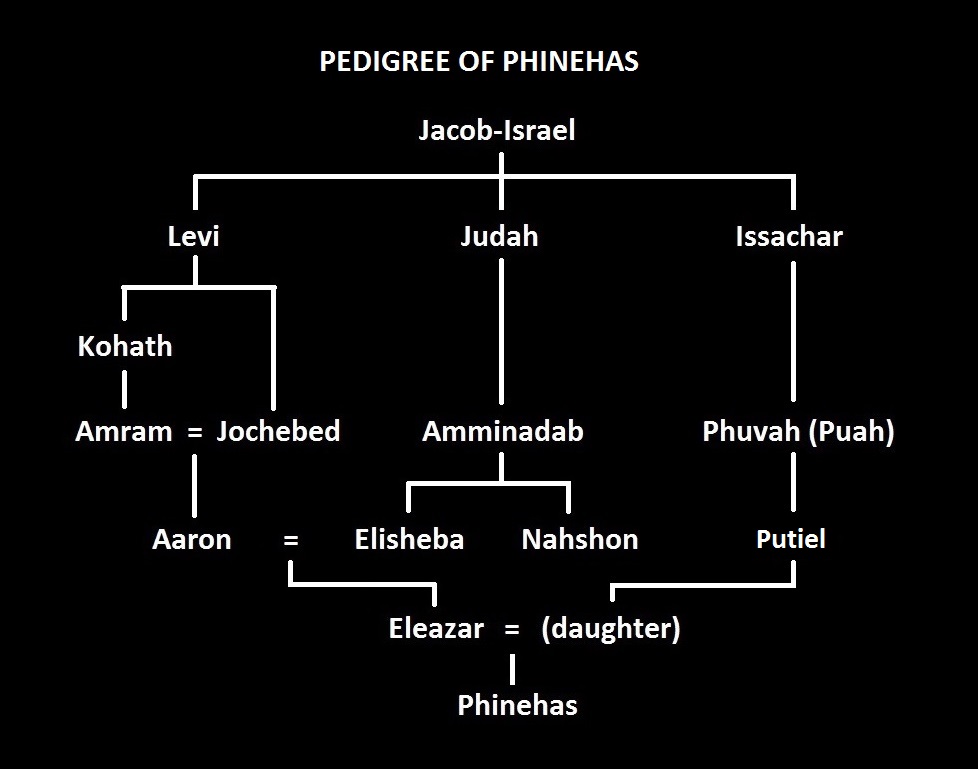
This heritage is fulfilled in the Brith Khadashah (the New Covenant) which I have well established, and Yeshua became the fulfillment to be the descendant of Levi, and as a descendent of Phinehas, as well as of Judah, by his biological mother Mary.
This an abridged pedigree of Yeshua in connection with Phinehas' pedigree
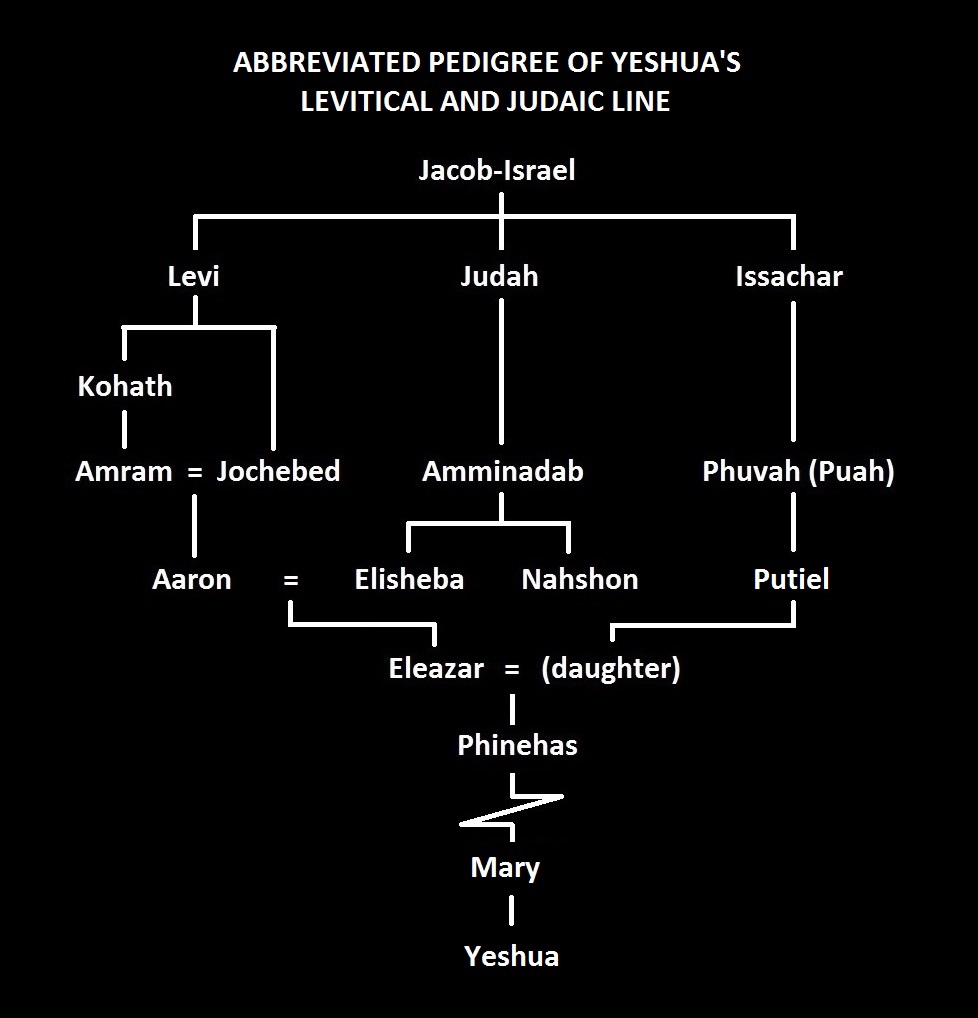
Rico Cortes of Wisdom in Torah Ministries made a teaching titled "Messiah, Priest of War". I do not know if he has this revelation, but his teaching in itself is interesting.
You can watch the teaching on the Yah-Tube channel by clicking on the image below
- - - - - - - - - - - - - - - - - - - - - - - - - - - - - - - - - - - - - - - - - - - - - - - - - - - - - - - - - - - - - - - - - - - - - - - - - - - - - - - - - - - - -
DISCLAIMER
The views and opinions expressed are solely those of the personnel and do not necessarily reflect the view or opinions of The Aleph-Tav Project.
- - - - - - - - - - - - - - - - - - - - - - - - - - - - - - - - - - - - - - - - - - - - - - - - - - - - - - - - - - - - - - - - - - - - - - - - - - - - - - - - - - - - -
RICO CORTES
Messiah, Priest of War
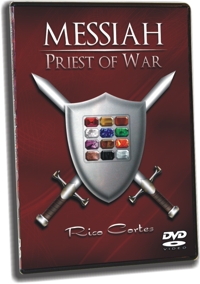
You can download his Slides of this teaching by right clicking the link below and choose "Save as"
Rico Cortes- Messiah, Priest of War.pdf
Questions: "In this week's Torah portion chapter, how come Moses started the genealogy with tribe of Reuben but stopped at Levi and not give the genealogy of rest of the brothers and their descendants?". "Why did Moses end the genealogy with himself and his brother?". "Why didn't Moses just give the genealogy for Levi and his descendants, since Moses was just leading it to himself and his brother, then afterward, picking up where he left off with his encounter with hwhy?" These questions have yet to be answered.
Verses twenty six and twenty seven
26 He was Aaron and Moses which hwhy said to them, Bring out ta-the Sons of Israel from the land of Egypt upon their armies. 27 These were the ones speaking to Pharaoh, King of Egypt, to bring out ta-the Sons of Israel from Egypt: He was Moses and Aaron.
These two verses show how hwhy said the same thing in three different ways. hwhy did this same thing with the creation of Adam of Khavah (Eve), which is noted in the Torah portion of B'reyshith, in the book of Genesis
Genesis 1:27 And Elohim created ta-the Adam in His Image, created him in the Image of Elohim, created them a remembered one (male) and a perforated one (punctured one, female).
This would be the second time hwhy used "a triune statement", as if it was "the Triune Elohim" saying three different statements.
Ephraim Judah of Lion and Lamb Ministries noted that the reason this genealogy was stated, because hwhy wanted us to know that it wasn't another Moses and Aaron, but these two from this genealogy whom faced Pharaoh.
Verses twenty eight through thirty
28 And was, in the day hwhy spoke to Moses in the land of Egypt, 29 And hwhy spoke to Moses, to say, I am hwhy: Speak to Pharaoh, King of Egypt, ta-all which I have spoken to you. 30 And Moses said to the Face hwhy, Behold, I am of uncircumcised lips, and how should Pharaoh listen to me?
hwhy takes us back to where he left us off from verses ten through twelve of this week's Torah portion chapter
Exodus 6:10 And hwhy spoke to Moses, to say, 11 Go, speak to Pharaoh, King of Egypt, and shall send away ta-the Sons of Israel from his land. 12 And Moses spoke to the Face of hwhy, to say, Behold, the Sons of Israel, they did not listen to me; and how should Pharaoh listen to me, and I am of uncircumcised lips?
It is like Jack Parr, who was a talk show host on The Tonight Show from 1957-1962, who preceeded Johnny Carson. He was let go for a while for something he said, and then was returned to the show a few months later. On his first show appearance after his return, he started with the phrase, "As I was saying before I was interrupted".
Looking at the word UNCIRCUMCISED
The Hebrew word for uncircumcised is "ah-reyl"- Ayin, Resh, Lamed (lre). It is from Strong's Concordance number 6189, and its definition
From H6188; properly exposed, that is, projecting loose (as to the prepuce); used only technically uncircumcised (that is, still having the prepuce uncurtailed): - uncircumcised (person).
from 6188 "ah-reyl" (lre), and its definition
A primitive root; properly to strip; but used only as denominative from H6189; to expose or remove the prepuce, whether literally (to go naked) or figuratively (to refrain from using): - count uncircumcised, foreskin to be uncovered.
This is where we the modern English word "oral".
CHAPTER 7
Exodus 7:1-25
Exo 7:1 And hwhy said to Moses, See, I have given you for an elohim to Pharaoh: and Aaron, your brother, shall be your prophet. 2 You, you shall speak ta all which I command you: and Aaron, your brother, shall speak to Pharaoh, and shall send away ta-the Sons of Israel from his land. 3 And I, I will harden ta-the heart of Pharaoh, and I will multiply ta-My Signs and ta-My Miracles (Wonders) in the land of Egypt. 4 And Pharaoh will not listen to you, and I will give ta-My Hand against Egypt, and I will bring out ta-My Armies, ta-My People, the Sons of Israel, from the land of Egypt among Great Punishments (Judgments, Sentences, Executions). 5 And Egypt, they shall know for I am hwhy in My stretching out (stretching forth) ta-My Hand over (upon) Egypt, and I will bring out ta-the Sons of Israel from their midst. 6 And Moses and Aaron did as the which hwhy commanded them, so they did.
7 And Moses was a son of eighty years, and Aaron was a son of three and eighty years, in their speaking to Pharaoh.
8 And hwhy said to Moses and to Aaron, to say, 9 For (When) Pharaoh shall speak to you, to say, Give for yourselves a miracle (wonder): and you shall say to Aaron, Take ta-your staff (rod, branch), and cast (throw) to the face of Pharaoh, and shall be for a snake (land monster, sea monster, sea snake).
10 And Moses and Aaron came to Pharaoh, and they did so as the which hwhy commanded: And Aaron cast down (threw) ta-his staff (rod, branch) to the face of Pharaoh, and to the face of his servants, and became for a snake (sea snake). 11 And Pharaoh also called for the wise men and for the sorcerers (spell whisperers): and the magicians (horoscopists, drawing magicians) of Egypt, they also did in their secret arts (blazing arts?, flaming arts?) thus. 12 And they a man cast (threw) his staff (rod, branch), and they became for snakes (sea snakes): and the staff (rod, branch) of Aaron swallowed ta-their staffs (rods, branches). 13 And the heart of Pharaoh was strengthened, and did not listened to them; as the which hwhy spoke.
14 And hwhy said to Moses, The heart of Pharaoh is heavy, refusing to send away the People. 15 Go to Pharaoh in the breaking period (morning); Behold, will be going out to the water; and you shall stand to meet (encounter) him upon the lip of the Canal (Channel, Nile); and the staff (rod, branch) which changed to a serpent, you shall take in your hand. 16 And you shall say to him, hwhy, Elohim of the Hebrim (Hebrews), sent me to you, to say, Send away ta-My People, and they will serve Me in the wilderness: and behold, you have not listened until here (thus). 17 Thus says hwhy, On this you shall know for I am hwhy: Behold, I will strike on the staff (rod, branch) which is in my hand over (upon) the water which is in the Canal (Channel, Nile), and they shall be changed to blood. 18 And to the fish which is in the Canal (Channel, Nile), she shall be the death [(she shall die)], and the Canal (Channel, Nile) shall stink; and Egypt, they shall loathe (be weary, be disgusted) to imbibe (drink) the water from the Canal (Channel, Nile).
19 And hwhy spoke to Moses, Say to Aaron, Take your staff (rod, branch), and stretch out (stretch forth) your hand over (upon) the waters of Egypt, over (upon) their rivers (streams), over (upon) their canals (channels), and over (upon) their ponds (marshes), and over (upon) all of the pools with thier water, and they shall become blood; and that shall be blood in all of the land of Egypt, and in the trees (wood), and in the stone.
20 And Moses and Aaron, they did so as the which hwhy commanded; and raised up on the staff (rod, branch), and struck ta-the waters which are in the Canal (Channel, Nile) to the eyes of Pharaoh, and to the eyes of his servants; And all of the waters which are in the Canal (Channel, Nile), they changed to blood. 21 And the fish which were in the Canal (Channel, Nile) died of her; and the Canal (Channel, Nile) stank, and Egypt, they were not able to imbibe (drink) the water from the Canal (Channel, Nile); and was the blood in all of the land of Egypt.
22 And the magicians (horoscopists, drawing magicians) of Egypt, they did so in their secret arts (blazing arts?, flaming arts?): and the heart of Pharaoh was strengthened, and did not listen to them; as the which hwhy spoke. 23 And Pharaoh faced away and went to his house, and did not set his heart to this also. 24 And all of Egypt, they dug (delved) all around the Canal (Channel, Nile) at having water to imbibe (drink); for they were not able to imbibe (drink) from the water of the Canal (Channel, Nile). 25 And seven days were fulfilled after hwhy struck [(the striking of hwhy)] the Canal (Channel, Nile).
(NOTE: Not all verses will have comments)
Verse one
1 And hwhy said to Moses, See, I have given you for an elohim to Pharaoh: and Aaron, your brother, shall be your prophet.
This is similar to what hwhy did for Joseph, which is noted in the Torah portion of Vay-Yigash, in the book of Genesis
Genesis 45:8 ...but The Elohim: and has set me for a father to Pharaoh, and for a lord (master) to all of his house, and a ruler in all of the land of Egypt.
One could say, this is when Yeshua said to the People that the Father is in Me and I in My Father. Joseph was a servant to Pharaoh, but at the same time, Joseph was a father figure for him. Moses was a servant unto Pharaoh, because Moses was Hebrew, but at the same time hwhy made him an elohim over Pharaoh. Relating to Moses, this is why Yeshua said to the Jewish People in Jerusalem, which is noted in the Gospel of John
John 10:34 Yeshua answered them, Is it not written in your Torah, I said, Ye are elohim? 35 If He called them elohim, unto whom the Word of hwhy came, and the Scripture cannot be broken; 36 Say ye of Him, whom the Father hath sanctified, and sent into the world, Thou blasphemest; because I said, I am the Son of Elohim? 37 If I do not the Works of My Father, believe Me not. 38 But if I do, though ye believe not Me, believe the Works: that ye may know, and believe, that the Father is in Me, and I in Him.
It was taken from the book of Psalms
Psalms 82:6 I have said, Ye are elohim; you are Sons of the Most High.
Knowing that it was hwhy that positioned the people on the earth, there is an example in the Brith Khadashah (the New Covenant) where hwhy showed that He is in charge, through the words of Yeshua, which is noted in the Gospel of John
John 19:9 And went again into the judgment hall, and saith unto Yeshua, Whence art Thou? But Yeshua gave him no answer. 10 Then saith Pilate unto him, Speakest Thou not unto me? knowest Thou not that I have power to crucify Thee, and have power to release Thee? 11 Yeshua answered, Thou couldest have no power at all against Me, except it were given thee from above....
As hwhy showed that He can put people in high positions, He put Moses above Pharaoh by being an elohim to Pharaoh, which is noted in the book of Job
Job 1:21 And said,...hwhy gave, and hwhy hath taken away;...
Verses two through six
2 You, you shall speak ta all which I command you: and Aaron, your brother, shall speak to Pharaoh, and shall send away ta-the Sons of Israel from his land. 3 And I, I will harden ta-the heart of Pharaoh, and I will multiply ta-My Signs and ta-My Miracles (Wonders) in the land of Egypt. 4 And Pharaoh will not listen to you, and I will give ta-My Hand against Egypt, and I will bring out ta-My Armies, ta-My People, the Sons of Israel, from the land of Egypt among Great Punishments (Judgments, Sentences, Executions). 5 And Egypt, they shall know for I am hwhy in My stretching out (stretching forth) ta-My Hand over (upon) Egypt, and I will bring out ta-the Sons of Israel from their midst. 6 And Moses and Aaron did as the which hwhy commanded them, so they did.
This was the second time that hwhy talked to Moses regarding the future of Pharaoh. This first time was noted in the Torah portion of Sh'moth, in the book of Exodus
Exodus 3:18 ...and you shall come, you and the Elders of Israel, to the king of Egypt, and you shall say to him, hwhy, Elohim of the Hebrim (Hebrews), has befell (happened, bought about) upon us: and now, we will go now at a way of three days in the wilderness, and we will sacrifice to hwhy, our Elohim. 19 And I, I know for the king of Egypt will not give you to go, and not on a Strong Hand. 20 And I will stretch out (send forth) ta-My Hand, and I will strike ta-Egypt in all of My Wonders (Miracles) which I will do in his nearness: and after thus, shall send you away. 21 And I will give this People ta-grace (favor) in the eyes of Egypt: and shall be, when you go, you shall not go empty: 22 And a woman shall ask from her neighbor, and from the sojourner (stranger) in her house, vessels of silver, and vessels of gold, and clothes: and you shall put upon your sons, and upon your daughters; and you shall strip ta-Egypt.
hwhy also spoke to Abraham regarding the future of his descendants who would be in a foreign land for 4oo years and then return to the land, which is noted in the Torah portion of Lekh L'kha, in the book of Genesis
Genesis 15:10 nd took for himself ta-all of these, and chopped (divided) them in the midst, and laid a man of his part by the meeting (encountering, opposite) of his neighbor: and ta-the birds were not chopped (divided). 11 And descended (came down) birds of prey upon the faintish carcases, and Abram dispersed them away. 12 And was at the sun to go down, and a deep sleep (trance, stupor) fell upon Abram; and, behold, a fright (terror) of great darkness fell upon him. 13 And said to Abram, Knowing, you shall know for your seed shall be a sojourner (stranger) in a land not belonging to them, and shall serve them; and they shall afflict them four hundred years; 14 And also ta-the nation, which they shall serve will I judge: and after thus, shall they come out among a great substance (goods, property). 15 And you, you shall go to your fathers in peace; you shall be buried in good (well) satisfaction. 16 And the fourth generation, they shall return here: for the iniquity of the Amorites was not repaid (paid back, complete, whole) until now.
In verse three of this Torah portion passage, we relate to the Torah portion of Sh'moth, in relevance by Mark Biltz of El Shaddai Ministries, when Mark noted the series of Pharaoh's heart. In this case the word does mean harden, which I will reveal.
Looking at the word HARDEN
The Hebrew word for harden is "kah-shah"- Kuph, Shin, Heh (hsq). It is from Strong's Concordance number 7185, and its definition
A primitive root; properly to be dense, that is, tough or severe (in various applications): - be cruel, be fiercer, make grievous, be ([ask a], be in, have, seem, would) hard (-en, [labour], -ly, thing), be sore, (be, make) stiff (-en, [-necked]).
This is the only time that this Hebrew word is applied regarding Pharaoh's heart regarding the plagues. In this case, hwhy purposes to "harden" (or "stiffen" in the King James Version) Pharaoh's heart. We will see later on in this week's Torah portion and the next Torah portion what hwhy does to Pharaoh's heart. We will see Mark Biltz's revelation of Pharaoh's heart through the series of these plagues.
Monte Judah of Lion and Lamb Ministries noted verse five of this week's Torah portion passage where Moses says to Pharaoh
5 And Egypt, they shall know for I am hwhy in My stretching out (stretching forth) ta-My Hand over (upon) Egypt,...
He noted that hwhy was to make Himself known to Pharaoh and Egypt. It is like hwhy was saying to them, "Let Me introduce Myself to you, and you will get to know Me very well in these next days". Monte Judah also noted that hwhy want's us believers to know Him, as well as to know Yeshua, our Messiah, but in a positive way.
Verse seven
7 And Moses was a son of eighty years, and Aaron was a son of three and eighty years, in their speaking to Pharaoh.
Notice hwhy noted Moses and Aaron's ages as a "by the way" statement. Why did hwhy stated their ages here? It is informative, and it does help to configure time lines in Israel's history. Also the apostle Stephen in the book of Acts mentioned Moses age when he met Pharaoh and others.
Acts 7:23 And when he was full forty years old, it came into his heart to visit his brothers the sons of Israel.... 30 And when forty years were expired, there appeared to him in the wilderness of Mount Sinai an angel of hwhy in a flame of fire in a bush.
Moses was forty years old when he killed the Egyptian and fled to Midian, and stayed for forty years until hwhy spoke to him when He was in the presence of the thorn bush. That would have made Aaron around forty three years old at the time.
Take Moses' age of eighty years and subtract that from 215 years the Israelites lived in Egypt, starting with Jacob and his sons. This takes it to 135 years in Egyptian captivity that Moses was born, and that was during the early period, if not the beginning, when Israel was in slavery. Aaron was between forty three and forty four years old, and he was 137 years as noted in the previous chapter of this week's Torah portion
Exodus 6:16 ...And the years of the life of Levi were seven and thirty and a hundred years.
This means that Levi lived another ninety two years until he died giving a difference of forty-three years before before Moses was born.
This is a chart revealing the year of mankind and the age of Moses' relatives when Moses was eighty years old
| YEAR OF MAN WHEN MOSES WAS 80 YEARS OLD | NAME OF MOSES' RELATIVES | AGE OF MOSES' RELATIVES WHEN MOSES WAS 80 YEARS OLD | AGE OF DEATH OF MOSES' RELATIVES |
| 2454 YEARS OF MANKIND | Miriam | about 86 or 87 years old | about 126 or 127 years old |
| 2454 YEARS OF MANKIND | Levi | 83 years old | 123 years old |
Based on past calculations, if the time line is correct, this would take us to about 1546 BC.
By the time that Moses was eighty years old, according to Wikipedia, based on the time line, the Pharaoh who ruled in Egypt was Apepi who ruled from 1575-1540 BC of the Fifteenth Dynasty, in the Second Intermediate Period.
This is what Wikipedia says regarding Apepi:
"Apepi (also Ipepi; Egyptian language ipp(i)) or Apophis (Greek: Ἄποφις; regnal names Neb-khepesh-Re, A-qenen-Re and A-user-Re) was a ruler of Lower Egypt during the fifteenth dynasty and the end of the Second Intermediate Period that was dominated by this foreign dynasty of rulers called the Hyksos. According to the Turin Canon of Kings, he ruled over the northern portion of Egypt for forty years. He ruled during the early half of the 16th century BC and outlived his southern rival, Kamose, but not Ahmose I.[3] Although his reign only entailed northern Egypt, Apepi was dominant over most of Egypt during the early portion of his reign, and traded peacefully with the native Theban Seventeenth dynasty to the south".
This is the only image referring to Apepi
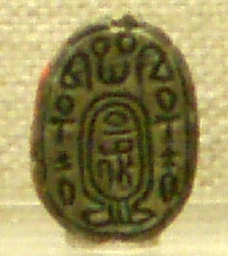
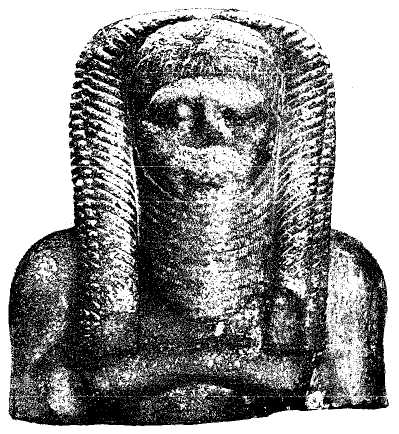
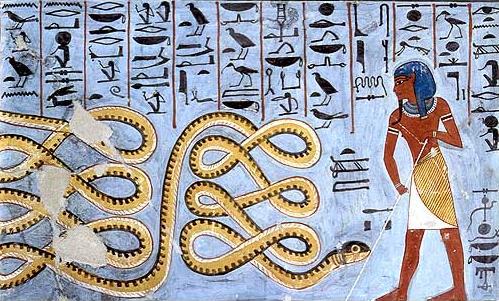

This was the second to the last Pharaoh who reigned in the Fifteenth Dynasty. I will explain about more Pharaohs in next week's Torah portion of Bo.
Verses eight through thirteen
8 And hwhy said to Moses and to Aaron, to say, 9 For (When) Pharaoh shall speak to you, to say, Give for yourselves a miracle (wonder): and you shall say to Aaron, Take ta-your staff (rod, branch), and cast (throw) to the face of Pharaoh, and shall be for a snake (land monster, sea monster, sea snake).
10 And Moses and Aaron came to Pharaoh, and they did so as the which hwhy commanded: And Aaron cast down (threw) ta-his staff (rod, branch) to the face of Pharaoh, and to the face of his servants, and became for a snake (sea snake). 11 And Pharaoh also called for the wise men and for the sorcerers (spell whisperers): and the magicians (horoscopists, drawing magicians) of Egypt, they also did in their secret arts (blazing arts?, flaming arts?) thus. 12 And they a man cast (threw) his staff (rod, branch), and they became for snakes (sea snakes): and the staff (rod, branch) of Aaron swallowed ta-their staffs (rods, branches). 13 And the heart of Pharaoh was strengthened, and did not listened to them; as the which hwhy spoke.
This was nothing new in Yeshua's day. An example was when the Jewish leaders asked for signs, which is written in the Gospel of Matthew
Matthew 12:38 Then certain of the scribes and of the Pharisees answered, saying, Master, we would see a sign from Thee. 39 But He answered and said unto them, An evil and adulterous generation seeketh after a sign; and there shall no sign be given to it, but the sign of the prophet Jonas: 40 For as Jonas was three days and three nights in the whale's belly; so shall the Son of Man be three days and three nights in the heart of the earth.
In this case, Yeshua replied the sign through the word of the Prophet Jonah which Yeshua would fulfill later during His days in the tomb.
Notice that in verse ten of this week's Torah portion passage, it was called "Aaron's staff", but it was really Moses' staff, which is noted in the Torah portion of Sh'moth, in the book of Exodus
Exodus 4:2 And hwhy said to him, What is this in your hand? And said, A staff. 3 And said, Cast (throw, toss) him to the Earth. And casted (threw, tossed) him to the Earth, and became for a snake; and Moses fled from his face.
How did it become Aaron's staff? I don't an answer to that at this time.
Notice also that Aaron's staff as a serpent had swallowed up the magicians' staffs as serpents. The reason the magicians' staffs were swallowed up, because the magicians used their staffs for evil purposes against Israel. Also, all gifts were given by hwhy, and it is up to the people to use it for His Glory. In this case, the magicians used their staffs and the power of their positions for evil purposes. The staffs were to be used for shepherds to lead and guide sheep, but in Egypt, it was considered an abomination to be involved with sheep. Therefore hwhy used Moses'... oh, excuse me, Aaron's staff, that was changed into a serpent, to provoke the magicians to turn theirs into serpents, so that Moses'... uh, Aaron's staff to swallow them up, as a means to take away their rights to be "shepherds" and leaders. Whether they knew it or not, when they bore the possession of the staffs, they were provided the responsibility to be "shepherds". But they were abusing their responsibility to be the shepherds for the "Egyptian flock". In other words, hwhy demoted the magicians from their ranks and stripped them from their powers, and it will be seen later in this week's Torah portion.
Based on this, the magicians would be also considered wolves in sheep's clothing, as mentioned in the Gospel of Matthew
Matthew 7:15 Beware of false prophets, which come to you in sheep's clothing, but inwardly they are ravening wolves.
Yeshua also noted Himself as the Good Shepherd and compares Himself to other shepherds, which is noted in the Gospel of John
John 10:11 I am the Good Shepherd: the Good Shepherd giveth His Life for the Sheep. 12 But he that is an hireling, and not the shepherd, whose own the sheep are not, seeth the wolf coming, and leaveth the sheep, and fleeth: and the wolf catcheth them, and scattereth the sheep. 13 The hireling fleeth, because he is an hireling, and careth not for the sheep. 14 I am the Good Shepherd, and know My Sheep, and am known of Mine. 15 As the Father knoweth Me, even so know I the Father: and I lay down My Life for the Sheep. 16 And other Sheep I have, which are not of this Fold: them also I must bring, and they shall hear My Voice; and there shall be One Fold, and One Shepherd. 17 Therefore doth My Father love Me, because I lay down My Life, that I might take it again. 18 No man taketh it from Me, but I lay it down of Myself. I have power to lay it down, and I have power to take it again. This Commandment have I received of My Father.
Monte Judah of Lion and Lamb Ministries compared the staff of Moses to the cross that Yeshua was placed to be crucified. I can support this based on the account of the copper serpent, which is noted in the Torah portion of Khukath, in the book of Numbers
Numbers 21:8 And hwhy spoke to Moses, Make a burnish one (fiery one) for yourself, and shall put him upon a banner (standard, flag, pole): and shall be anyone that is bitten (struck bitten, stung), and sees him, and shall live. 9 And Moses did (made) a serpent of copper, and set him upon the banner (standard, flag, pole), and was, that if the serpent bit (struck bit, stung) ta-a man, and beheld (intently look, regarded) to the copper serpent, and lived.
The Khukath account of the copper serpent was a type and shadow of Yeshua being hanged on a cross, as Yeshua spoke to Nicodemus, which is noted in the Gospel of John
John 3:1 There was a man of the Pharisees, named Nicodemus, a ruler of the Jews: 2 The same came to Yeshua by night, and said unto Him, Rabbi, we know that Thou art a Teacher come from hwhy: for no man can do these miracles that Thou doest, except hwhy be with Him. 3 Yeshua answered and said unto him, Verily, verily, I say unto thee, Except a man be born again, he cannot see the Kingdom of hwhy. 4 Nicodemus saith unto Him, How can a man be born when he is old? Can he enter the second time into his mother's womb, and be born? 5 Yeshua answered, Verily, verily, I say unto thee, Except a man be born of water and of the Spirit, he cannot enter into the Kingdom of hwhy. 6 That which is born of the flesh is flesh; and that which is born of the Spirit is spirit. 7 Marvel not that I said unto thee, Ye must be born again. 8 The wind bloweth where it listeth, and thou hearest the sound thereof, but canst not tell whence it cometh, and whither it goeth: so is every one that is born of the Spirit. 9 Nicodemus answered and said unto Him, How can these things be? 10 Yeshua answered and said unto him, Art thou a master of Israel, and knowest not these things? 11 Verily, verily, I say unto thee, We speak that we do know, and testify that we have seen; and ye receive not our witness. 12 If I have told you earthly things, and ye believe not, how shall ye believe, if I tell you of heavenly things? 13 And no man hath ascended up to the heavens, but He that came down from the heavens, even the Son of Man which is in the heavens. 14 And as Moses lifted up the serpent in the wilderness, even so must the Son of Man be lifted up: 15 That whosoever believeth in Him should not perish, but have Eternal Life. 16 For hwhy so loved the world, that He gave His Only Begotten Son, that whosoever believeth in Him should not perish, but have Everlasting Life. 17 For hwhy sent not His Son into the world to condemn the world; but that the world through Him might be saved. 18 He that believeth on Him is not condemned: but he that believeth not is condemned already, because he hath not believed in the Name of the Only Begotten Son of hwhy. 19 And this is the condemnation, that Light is come into the world, and men loved darkness rather than Light, because their deeds were evil. 20 For every one that doeth evil hateth the Light, neither cometh to the Light, lest his deeds should be reproved. 21 But he that doeth truth cometh to the Light, that his deeds may be made manifest, that they are wrought in hwhy.
In verses nine, ten and twelve of this week's Torah poirtion chapter, all three places are translated as snakes.
Looking at the word SNAKES
The Hebrew word for snakes is "tah-neen"- Tet, Nun, Yod, Nun Sophit (Nynt). It is from Strong's Concordance number 8577, and its definition
(The second form used in Eze_29:3); intensive from the same as H8565; a marine or land monster, that is, sea serpent or jackal: - dragon, sea-monster, serpent, whale.
Although serpent is one translation from this Hebrew word, it is different compared to another Hebrew word, which will be revealed shortly.
Ephraim Judah of Lion and Lamb Ministries noted that the symbol of Pharaoh's leadership was a serpent, in particular, it is called an Uraeus Cobra. Nevertheless, it is a serpent.
These are the images of the Uraeus Cobra
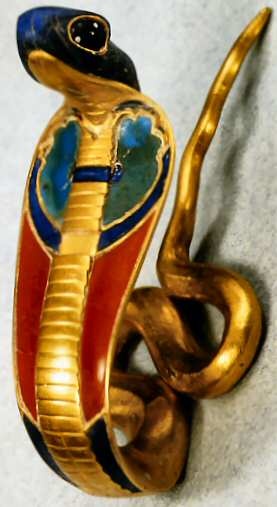
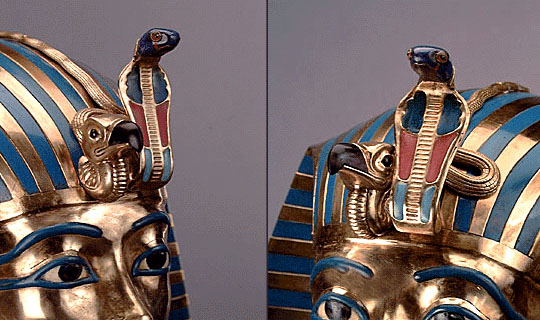
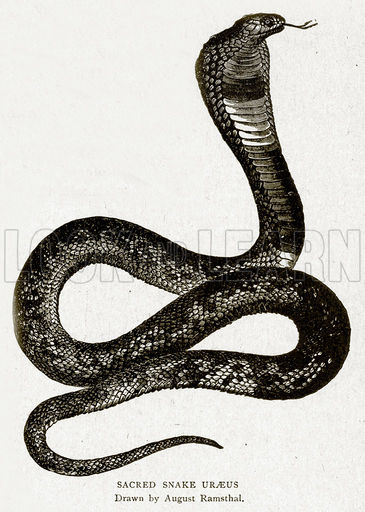
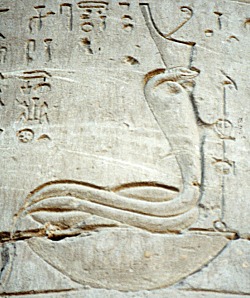
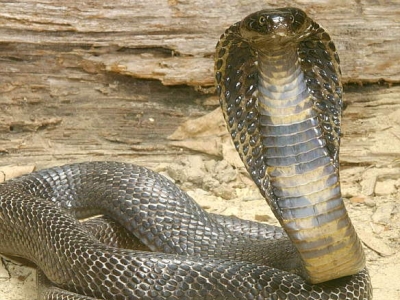
The sorcerers were one of the groups trying to prove against Moses and Aaron that they have the capability to change a staff to a snake, but as noted in this Torah portion passage, Moses' snake (staff) swallowed the sorcerers' snakes (staffs). This symbolically means that Pharaoh's authority (symbol of the Uraeus Cobra) had no power over hwhy (symbol of Aaron's (really Moses') snake). This would also symbolically relate to Yeshua taking away the authority of HaSatan's power on earth when people accept Yeshua as their Messiah. Ephraim Judah also noted that this is not the greatest sign hwhy could have given them, and he's right. As we will see, these signs will grow of greater magnitude as the plagues come about.
Indirectly related, in one account, one sorcerer could not succeed against Paul with the Gospel, which is noted in the book of Acts
Acts 13:4 So they, being sent forth by the Holy Spirit, departed unto Seleucia; and from thence they sailed to Cyprus. 5 And when they were at Salamis, they preached the Word of hwhy in the synagogues of the Jews: and they had also John to their minister. 6 And when they had gone through the isle unto Paphos, they found a certain sorcerer, a false prophet, a Jew, whose name was Barjesus: 7 Which was with the deputy of the country, Sergius Paulus, a prudent man; who called for Barnabas and Saul, and desired to hear the Word of hwhy. 8 But Elymas the sorcerer (for so is his name by interpretation) withstood them, seeking to turn away the deputy from the faith. 9 Then Saul, (who also is called Paul,) filled with the Holy Spirit, set his eyes on him, 10 And said, O full of all subtilty and all mischief, thou child of the devil, thou enemy of all righteousness, wilt thou not cease to pervert the Right Ways of hwhy? 11 And now, behold, the Hand of hwhy is upon thee, and thou shalt be blind, not seeing the sun for a season. And immediately there fell on him a mist and a darkness; and he went about seeking some to lead him by the hand. 12 Then the deputy, when he saw what was done, believed, being astonished at the Doctrine of hwhy.
This sorcerer was Jewish, and because he was trying to turn the deputy away from the faith, Paul took away the Jewish sorcerer's sight, because he refused the Word of hwhy. This could be compared to the sorcerers' staffs being taken away by Aaron's staff, because they were using their staffs for evil purposes, and hwhy took them away from the sorcerers. Thus hwhy took away the sorcerer's authority through the symbol of their staffs.
Another Brith Khadashah (New Covenant) account regarded exorcists who tried to do the same thing as the wise men did with their staffs to Aaron's staff, which is noted in the book of the Acts
Acts 19:13 Then certain of the vagabond Jews, exorcists, took upon them to call over them which had evil spirits the name of Adonai Yeshua, saying, We adjure you by Yeshua whom Paul preacheth. 14 And there were seven sons of one Sceva, a Jew, and Chief of the Priests, which did so. 15 And the evil spirit answered and said, Yeshua I know, and Paul I know; but who are ye? 16 And the man in whom the evil spirit was, leaped on them, and overcame them, and prevailed against them, so that they fled out of that house naked and wounded. 17 And this was known to all the Jews and Greeks also dwelling at Ephesus; and fear fell on them all, and the Name of Adonai Yeshua was magnified.
In this case, these Jewish exorcists tried to match their power with hwhy's Power through the apostle Paul, but they lacked one item.... the Ruakh HaKodesh (the Holy Spirit). Their power failed against the demons and they took on those demons from the guy that originally possessed them because of their evil act.
This account is a redemptive side to those who were practicing sorcery, which is noted in the book of the Acts
Acts 8:9 But there was a certain man, called Simon, which beforetime in the same city used sorcery, and bewitched the people of Samaria, giving out that himself was some great one: 10 To whom they all gave heed, from the least to the greatest, saying, This man is the great power of hwhy. 11 And to him they had regard, because that of long time he had bewitched them with sorceries. 12 But when they believed Philip preaching the things concerning the Kingdom of hwhy, and the name of Yeshua, the Messiah, they were baptized, both men and women. 13 Then Simon himself believed also: and when he was baptized, he continued with Philip, and wondered, beholding the miracles and signs which were done.
Simon the sorcerer did evil, but saw hwhy's True Power of Yeshua, the Messiah, and believed on Him.
Also notice that in verse thirteen of this week's Torah portion passage, Pharaoh's heart became "strengthened", which is the Hebrew word "khazak" (qzx). Mark Biltz of El Shaddai Ministries noted that this is hwhy's act to strengthen Pharaoh's heart to get him started in order for hwhy to fulfill His intentions, which is "the Ten Plagues".
Verse fourteen
14 And hwhy said to Moses, The heart of Pharaoh is heavy, refusing to send away the People.
Noticed hwhy said Pharaoh's heart was "heavy" which is the Hebrew word "kaveyd" (dbk). Why did hwhy say Pharaoh's heart was heavy instead of "strengthened" as was written in the previous verse? Was the purpose of hwhy strengthening Pharaoh's heart was for Pharaoh to harden it? I don't know, but it has possibility.
THE TEN PLAGUES
Verses fifteen through eighteen
THE FIRST PLAGUE
15 Go to Pharaoh in the breaking period (morning); Behold, will be going out to the water; and you shall stand to meet (encounter) him upon the lip of the Canal (Channel, Nile); and the staff (rod, branch) which changed to a serpent, you shall take in your hand. 16 And you shall say to him, hwhy, Elohim of the Hebrim (Hebrews), sent me to you, to say, Send away ta-My People, and they will serve Me in the wilderness: and behold, you have not listened until here (thus). 17 Thus says hwhy, On this you shall know for I am hwhy: Behold, I will strike on the staff (rod, branch) which is in my hand over (upon) the water which is in the Canal (Channel, Nile), and they shall be changed to blood. 18 And to the fish which is in the Canal (Channel, Nile), she shall be the death [(she shall die)], and the Canal (Channel, Nile) shall stink; and Egypt, they shall loathe (be weary, be disgusted) to imbibe (drink) the water from the Canal (Channel, Nile).
hwhy spoke this to Moses during the night. That means the account of the staffs turning into serpents occurred during the same night. Then, Moses was told to see the Pharaoh in the morning at the river Nile. Maybe Pharaoh was going to take a bath.
In verse fifteen of this week's Torah portion passage, it is translated as serpent instead of snake. As noted earlier, looking at verses nine, ten and twelve, the three places where it is translated as snakes in the Hebrew was "taneen".
Looking at the word SERPENT
The Hebrew word for serpent is "nah-khash"- Nun, Khet, Shin (sxn). It is from Strong's Concordance number 5175, and its definition
From H5172; a snake (from its hiss): - serpent.
from 5172 "nah-khash" (sxn), and its definition
A primitive root; properly to hiss, that is, whisper a (magic) spell; generally to prognosticate: - X certainly, divine, enchanter, (use) X enchantment, learn by experience, X indeed, diligently observe.
Notice that hwhy did not tell Moses to say the phrase in an imperialistic and commanding way at first, as Moses said the first time to Pharaoh, which is noted in the Torah portion of Sh'moth, in the book of Exodus
Exodus 5:1 And afterward, Moses and Aaron came, and they said to Pharaoh, Thus says hwhy, Elohim of Israel, Send away ta-My People, and they shall feast to Me in the wilderness.
Moses comes out later and says it in an imperialistic speech in verse seventeen of this week's Torah portion passage
17 Thus says hwhy...
Moses was stating to Pharaoh that Pharaoh will know that this is hwhy doing this, the Elohim that Pharaoh truly never knew. Also, hwhy was saying to Pharaoh through Moses by saying, "I am imperial, and I am in authority of the heavens and the earth, and not you Pharaoh". Moses will continue this "Imperial introduction" to Pharaoh who thinks he is elohim on earth, and Pharaoh will see "the True Living Elohim" through these plagues that will come upon him and Egypt.
Notice also, in verse seventeen of this week's Torah portion passage, Moses said this:
17 ...On this you shall know that I am hwhy:...
This is the beginning of the "know" series in Pharaoh getting to know hwhy, but in a way Pharaoh didn't want to see, as we will see later in this week's Torah portion.
Verse nineteen
19 And hwhy spoke to Moses, Say to Aaron, Take your staff (rod, branch), and stretch out (stretch forth) your hand over (upon) the waters of Egypt, over (upon) their rivers (streams), over (upon) their canals (channels), and over (upon) their ponds (marshes), and over (upon) all of the pools with thier water, and they shall become blood; and that shall be blood in all of the land of Egypt, and in the trees (wood), and in the stone.
Moses played the elohim role to Pharaoh through the example of commanding Aaron to act upon hwhy's Word through Moses.
Notice also that Moses told Aaron to stretch out the staff on all of the water locations in the land of Egypt, which are all of the waters exposed on the surfaces, as well as the stored water in vessels of wood and stone.
Verses twenty and twenty-one
20 And Moses and Aaron, they did so as the which hwhy commanded; and raised up on the staff (rod, branch), and struck ta-the waters which are in the Canal (Channel, Nile) to the eyes of Pharaoh, and to the eyes of his servants; And all of the waters which are in the Canal (Channel, Nile), they changed to blood. 21 And the fish which were in the Canal (Channel, Nile) died of her; and the Canal (Channel, Nile) stank, and Egypt, they were not able to imbibe (drink) the water from the Canal (Channel, Nile); and was the blood in all of the land of Egypt.
Think of all of the rivers, streams, ponds, brooks that had fish in it. I lived near the shore in a town years ago. One summer, there were a lot of dead pogey fish in a cove, and in time, the fish decomposed so much that they stank very heavily, and the scent stretched unto the main road, which was about 1/4 of a mile away from the shore. It lasted for about two weeks. Even the late famous news commentator, Paul Harvey, made a "by the way" statement about the incident, stating to the town's location "...you stink".
This could have been a payback from hwhy for all of the Hebrew baby males that were tossed into the Nile river, which is noted in the Torah portion of Sh'moth, in the book of Exodus
Exodus 1:22 And Pharaoh commanded to all of his people, to say, Any of the son that are birthed, you will cast (send) him to the Canal (Channel, Nile), and any of the daughter you will keep alive.
This plague was also symbolic. The blood used was a type and shadow of the of the judgment of the world, and the fish symbolized the people of the world. Yeshua used this to symbolize that He would destroy the fish of the world, symbolized as "Egypt".
Monte Judah of Lion and Lamb Ministries compared this account to Yeshua's first miracle in Cana, which is noted in the Gospel of John
John 2:1 And the third day there was a marriage in Cana of Galilee; and the mother of Yeshua was there: 2 And both Yeshua was called, and His disciples, to the marriage. 3 And when they wanted wine, the mother of Yeshua saith unto Him, They have no wine. 4 Yeshua saith unto her, Woman, what have I to do with thee? Mine hour is not yet come. 5 His mother saith unto the servants, Whatsoever He saith unto you, do it. 6 And there were set there six waterpots of stone, after the manner of the purifying of the Jews, containing two or three firkins apiece. 7 Yeshua saith unto them, Fill the waterpots with water. And they filled them up to the brim. 8 And He saith unto them, Draw out now, and bear unto the governor of the feast. And they bare it. 9 When the ruler of the feast had tasted the water that was made wine, and knew not whence it was: (but the servants which drew the water knew;) the governor of the feast called the bridegroom, 10 And saith unto him, Every man at the beginning doth set forth good wine; and when men have well drunk, then that which is worse: but thou hast kept the good wine until now. 11 This beginning of miracles did Yeshua in Cana of Galilee, and manifested forth His Glory; and His disciples believed on Him.
hwhy had the power to change the waters to blood in Egypt, and Yeshua changed the water to wine, a type and shadow of Yeshua's Blood. Also, this wedding feast was a type and shadow of "Sukkoth Wedding Feast" for us as believers who are covered in His Blood, and are His Bride who will be with Yeshua, our Bridegroom.
!!!hwhy Kl dbk
Indirectly related, fish was mentioned, which is noted in the Gospel of Matthew
Matthew 14:17 And they say unto him, We have here but five loaves, and two fishes.
In this case, the two fishes were symbols of the two houses of Ten Northern Tribes of Northern Israel and the Two Southern Tribes of Judah.
Peter went through a dejavu with Yeshua, after Yeshua's resurrection, which is noted in the Gospel of John
John 21:9 As soon then as they were come to land, they saw a fire of coals there, and fish laid thereon, and bread. 10 Yeshua saith unto them, Bring of the fish which ye have now caught. 11 Simon Peter went up, and drew the net to land full of great fishes, an hundred and fifty and three: and for all there were so many, yet was not the net broken.
The great fishes that were caught were symbols of the nations, or languges, that the Twelve Tribes of Israel were situated, which are 153 nations, or languages, including those who follow Him and are grafted to the Israelite branch where the Gospel is to be preached.
This account was like a replay from an earlier account, which is noted in the Gospel of Luke
Luke 5:1 And it came to pass, that, as the people pressed upon Him to hear the Word of hwhy, He stood by the Lake of Gennesaret, 2 And saw two ships standing by the lake: but the fishermen were gone out of them, and were washing their nets. 3 And He entered into one of the ships, which was Simon's, and prayed him that he would thrust out a little from the land. And He sat down, and taught the people out of the ship. 4 Now when He had left speaking, He said unto Simon, Launch out into the deep, and let down your nets for a draught. 5 And Simon answering said unto Him, Master, we have toiled all the night, and have taken nothing: nevertheless at Thy Word I will let down the net. 6 And when they had this done, they inclosed a great multitude of fishes: and their net brake. 7 And they beckoned unto their partners, which were in the other ship, that they should come and help them. And they came, and filled both the ships, so that they began to sink. 8 When Simon Peter saw it, he fell down at Yeshua's Knees, saying, Depart from me; for I am a sinful man, O Lord. 9 For he was astonished, and all that were with him, at the draught of the fishes which they had taken: 10 And so was also James, and John, the sons of Zebedee, which were partners with Simon. And Yeshua said unto Simon, Fear not; from henceforth thou shalt catch men.
Yeshua came to fish for disciples to fish for men. In the situation with Pharaoh's case, hwhy was giving Pharaoh a foretaste that He was going to destroy Pharaoh's fish, a symbol of "the fish" who are of the symbolic Egyptian world.
Verses twenty two and twenty three
22 And the magicians (horoscopists, drawing magicians) of Egypt, they did so in their secret arts (blazing arts?, flaming arts?): and the heart of Pharaoh was strengthened, and did not listen to them; as the which hwhy spoke. 23 And Pharaoh faced away and went to his house, and did not set his heart to this also.
The magicians were trying to prove to Pharaoh that they could do this also, and to prove that it was an act that any person could do. But hwhy only gives limited gifts of powers to people, because hwhy knows that mankind can use them for evil intentions, as hwhy mentioned to Noahm whic is noted in the Torah portion of Noakh, in the book of Genesis
Genesis 8:21 ...and hwhy said in His Heart, I will not again (add) to curse ta-the Ground any more against the Adam's sake; for the imagination (conception, form) of the Adam's heart is evil from his youth;...
In verse twenty-one of this week's Torah portion passage, Pharaoh's heart was strengthened, which is the Hebrew word "khazak" (qzx), which, according to Mark Biltz, meant that hwhy strengthened Pharaoh's heart to continue His plague of judgments.
Verses twenty four and twenty five
24 And all of Egypt, they dug (delved) all around the Canal (Channel, Nile) at having water to imbibe (drink); for they were not able to imbibe (drink) from the water of the Canal (Channel, Nile). 25 And seven days were fulfilled after hwhy struck [(the striking of hwhy)] the Canal (Channel, Nile).
This was the last act that occurred during the first plague. Notice that hwhy kept the water underground pure during the time the waters were blood. hwhy showed an act of mercy to the Egyptian people for this first plague.
King David noted of this plague, which is noted in the book of the Psalms
Psalm 105:29 He turned ta-their waters into blood, and slew ta-their fish.
REVELATION'S RELEVANCE TO THE FIRST PLAGUE
Monte Judah of Lion and Lamb Ministries compared the first plague to the plague, which is noted in the book of Revelation
Revelation 8:8 And the second angel sounded, and as it were a great mountain burning with fire was cast into the sea: and the third part of the sea became blood; 9 And the third part of the creatures which were in the sea, and had life, died; and the third part of the ships were destroyed. 10 And the third angel sounded, and there fell a great star from heaven, burning as it were a lamp, and it fell upon the third part of the rivers, and upon the fountains of waters; 11 And the name of the star is called Wormwood: and the third part of the waters became wormwood; and many men died of the waters, because they were made bitter.
Also, there are other accounts in which the blood is applied for the judgment in the end times, which are noted in the apostle John's book of Revelation
Revelation 11:6 They have the power to shut the sky, that no rain may fall during the days of their prophesying, and they have power over the waters to turn them into blood and to strike the earth with every kind of plague, as often as they desire.
Revelation 16:3 The second angel poured out his bowl into the sea, and it became like the blood of a corpse, and every living thing died that was in the sea.
Revelation 16:4 The third angel poured out his bowl into the rivers and the springs of water, and they became blood.
THE EGYPTIAN eLOHIM RELATING TO THE FIRST PLAGUE
The Egyptian deity related to this plague is "Hatmehyt". According to the Tour Egypt website, The fish goddess is called Hatmehyt. This is what it says regarding Hatmehyt:
"The fish as a divinity is comparatively rare in the Egyptian pantheon, but Hatmehyt's name means "she who is in front of the fishes" referring to her pre-eminence in relation to the few rival fish cults. However, it could also be interpreted in a temporal sense to stress the goddess as the "beginning" i.e. earliest fish-goddess to exist when Egypt emerged from the primeval waters.
She can be represented completely as a fish, the shape of which led to former suggestions that it was a dolphin. This has now been discarded in favor of an identification with the lepidotus fish, common in the Nile.
At Mendes, in a district for which the ancient standard was the fish symbol indicating that Hatmehyt was the senior deity in terms of residence there, her cult becomes subordinated to that of the ram-god Banebdjedet - interpreted after his arrival as her consort."
According to God Checker website, it is also called "Hat-Mehit", "Het-mehit" and "Hetmehit".These are images of the Egyptian elohim Hatmehyt
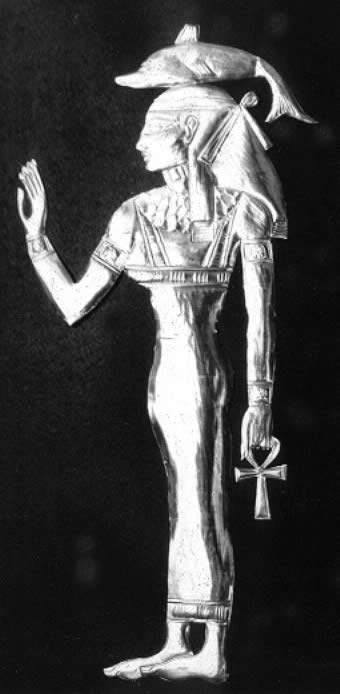
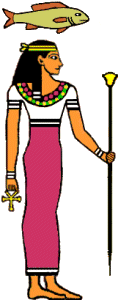
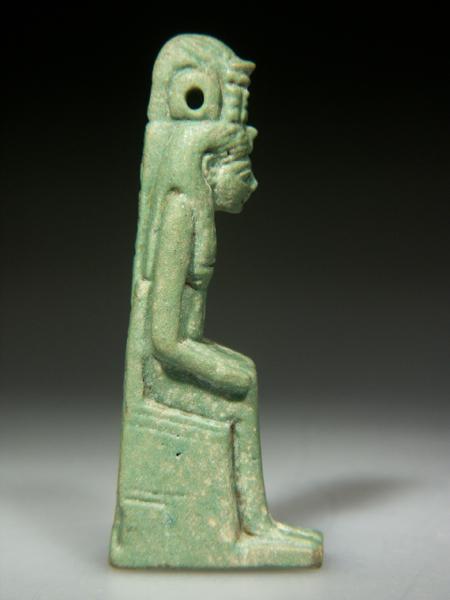
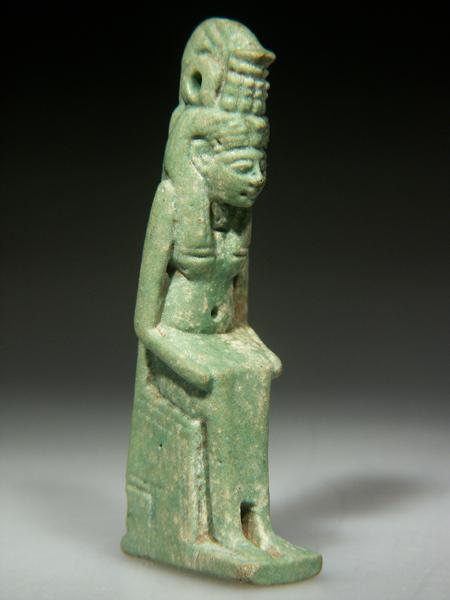
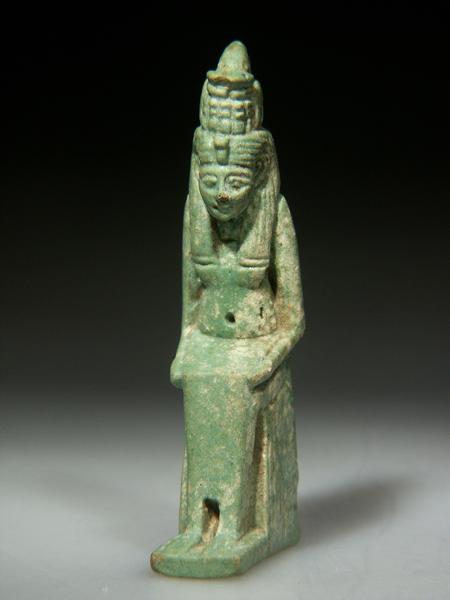
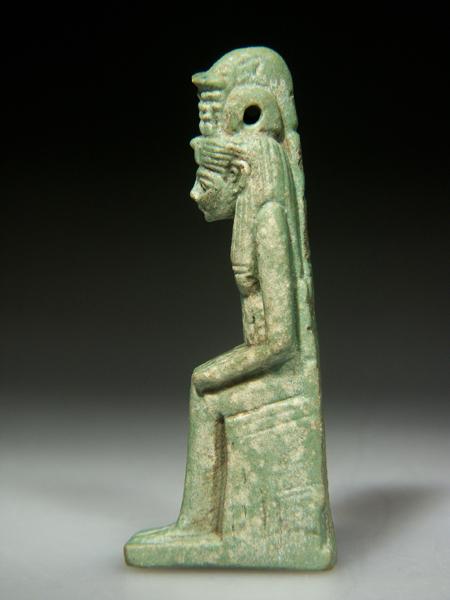
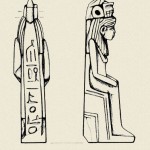
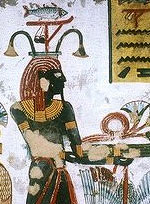
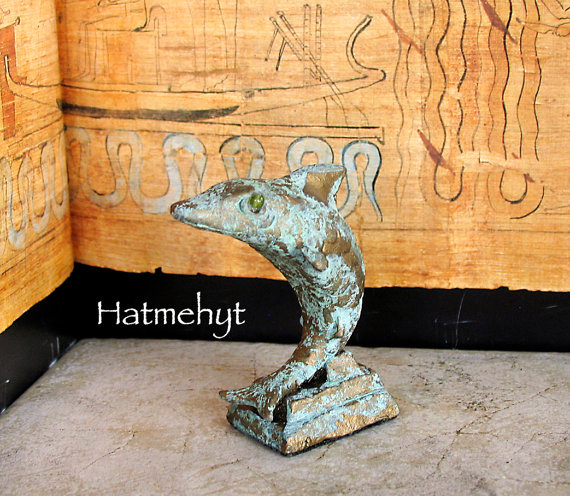
CHAPTER 8
Exodus 8:1-32
(7:26-29; 8:1-28 in the Hebrew)
Exo 8:1 And hwhy said to Moses, Go to Pharaoh, and you shall say to him, Thus says hwhy, Send away ta-My People, and may serve Me. 2 And if you refuse to send away, behold, I will plague (smite) all of your border among frogs. 3 And the Canal (Channel, Nile) shall swarm frogs, and they will ascend, and they shall come in your house, and in your private chamber (parlor), in your bed chamber, and upon your bed, and in the houses of your servants, and on your people, and in your fire pots (furnaces, ovens), and in your kneading troughs. 4 And the frogs, they shall ascend on you, and on your people, and on all of your servants.
5 And hwhy said to Moses, Say to Aaron, Stretch out (Stretch forth) ta-your hand on your staff (rod, branch) over (upon) the rivers (streams), over (upon) the canals (channels), and over (upon) the marshes (ponds), and shall be the ascending of ta-the frogs over (upon) the land of Egypt. 6 And Aaron stretched out (stretched forth) ta-his hand over (upon) the waters of Egypt, and the frogs, she ascended, and she concealed (covered) ta-the land of Egypt. 7 And the magicians (horoscopists, drawing magicians), they did so in their secret arts (blazing arts?, flaming arts?), and ta-the frogs, they ascended over (upon) the land of Egypt.
8 And Pharaoh called Moses and Aaron and said, Entreat (Intercede) to hwhy, and remove the frogs from me and from my people, and I will send her away ta-the People, and they will sacrifice to hwhy. 9 And Moses said to Pharaoh, Glorying (Boasting) upon (over) me? For when shall I intercede (entreat) for you, and for your servants, and for your people, to cut off the frogs from you and from your house, only in the Canal (Channel, Nile) she shall remain? 10 And said, By tomorrow. And said, According to [(As)] your word, by that, you may know for no one is like hwhy, our Elohim. 11 And the frogs shall be removed (turned away, departed) from you, and from your house, and from your servants, and from your people. Only they shall remain in the Canal (Channel, Nile).
12 And Moses and Aaron went out from with Pharaoh, and Moses cried to hwhy over (upon) the word of the frogs, which was set (put) to Pharaoh. 13 And hwhy did according to [(as)] the word of Moses. And the frogs, they died from the houses, from the courtyards, and from the fields. 14 And they laid them up of homers, of homers, and the land, she stank. 15 And Pharaoh saw for there was relief (spirit), and ta-his heart was made heavy and did not listen to them as the which hwhy spoke.
16 And hwhy said to Moses, Say to Aaron, Stretch out (Stretch forth) ta-your staff (rod, branch) and strike ta-the dust of the Earth, and shall become for gnats (lice) in all the land of Egypt. 17 And they did so, and Aaron stretched out (stretched forth) ta-his hand on his staff (rod, branch) and struck ta-the dust of the Earth, and the gnats (lice), she was on the Adam and on the animals. All of the dust of the Earth became gnats (lice) in all of the land of Egypt. 18 And the magicians (horoscopists, drawing magicians), they did so in their secret arts (blazing arts?, flaming arts?) to bring out ta-the gnats (lice), and they were not able. And the gnats (lice), she was on the Adam and on the animals. 19 And the magicians (horoscopists, drawing magicians), they said to Pharaoh, She is the Finger of Elohim. And the heart of Pharaoh was strengthened, and did not listen to them as the which hwhy spoke.
20 And hwhy said to Moses, Arise early (Wake up, Load up, Start up) in the breaking period (morning) and you shall stand to the face of Pharaoh. Behold, is going out to the water, and you shall say to him, Thus says hwhy, Send away My People, and they may serve Me. 21 For if you do not with sending [(not send)] away ta-My People, behold I will with sending [(will send)] ta-the flies (swarms, intermixing) on you, and on your servants, and on your people, and on your houses: and the flies (swarms, intermixing) they will fill the houses of Egypt, and also the Ground which they are upon (over) her. 22 And in that day, I will separate (distinguish, set apart) ta-the land of Goshen which My People are standing upon her, for she shall to fail having flies , intermixing) there, by that, you may know for I am hwhy in the nearness of the Earth. 23 And I will put a distinction (difference, redemptive distinguishing, redemptive difference) between My People and between your people. By tomorrow this Sign shall be. 24 And hwhy did so. And came a heaviness of flies (swarms, intermixing) to the house of Pharaoh and the house of his servants. And in all of the land of Egypt, the land, she was ruined (wasted) from the face of the flies (swarms, intermixing).
25 And Pharaoh called to Moses and to Aaron and said, Go sacrifice to your Elohim in the land! 26 And Moses said, Is not established to do so. For our sacrificing to hwhy, our Elohim, is an abomination (a disgust, a detestable, an abhorrence) of Egypt. Behold, we be sacrificing ta-an abomination (a disgust, a detestable, an abhorrence) of Egypt to their eyes, will they not skullstone (stone) us? 27 We will go a way of three days in the wilderness, and will sacrifice to hwhy, our Elohim, as the which shall say to us. 28 And Pharaoh said, I, I will send you away, and you will sacrifice to hwhy, your Elohim, in the wilderness; only that farring, you will not to go far. Intercede (Entreat) on unto me. 29 And Moses said, Behold, I am going out from with you, and I will intercede (entreat) to hwhy, and tomorrow, the flies (swarms, intermixing) shall be removed [(shall depart, shall turn away)] from Pharaoh, from his servants, and from his people. Only Pharaoh, do not add (continue) deception by failing at sending away ta-the People to sacrifice to hwhy.
30 And Moses went out from with Pharaoh and interceded (entreated) to hwhy. 31 And hwhy did according to [(as)] the word of Moses, and removed (departed, turned away) the flies (swarms, intermixing) from Pharaoh, from his servants, and from his people; Not one remained. 32 And Pharaoh made ta-his heart heavy in this time also, and did not send away ta-the People.
(NOTE: Not all verses will have comments)
Verses one through four
Continuing with the ten plagues:
THE SECOND PLAGUE
1 And hwhy said to Moses, Go to Pharaoh, and you shall say to him, Thus says hwhy, Send away ta-My People, and may serve Me. 2 And if you refuse to send away, behold, I will plague (smite) all of your border among frogs. 3 And the Canal (Channel, Nile) shall swarm frogs, and they will ascend, and they shall come in your house, and in your private chamber (parlor), in your bed chamber, and upon your bed, and in the houses of your servants, and on your people, and in your fire pots (furnaces, ovens), and in your kneading troughs. 4 And the frogs, they shall ascend on you, and on your people, and on all of your servants.
Moses used the same command that he and Aaron said to Pharaoh to send away hwhy's People that they said to Pharaoh at first, which is noted in the Torah portion of Sh'moth, in the book of Exodus
Exodus 5:1 And afterward, Moses and Aaron went in, and said to Pharaoh, Thus says hwhy, Elohim of Israel, Send away ta-My People, and they shall feast to Me in the wilderness.
Verses five and six
5 And hwhy said to Moses, Say to Aaron, Stretch out (Stretch forth) ta-your hand on your staff (rod, branch) over (upon) the rivers (streams), over (upon) the canals (channels), and over (upon) the marshes (ponds), and shall be the ascending of ta-the frogs over (upon) the land of Egypt. 6 And Aaron stretched out (stretched forth) ta-his hand over (upon) the waters of Egypt, and the frogs, she ascended, and she concealed (covered) ta-the land of Egypt.
Notice that Aaron was "not" commanded to strike the waters like the Commandment on the first plague, which is noted in the previous chapter of this week's Torah portion
Exodus 7:20 And Moses and Aaron, they did so as the which hwhy commanded; and raised up on the staff (rod, branch), and struck ta-the waters which are in the Canal (Channel, Nile) to the eyes of Pharaoh, and to the eyes of his servants; And all of the waters which are in the Canal (Channel, Nile), they changed to blood.
Also notice that there was one part of the waters missing in this week's Torah portion passage: the pools
Exodus 7:19 19 And hwhy spoke to Moses, Say to Aaron, Take your staff (rod, branch), and stretch out (stretch forth) your hand over (upon) the waters of Egypt, over (upon) their rivers (streams), over (upon) their canals (channels), and over (upon) their ponds (marshes), and over (upon) all of the pools with thier water, and they shall become blood; and that shall be blood in all of the land of Egypt, and in the trees (wood), and in the stone.
Why were they not including in this plague? I don't have an answer to that at this time.
Verse seven
7 And the magicians (horoscopists, drawing magicians), they did so in their secret arts (blazing arts?, flaming arts?), and ta-the frogs, they ascended over (upon) the land of Egypt.
The magicians also proved that they could do it, revealing that hwhy gave mankind this kind of limited gift of power, but as I noted earlier, hwhy limited man's power on account on the evilness of their hearts.
A question came to me, "Is there a food chain from fish to frogs, or a food chain from frogs to fish"? On the Answers website, at www.answers.com, which the question "Do fish eat frogs?", a person nicknamed Hatman621 answered this question:
"Yes, Fish do eat frogs. Bass in particular prefer frogs to most other prey, second only to crayfish. And bullfrogs eat fish, too".
Also, on the Ask website, at www.ask.com, a question was asked "Do frogs eat fish"? Their answer was posted
"Frogs eat any live fish that is small enough to fit into their mouths. Many pet frogs are content to eat guppies, minnows and goldfish of the appropriate size".
These answers reveal to us that the fish and the frogs depend upon each other in the food chain. When the first plague occurred, all of the fish died. There were no fish to eat the frogs, and there were no baby fish for the frogs to eat. What remained were "the frogs", and there were plenty of them for hwhy to use.Verses eight through eleven
8 And Pharaoh called Moses and Aaron and said, Entreat (Intercede) to hwhy, and remove the frogs from me and from my people, and I will send her away ta-the People, and they will sacrifice to hwhy. 9 And Moses said to Pharaoh, Glorying (Boasting) upon (over) me? For when shall I intercede (entreat) for you, and for your servants, and for your people, to cut off the frogs from you and from your house, only in the Canal (Channel, Nile) she shall remain? 10 And said, By tomorrow. And said, According to [(As)] your word, by that, you may know for no one is like hwhy, our Elohim. 11 And the frogs shall be removed (turned away, departed) from you, and from your house, and from your servants, and from your people. Only they shall remain in the Canal (Channel, Nile).
Notice that Pharaoh did not say to Moses "Ok, Moses, do as hwhy told you to do", but said "Pray to hwhy to remove the frogs...". Also, this is the first time that Moses put Pharaoh in the responsive end by asking him what time Pharaoh wants Moses to remove the frogs.
Looking at verse nine of this week's Torah portion passage, Moses said to Pharaoh, "Boasting over me?". In other words, Moses was saying to him, "You, Pharaoh, Rah on earth, looking to me, a simple Hebrew shepherd, for help?".
Notice that in verses nine and eleven of this week's Torah portion passage that Moses said in the order of the removal of the frogs started with Pharaoh himself, then his house, then his servants, and then the people. Normally in a war, you conventionally attack the soldiers at large, then get to the leaders, but in Moses order, he starts with the king. In comparison, on a PBS Documentary titled "Richard I Lionheart and Saladin, Holy Warriors", Richard I "Lionheart", King of England (1189-1199), during the Crusades in the Middle East, Richard I broke the traditional way of war by placing himself in the front his army instead of staying behind.
Notice also that in verse ten of this week's Torah portion passage, Moses said:
10 ...by that, you may know for no one is like hwhy, our Elohim.
This is the second time that Moses noted Pharaoh that he will "know" hwhy, but in a negative way.
Verses twelve through fifteen
12 And Moses and Aaron went out from with Pharaoh, and Moses cried to hwhy over (upon) the word of the frogs, which was set (put) to Pharaoh. 13 And hwhy did according to [(as)] the word of Moses. And the frogs, they died from the houses, from the courtyards, and from the fields. 14 And they laid them up of homers, of homers, and the land, she stank. 15 And Pharaoh saw for there was relief (spirit), and ta-his heart was made heavy and did not listen to them as the which hwhy spoke.
Notice that Moses did not tell Pharaoh that the frogs would not be taken away from them.
King David recalled this plague, which is noted in the book of the Psalms
Psalms 105:30 Their land brought forth frogs in abundance, in the chambers of their kings.
In verse fifteen of this week's Torah portion passage, Pharaoh's heart was heavy ("kavahd" (dbk)) which Mark Biltz of El Shaddai Ministries noted that it was Pharaoh's own doing to the act of his heart.
REVELATION'S RELEVANCE TO THE SECOND PLAGUE
This plague can be compared to this account, which is noted in the apostle John's book of Revelation
Revelation 16:12 And the sixth angel poured out his vial upon the great river Euphrates; and the water thereof was dried up, that the way of the kings of the east might be prepared. 13 And I saw three unclean spirits like frogs come out of the mouth of the dragon, and out of the mouth of the beast, and out of the mouth of the false prophet. 14 For they are the spirits of devils, working miracles, which go forth unto the kings of the earth and of the whole world, to gather them to the battle of that great day of hwhy Almighty. 15 Behold, I come as a thief. Blessed is he that watcheth, and keepeth his garments, lest he walk naked, and they see his shame. 16 And he gathered them together into a place called in the Hebrew tongue Armageddon.
THE EGYPTIAN eLOHIM RELATING TO THE SECOND PLAGUE
The Egyptian deity relating to this plague is "Heqet". On the Tour Egypt website, Caroline Seawright wrote an article on the frog god titled "Heqet, Frog Headed Goddess of Childbirth, A Feature Tour Egypt Story". This is what she wrote:
"Heqet (Heket) was a goddess of childbirth, creation and grain germination. She was depicted as a frog, or a woman with the head of a frog, betraying her connection with water. As a water goddess, she was also a goddess of fertility where she was particularly associated with the later stages of labour. In this way, the title of "Servants of Heqet" may have been a title applied to her priestesses who were trained as midwives."
These are images of the Egyptian god Heqet
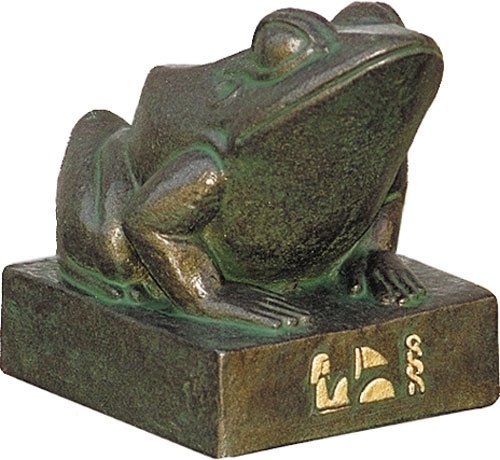
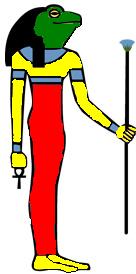
In this display Heqet gives life to the boy on Khnum's pottery wheel
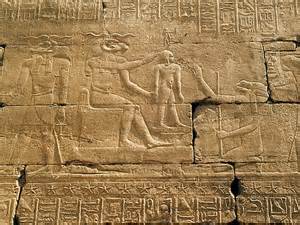
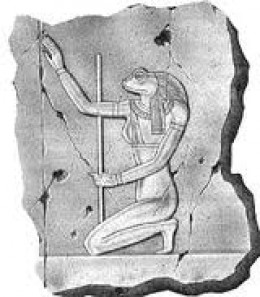
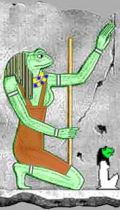
Verses sixteen through nineteen
THE THIRD PLAGUE
16 And hwhy said to Moses, Say to Aaron, Stretch out (Stretch forth) ta-your staff (rod, branch) and strike ta-the dust of the Earth, and shall become for gnats (lice) in all the land of Egypt. 17 And they did so, and Aaron stretched out (stretched forth) ta-his hand on his staff (rod, branch) and struck ta-the dust of the Earth, and the gnats (lice), she was on the Adam and on the animals. All of the dust of the Earth became gnats (lice) in all of the land of Egypt. 18 And the magicians (horoscopists, drawing magicians), they did so in their secret arts (blazing arts?, flaming arts?) to bring out ta-the gnats (lice), and they were not able. And the gnats (lice), she was on the Adam and on the animals. 19 And the magicians (horoscopists, drawing magicians), they said to Pharaoh, She is the Finger of Elohim. And the heart of Pharaoh was strengthened, and did not listen to them as the which hwhy spoke.
Gnats are also known to be lice. Notice in this third plague that the magicians could not produce this act to bring forth lice, and accepted the fact that it was hwhy in charge of the plague, and not them. In chapter two of this week's Torah portion, when Moses' staff swallowed up the magicians' staffs, hwhy took away the magicians' position and power. This became manifested in this third plague.
King David noted this plague, which is noted in the book of the Psalms
Psalm 105:31 He spake, and there came divers sorts of flies, and lice in all their coasts.
Indirectly related, Yeshua used this plague in his woes against the Scribes Pharisees, which is noted in the Gospel of Matthew
Matthew 23:24 Ye blind guides, which strain at a gnat, and swallow a camel.
Yeshua spoke of the gnat as a symbol for the Phraisees' doctrine, because their made-up doctrines were so micro, that they would attach to themselves. Also their overall man-made false torahs became as macro as a camel, the symbol Yeshua also stated above, because their torah was "non-kosher", hence, the "unkosher camel".
Mark Biltz of El Shaddai Ministries noted that Yeshua noted the Finger of Elohim in a positive means when He casted out devils, which is noted in the Gospel of Luke
Luke 11:14 And He was casting out a devil, and it was dumb. And it came to pass, when the devil was gone out, the dumb spake; and the People wondered. 15 But some of them said, He casteth out devils through Beelzebub, the chief of the devils. 16 And others, tempting Him, sought of Him a sign from the heavens. 17 But He, knowing their thoughts, said unto them, Every kingdom divided against itself is brought to desolation; and a house divided against a house falleth. 18 If Satan also be divided against himself, how shall his kingdom stand? Because ye say that I cast out devils through Beelzebub. 19 And if I by Beelzebub cast out devils, by whom do your sons cast them out? Therefore shall they be your judges. 20 But if I with the Finger of hwhy cast out devils, no doubt the Kingdom of hwhy is come upon you. 21 When a strong man armed keepeth his palace, his goods are in peace: 22 But when a stronger than he shall come upon him, and overcome him, he taketh from him all his armour wherein he trusted, and divideth his spoils.
Also, Mark Biltz noted that the strong man mentioned in the Gospel of Luke mentioned above is comparable to Pharaoh when hwhy is stronger than Pharaoh and will take the spoils of Egypt, as we will see in next week's Torah portion.
In verse nineteen of this week's Torah portion, Pharaoh's heart was strengthened ("khazak" (qzx)), by hwhy to keep him going.
THE EGYPTIAN eLOHIM RELATING TO THE THIRD PLAGUE
The Egyptian deity that was associated with this plague is "Geb".
This information about Geb is taken from the SSC Hot Springs website, and this is what is says:
"Geb (another god) was thought to represent the earth. He is pictured as reclining beneath the sky-goddess Nut. Geb, ‘the Great Cackler’, was represented as a goose. He was said to have laid the egg from which the sun was hatched. Instead of the sky and the earth laying an egg representing the sun, the dust of the earth brought forth lice, which would in turn lay louse eggs on the Egyptians. They were big on being clean. Body lice don’t go along with being clean. They certainly don’t render priests clean".
This is what Wikipedia says regarding Geb:
The name was
pronounced as such from the Greek period onward and was formerly
erroneously read as Seb or as Keb. The original
Egyptian was perhaps "Gebeb"/"Kebeb".
These are images
of Geb, shown below with the Egyptian goddess Nut
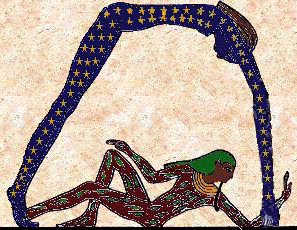
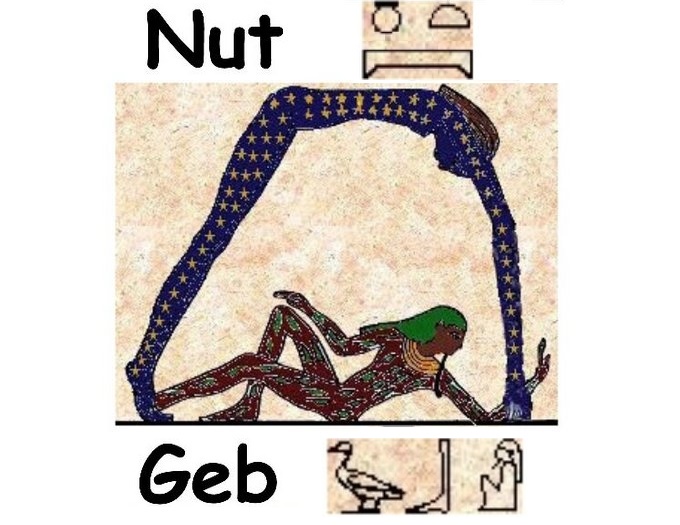
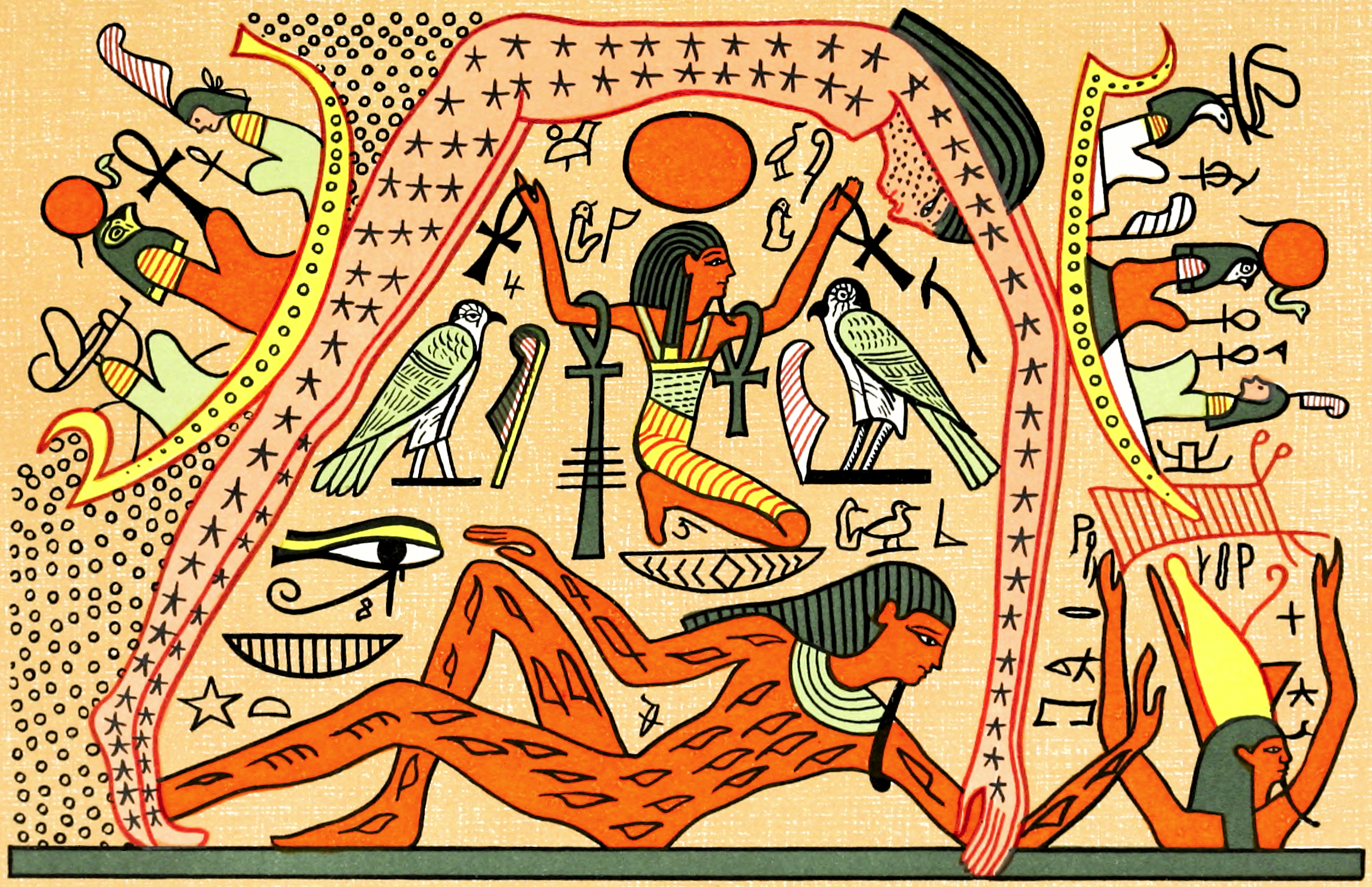
These are images of Geb
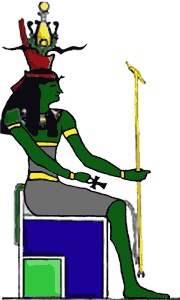

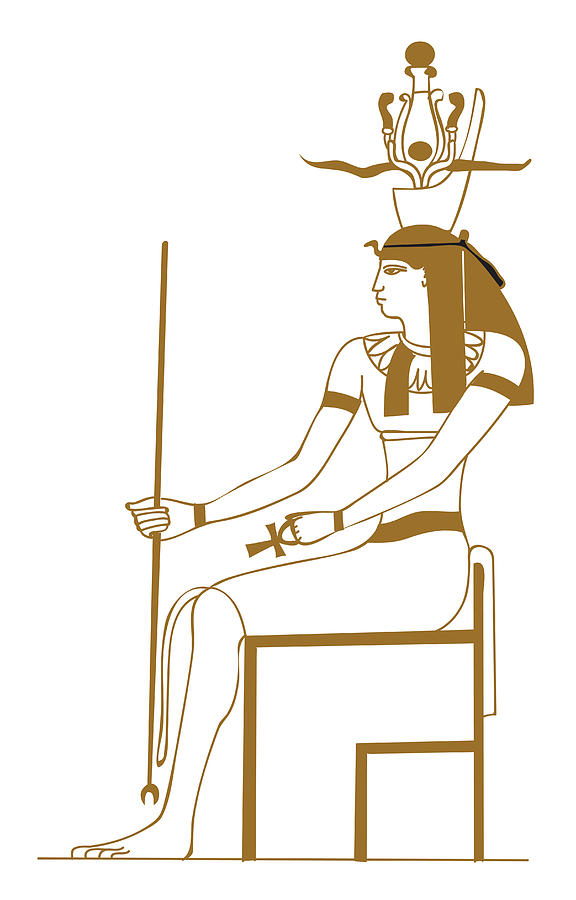
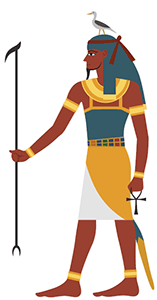
This is a stele of Geb (left) with Horus (right)
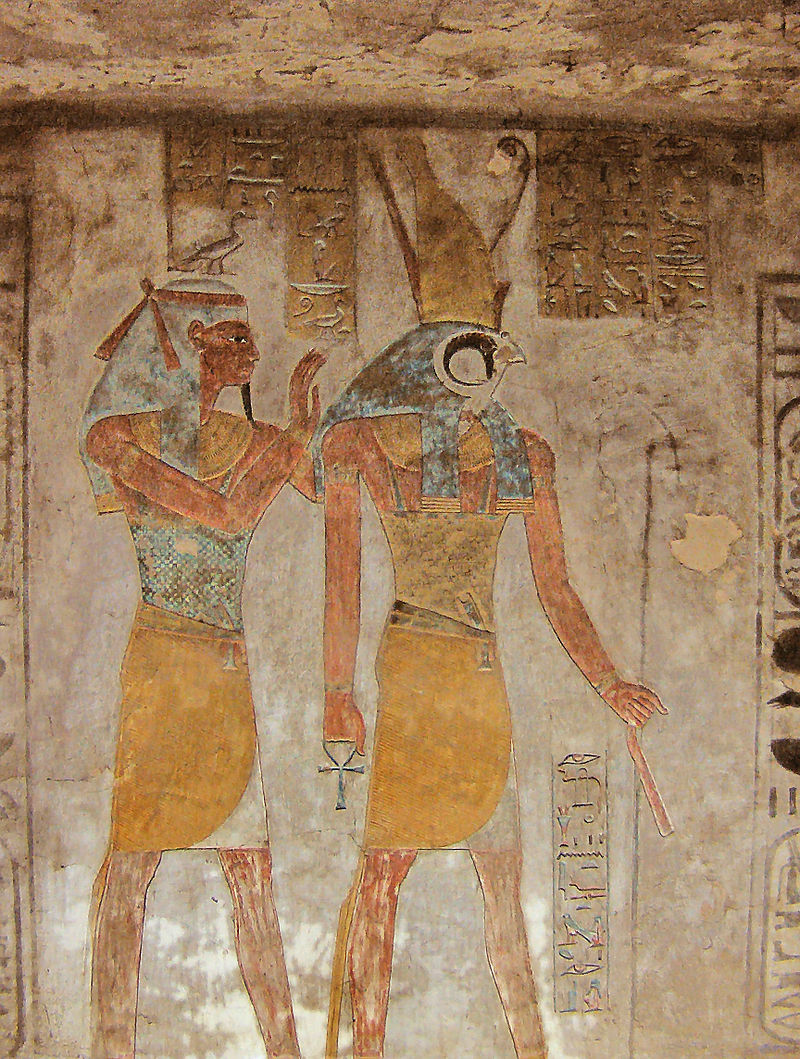
Verses twenty through twenty four
THE FOURTH PLAGUE
20 And hwhy said to Moses, Arise early (Wake up, Load up, Start up) in the breaking period (morning) and you shall stand to the face of Pharaoh. Behold, is going out to the water, and you shall say to him, Thus says hwhy, Send away My People, and they may serve Me. 21 For if you do not with sending [(not send)] away ta-My People, behold I will with sending [(will send)] ta-the flies (swarms, intermixing) on you, and on your servants, and on your people, and on your houses: and the flies (swarms, intermixing) they will fill the houses of Egypt, and also the Ground which they are upon (over) her. 22 And in that day, I will separate (distinguish, set apart) ta-the land of Goshen which My People are standing upon her, for she shall to fail having flies , intermixing) there, by that, you may know for I am hwhy in the nearness of the Earth. 23 And I will put a distinction (difference, redemptive distinguishing, redemptive difference) between My People and between your people. By tomorrow this Sign shall be. 24 And hwhy did so. And came a heaviness of flies (swarms, intermixing) to the house of Pharaoh and the house of his servants. And in all of the land of Egypt, the land, she was ruined (wasted) from the face of the flies (swarms, intermixing).
Question: "Did the Israelites experience the first three plagues before this plague based on verse twenty two in the fourth plague"? The Scriptures didn't say if they did or not, but I don't have the answer to this at this time.
Notice that in the second plague that the frogs have died. What else do frogs eat?.... "FLIES"! Since the ecosystem chain had been broken more, the flies have now become dominant. And since there were no frogs to eat them, hwhy made them the next item to be used for the series of plagues.
Indirectly related, regarding hwhy separating the Israelites from the Egyptians, this could be compared to Yeshua dividing the righteous and the unrighteous in telling the future event relating them to "the Sheep and The Goats", which is noted in the Gospel of Matthew
Matthew 25:31 When the Son of Man shall come in His Glory, and all the holy angels with Him, then shall He sit upon the Throne of His Glory: 32 And before Him shall be gathered all nations: and He shall separate them one from another, as a shepherd divideth his sheep from the goats: 33 And He shall set the sheep on His right hand, but the goats on the left. 34 Then shall the King say unto them on His right hand, Come, ye blessed of My Father, inherit the Kingdom prepared for you from the foundation of the world: 35 For I was an hungred, and ye gave Me meat: I was thirsty, and ye gave Me drink: I was a stranger, and ye took Me in: 36 Naked, and ye clothed Me: I was sick, and ye visited Me: I was in prison, and ye came unto Me. 37 Then shall the righteous answer Him, saying, Lord, when saw we Thee an hungred, and fed Thee? Or thirsty, and gave Thee drink? 38 When saw we Thee a stranger, and took Thee in? Or naked, and clothed Thee? 39 Or when saw we Thee sick, or in prison, and came unto Thee? 40 And the King shall answer and say unto them, Verily I say unto you, Inasmuch as ye have done it unto one of the least of these My brethren, ye have done it unto Me. 41 Then shall he say also unto them on the left hand, Depart from Me, ye cursed, into everlasting fire, prepared for the devil and his angels: 42 For I was an hungred, and ye gave Me no meat: I was thirsty, and ye gave Me no drink: 43 I was a stranger, and ye took Me not in: naked, and ye clothed Me not: sick, and in prison, and ye visited Me not. 44 Then shall they also answer Him, saying, Lord, when saw we Thee an hungred, or athirst, or a stranger, or naked, or sick, or in prison, and did not minister unto Thee? 45 Then shall He answer them, saying, Verily I say unto you, Inasmuch as ye did it not to one of the least of these, ye did it not to Me. 46 And these shall go away into everlasting punishment: but the righteous into life eternal.
Notice in verse twenty two of this week's Torah portion passage that Moses said to Pharaoh:
22 ...by that, you may know that I am hwhy in the nearness of the Earth.
This is the third time that Moses noted to Pharaoh that he would "know" Him, but in a negative way.
Looking at the word FLIES
The Hebrew word for flies is "ah-rohv"- Ayin, Resh, Bet (bre). It is from Strong's Concordance number 6157, and its definition
From H6148; a mosquito (from its swarming): - divers sorts or flies, swarm.
from 6148 "ah-rahv" (bre), and its definition
A primitive root; to braid, that is, intermix; technically to traffic (as if by barter); also to give or be security (as a kind of exchange): - engage, (inter-) meddle (with), mingle (self), mortgage, occupy, give pledges, be (-come, put in) surety, undertake.
Notice that it is from the same root word that our translation "evening" which I translate "mixing period", as well as "interminge".
Verse twenty five
25 And Pharaoh called to Moses and to Aaron and said, Go sacrifice to your Elohim in the land!
Either Pharaoh did not get the picture, or he purposely plotted it that way, so that Pharaoh would have an excuse against Moses, Aaron and the Israelites to destroy in what Pharaoh likely thought of as an act of defiance against him. This is what hwhy told Moses to tell Pharaoh, which is noted in the Torah portion of Sh'moth, in the book of Exodus
Exodus 5:1 And afterward, Moses and Aaron came, and they said to Pharaoh, Thus says hwhy, Elohim of Israel, Send away ta-My People, and they shall feast to Me in the wilderness.... 3 And they said, the Elohim of the Hebrim (Hebrews) has met (encountered) upon us: We will go now a way of three days in the wilderness, and we will sacrifice to hwhy, our Elohim; lest shall impinge (entreat, intercede, encroach) us on the pestilence or on the sword.
They are to sacrifice "outside" of the land.
Verses twenty six and twenty seven
26 And Moses said, Is not established to do so. For our sacrificing to hwhy, our Elohim, is an abomination (a disgust, a detestable, an abhorrence) of Egypt. Behold, we be sacrificing ta-an abomination (a disgust, a detestable, an abhorrence) of Egypt to their eyes, will they not skullstone (stone) us? 27 We will go a way of three days in the wilderness, and will sacrifice to hwhy, our Elohim, as the which shall say to us.
Moses knew this, because he was a prince in Egypt and understood the Egyptian practices of the day, even if he was away for forty years. Also, Joseph who was Viceroy of Egypt in his day knew this as well. This is the account of Joseph's brothers eating with the Egyptians at Joseph's house, which is noted in the Torah portion of Mikeyts, in the book of Genesis
Genesis 43:29 And lifted up his eyes, and saw ta-Benjamin, his brother, son of his mother, and said, Is this your brother, the smallest (youngest), of which you said to me? And said, Elohim be gracious (favorable) to you, my son. 30 And Joseph hurried; for his bowels (mercies) were deeply moved (deeply affected, yearned, passionate) to his brother: and sought (besought) to weep; and came (entered) to an inner chamber (chamber), and wept there. 31 And washed his face, and went out, and was restrained (composed, contained), and said, Set (Put) out bread. 32 And they set to him by his apartness, and to them by their apartness, and to the Egyptians that are eating with him by their apartness: for the Egyptians, they are not able to eat bread at ta-the Hebrews (Hebrim); for she is an abomination (a disgust, a detestable, an abhorrence) to Egypt.
This is also what Joseph said this to his brothers when Joseph's family arrived in Egypt, which is noted in the Torah portion of Vay-Yigash, in the book of Genesis
Genesis 46:33 And shall be, when Pharaoh calls to you, and says, What is your occupation (doing, work)? 34 And you shall say, Your servants have been men of livestock from our youth, and until now, also we, also our fathers: in over (order) that you may dwell in the land of Goshen; for every shepherd of flocks is an abomination (a disgust, a detestable, an abhorrence) of Egypt.
Moses also knew that Egypt had the military power to come and destroy them if any of the Israelites had ever tried to sacrifice a lamb in the land of Egypt.
Verse twenty eight
28 And Pharaoh said, I, I will send you away, and you will sacrifice to hwhy, your Elohim, in the wilderness; only that farring, you will not to go far. Intercede (Entreat) on unto me.
This is a joke. Pharaoh was saying to Moses. "OK, you can go outside the land, but don't go "too far"". Pharaoh might as well said "Just cross over the border, maybe about a few feet at most, and sacrifice at that "short distance"". The reason is, Pharaoh wanted to keep an eye on them, like "a baby sitter", so that in case they tried to escape, Pharaoh can be quickly alarmed from a short distance and send out his army to overtake them, and bring them back to the land and put them into harsher labor.
Verses twenty nine
29 And Moses said, Behold, I am going out from with you, and I will intercede (entreat) to hwhy, and tomorrow, the flies (swarms, intermixing) shall be removed [(shall depart, shall turn away)] from Pharaoh, from his servants, and from his people. Only Pharaoh, do not add (continue) deception by failing at sending away ta-the People to sacrifice to hwhy.
Moses was saying back to Pharaoh "Now you behave, and don't take back your word again", but it did not work as hwhy predicted to Moses at Mount Siniai. It wasn't hwhy's Time yet.
While in prison, Joseph noted a statement of reminder to the Chief of the Butlers, which is noted in the Torah portion of Vay-Yeyshev, in the book of Genesis
Genesis 40:9 And the Prince of the Cup Bearers accounted (enumerated, enrolled, scrolled) ta-his calm-dream to Joseph, and said to him, Was in my calm-dream, and behold, a vine was to my face; 10 And in the vine were three branches (intwinings): and she was as budding, her blossoms (flowers) ascended her; her clusters, they were ripened of grapes: 11 And the cup of Pharaoh was in my hand: and I took ta-the grapes, and I squeezed (pressed, tread) them to the cup of Pharaoh, and I gave ta-the cup upon the palm of Pharaoh. 12 And Joseph said to him, This is His Interpretation (Translation): The three branches (intwinings), they are three days: 13 In still (yet) three days Pharaoh will lift up ta-your head, and you will return upon your station: and you will give the cup of Pharaoh in his hand according to [(as)] the first custom which you were his cup bearer. 14 For but remember me with you as the which shall be good (well) to you, and you do now kindness with me, and make remembrance of me to Pharaoh, and bring me out from this house: 15 For stolen, I was stolen from the land of the Hebrews (Hebrim): and here also, I have not done anything for they would put me in the bore-pit.
Like the Chief of the Cup Bearers did not remember to tell Pharaoh of Joseph, so did Pharaoh did not do as Moses stated to him to not change his mind again, which he did.
Verses thirty through thirty two
30 And Moses went out from with Pharaoh and interceded (entreated) to hwhy. 31 And hwhy did according to [(as)] the word of Moses, and removed (departed, turned away) the flies (swarms, intermixing) from Pharaoh, from his servants, and from his people; Not one remained. 32 And Pharaoh made ta-his heart heavy in this time also, and did not send away ta-the People.
The magicians were not mentioned regarding this plague. Why were they not mentioned that they tried to create the same plague? I don't have an answer at this time.
King David recalled this plague, which is noted in the book of the Psalms
Psalm 105:31 He spake, and there came divers sorts of flies, and lice in all their coasts.
Notice in verse thirty two of this week's Torah portion passage that Pharaoh's heart was heavy ("kavahd" (dbk)), in which Pharaoh did it to himself.
THE EGYPTIAN eLOHIM RELATING TO THE FOURTH PLAGUE
The Egyptian deity related to this plague is "Khpheri", a deity of creation.
This is what Wikipedia says regarding Khpheri:
"Khepri was connected with the scarab beetle (kheprer), because the scarab rolls balls of dung across the ground, an act that the Egyptians saw as a symbol of the forces that move the sun across the sky. Khepri was thus a solar deity. Young dung beetles, having been laid as eggs within the dung ball, emerge from it fully formed. Therefore, Khepri also represented creation and rebirth, and he was specifically connected with the rising sun and the mythical creation of the world. The Egyptians connected his name with the Egyptian language verb kheper, meaning "develop" or "come into being". Kheper, or (Xeper) is a transcription of an ancient Egyptian word meaning to come into being, to change, to occur, to happen, to exist, to bring about, to create, etc. Egyptologists typically transliterate the word as ?pr. Both Kheper and Xeper possess the same phonetic value and are pronounced as "kheffer"".
These are the images of the Egyptian god Khepher
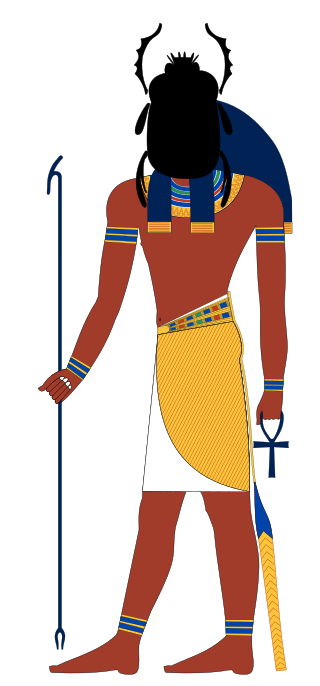
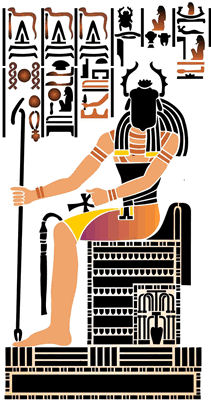
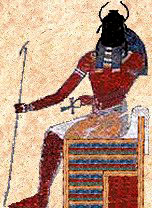
CHAPTER 9
Exodus 9:1-35
Exo 9:1 And hwhy said to Moses, Go to Pharaoh, and you shall speak to him, Thus says hwhy, Elohim of the Hebrim (Hebrews), Send away ta-My People, and may serve Me. 2 For if you refuse to send away, and you are still with the seizing (holding) on them, 3 Behold, the Hand of hwhy shall be on your livestock which is in the field, on the horses, on the donkeys, on the camels, on the herds, and on the flocks: a pestilence of much heaviness. 4 And hwhy shall marvelously act (distinguish, make a difference) between the livestock of Israel, and between the livestock of Egypt: and a word shall not die from any belonging to the Sons of Israel.
5 And hwhy set an appointed time, to say, Tomorrow, hwhy shall do this Word in the land. 6 And hwhy did ta-this Word from the morrow, and was the death of all of the livestock of Egypt [(and all of the livestock of Egypt died)]: And was not one death from the cattle of the Sons of Israel [(And not one from the livestock of the Sons of Israel died, And from the livestock of the Sons of Israel, not one died)]. 7 And Pharaoh sent, and behold, not a death from the livestock of Israel, unto one. And the heart of Pharaoh was heavy, and did not send away ta-the People.
8 And hwhy said to Moses and to Aaron, Take for yourselves fullness of your fists of puffed soot of the smelting furnace, and Moses shall strew (sprinkle) him to the Heavens to the eyes of Pharaoh. 9 And shall be to floating dust (floating powder) over (upon) all of the land of Egypt, and shall be for a boil (inflammation, ulcer?) breaking forth of blains (pustules, eruptions) upon the Adam and upon the animals in all of the land of Egypt. 10 And they took ta-the puffed soot of the smelting furnace, and they stood to the face of Pharaoh; and Moses strewed (sprinkled) him to the Heavens; And became a boil (inflammation) of blains (pustles, eruptions) breaking forth on the Adam, and on the animals. 11 And the magicians (horoscopists, drawing magicians), they were not able to stand to the face of Moses from the facing of the boils (inflammations); for the boil (inflammation) was on the magicians (horoscopists, drawing magicians) and on all of Egypt. 12 And hwhy strengthened ta-the heart of Pharaoh, and did not listen to them; as the which hwhy spoke to Moses.
13 And hwhy said to Moses, Arise early (Wake up, Load up, Start up) in the breaking period (morning), and you shall stand to the face of Pharaoh, and you shall say to him, Thus says hwhy, Elohim of the Hebrim (Hebrews), Send away ta-My People, and may serve Me. 14 For in this time, I will send ta-all of My plagues (smitings) to your heart, and on your servants, and on your people; in order [(in over)] you may know for no one is like Me in all of the Earth. 15 For now, I have stretched out (stretched forth) ta-My Hand, and I have striken you and ta-your people on the pestilence; and you have been cut down (secreted) from the Earth. 16 And surely (howbeit), in order [(in over)] that I have made you stand this, in order [(in over)] that you will see ta-My Power; by that, My Name may be enrolled (scrolled, numbered) in all of the Earth. 17 You are still with exalting (extoling) against My People by failing at sending them away. 18 Behold, according to [(as)] the time tomorrow will I mater-rain much heavy hail which has not been like him in Egypt, by from the day was founded and until now.
19 And now, Send out the sheltering (retiring, strengthening) of ta-your livestock, and ta all which belongs to you in the field; all of the Adam and the animals which are found in the field, and shall not be gathered to the house, and the hail shall descend (come down) upon them, and they shall be the death [(and they shall die)]. 20 The one revering (giving awe, fearing) ta-the Word of hwhy from the servants of Pharaoh, ta-his servants, and ta-his livestock, were fleeing to their houses: 21 And the which did not set his heart to the Word of hwhy, and was the forsaking of ta-his servants and ta-his livestock in the field.
22 And hwhy said to Moses, Stretch out (Stretch forth) ta-your hand upon the Heavens, and shall be hail in all of the land of Egypt upon (over) the Adam, and upon (over) the animals, and upon (over) every herb (plant, grass) of the field in the land of Egypt. 23 And Moses stretched out (stretched forth) ta-his staff (rod, branch) upon the Heavens: and hwhy gave sounds, and hail; and fire, she went (walked) to the Earth; And hwhy did the mater-raining of hail upon (over) the land of Egypt. 24 And was hail, and fire was reserved (fetched, taken) in the midst of the much heavy hail which has been none like him in all of the land of Egypt from since she became for a nation. 25 And the hail struck in all of the land of Egypt ta all which was in the field from Adam and unto animals; And the hail struck ta every herb (plant, grass) of the field, and shever-shattered (shever-broken) ta-every tree of the field. 26 Only in the land of Goshen which the Sons of Israel were there was no hail.
27 And Pharaoh sent, and called for Moses and for Aaron, and said to them, I have sinned that time: hwhy is the Righteous One, and I and my people are the wicked ones. 28 Intercede (Entreat) to hwhy, and much, from becoming of the sounds of Elohim, and hail; And I will send you away, and you shall not add (continue, augment) to remain (stand). 29 And Moses said unto him, As I go out of ta-the city, I will spread out ta-my palms to hwhy; The sound, they shall be idle, and shall not be any more hail; by that, you may know for the Earth belongs to hwhy. 30 And you and your servants, I know for you will not yet revere (give awe, fear) [(you will be hesitant (suspending) at revering (giving awe, fearing))] from the Face of hwhy Elohim.
31 And the flax and the barley were stricken: for the barley was at aviv stage (earing stage, green earing stage), and the flax was of calyx stage (fused petal stage). 32 And the wheat and the spelt (rye), they were not stricken: for they were unripened. 33 And Moses went out from with Pharaoh of ta-the city, and spread out his palms to hwhy: and the sounds (thunder) and the hail became idle, and the mater-rain had not poured to the Earth.
34 And Pharaoh saw for the mater-rain and the hail and the sounds (thunder) became idle, and and added to the sin, and his heart became heavy, he and his servants. 35 And the heart of Pharaoh was strengthened, and did not send away ta-the Sons of Israel; as the which hwhy spoke on the hand of Moses.
(NOTE: Not all verses will have comments)
Verses one through seven
Continuing with the ten plagues:
THE FIFTH PLAGUE
1 And hwhy said to Moses, Go to Pharaoh, and you shall speak to him, Thus says hwhy, Elohim of the Hebrim (Hebrews), Send away ta-My People, and may serve Me. 2 For if you refuse to send away, and you are still with the seizing (holding) on them, 3 Behold, the Hand of hwhy shall be on your livestock which is in the field, on the horses, on the donkeys, on the camels, on the herds, and on the flocks: a pestilence of much heaviness. 4 And hwhy shall marvelously act (distinguish, make a difference) between the livestock of Israel, and between the livestock of Egypt: and a word shall not die from any belonging to the Sons of Israel. 5 And hwhy set an appointed time, to say, Tomorrow, hwhy shall do this Word in the land. 6 And hwhy did ta-this Word from the morrow, and was the death of all of the livestock of Egypt [(and all of the livestock of Egypt died)]: And was not one death from the cattle of the Sons of Israel [(And not one from the livestock of the Sons of Israel died, And from the livestock of the Sons of Israel, not one died)]. 7 And Pharaoh sent, and behold, not a death from the livestock of Israel, unto one. And the heart of Pharaoh was heavy, and did not send away ta-the People.
Notice that Pharaoh did not inquire of Moses in this plague.
Also, looking at this week's Torah portion passage that there were "camels" in this account. How often do Moses movies show camels in this plague account that were dead, let alone alive at all before they are dead from the pestilence? None at all.
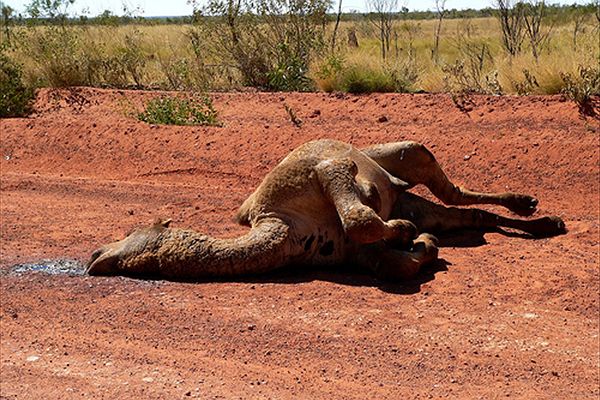
In verse seven of this week's Torah portion passage, Pharaoh's heart was heavy ("kavahd" (dbk)), meaning Pharaoh did it himself. This is the second time that Pharaoh's heart was made heavy without hwhy intervening between the two times Pharaoh made it heavy. Was Pharaoh's heart still strong enough to handle it without hwhy's intervention? I don't have an answer to that at this time.
King David had a personal experience with pestilence when he did not fulfill a commandment to give a half-shekel to the Priest for the enumeration of the people in the land, this is what happened afterward, which is noted in the book of the Chronicles
2 Samuel 24:10 And David's heart smote him after that he had numbered ta-the People. And David said unto hwhy, I have sinned greatly in that I have done: and now, I beseech Thee, hwhy, take away ta-the iniquity of Thy servant; for I have done very foolishly. 11 For when David was up in the morning, the Word of hwhy came unto the prophet Gad, David's seer, saying, 12 Go and say unto David, Thus saith hwhy, I offer thee three things; choose thee one of them, that I may do it unto thee. 13 So Gad came to David, and told him, and said unto him, Shall seven years of famine come unto thee in thy land? Or wilt thou flee three months before thine enemies, while they pursue thee? Or that there be three days' pestilence in thy land? Now advise, and see what answer I shall return to Him that sent me. 14 And David said unto Gad, I am in a great strait: let us fall now into the hand of hwhy; for His mercies are great: and let me not fall into the hand of man. 15 So hwhy sent a pestilence upon Israel from the morning even to the time appointed: and there died of the people from Dan even to Beersheba seventy thousand men.
He chose the pestilence.
Looking at the word PESTILENCE
The Hebrew word for pestilence is "deh-vehr"- Dalet, Bet, Resh (rbd). It is from Strong's Concordance number 1698, and its definition
From H1696 (in the sense of destroying); a pestilence: - murrain, pestilence, plague.
from 1696 "dah-vahr" (rbd), and its definition
A primitive root; perhaps properly to arrange; but used figuratively (of words) to speak; rarely (in a destructive sense) to subdue: - answer, appoint, bid, command, commune, declare, destroy, give, name, promise, pronounce, rehearse, say, speak, be spokesman, subdue, talk, teach, tell, think, use [entreaties], utter, X well, X work.
Notice that the Hebrew root word is the same where the word "word" and "speak" comes from. In a play on words, one could translate the phrase like this:
3 Behold, the Hand of hwhy shall be on your livestock which is in the field, on the horses, on the asses, on the camels, on the herds, and on the flocks: a word of much heaviness.
THE EGYPTIAN eLOHIM RELATING TO THE FIFTH PLAGUE
These are the possible Egyptian deities related to this plague:
One of them is "Hathor", an Egyptian cow goddess. This is what Wikipedia's says of this deity:
"...an Ancient Egyptian goddess who personified the principles of joy, feminine love, and motherhood. She was one of the most important and popular deities throughout the history of Ancient Egypt. Hathor was worshiped by Royalty and common people alike in whose tombs she is depicted as "Mistress of the West" welcoming the dead into the next life. In other roles she was a goddess of music, dance, foreign lands and fertility who helped women in childbirth, as well as the patron goddess of miners. Hathor is commonly depicted as a cow goddess with horns in which is set a sun disk with Hathor is commonly depicted as a cow goddess with horns in which is set a sun disk with Uraeus. Twin feathers are also sometimes shown in later periods as well as a menat necklace. Hathor may be the cow goddess who is depicted from an early date on the Narmer Palette and on a stone urn dating from the 1st dynasty that suggests a role as sky-goddess and a relationship to Horus who, as a sun god, is "housed" in her".
These are images of Hathor
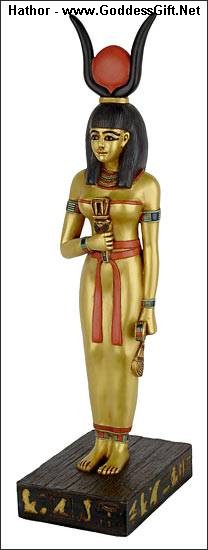
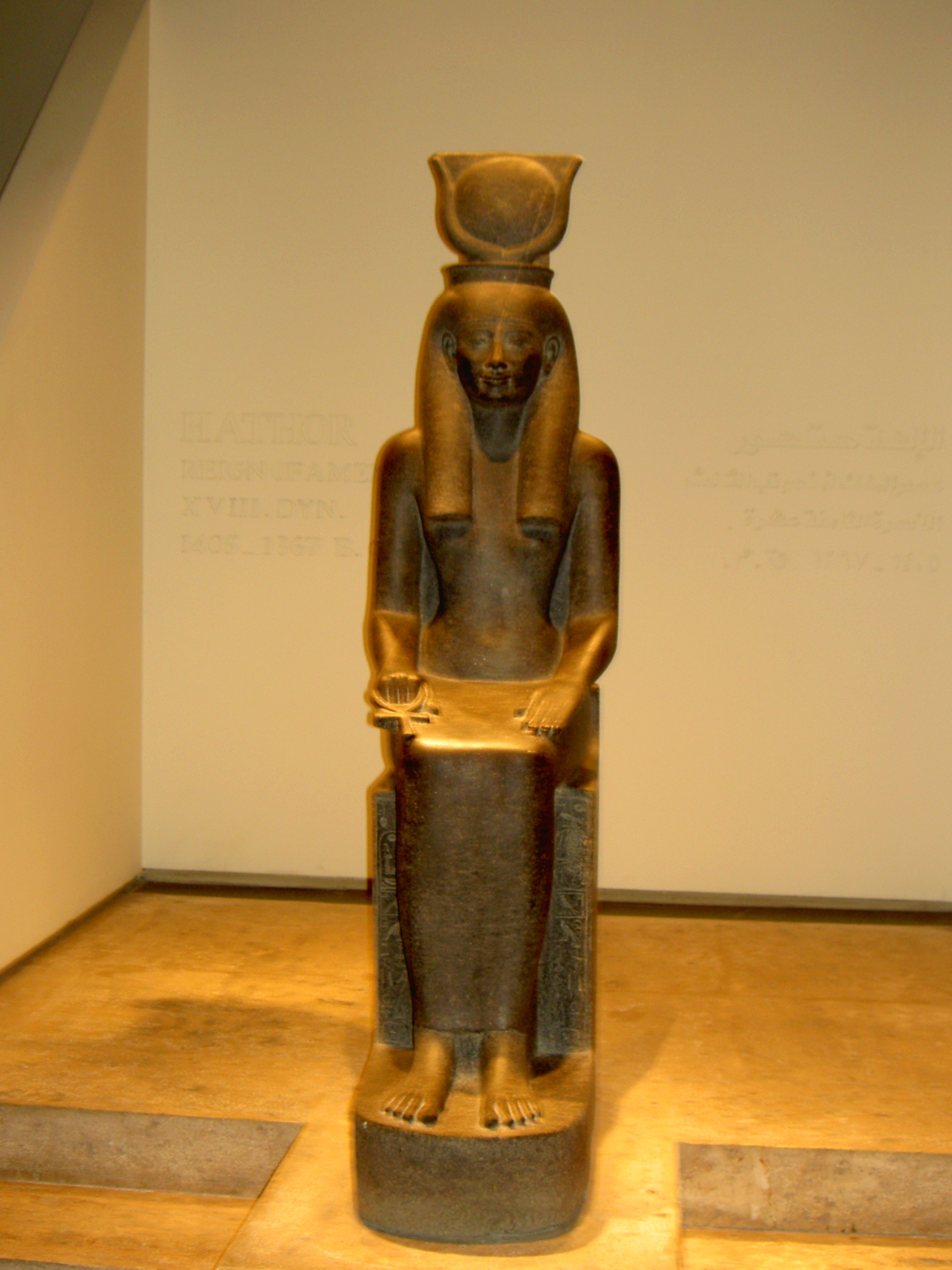
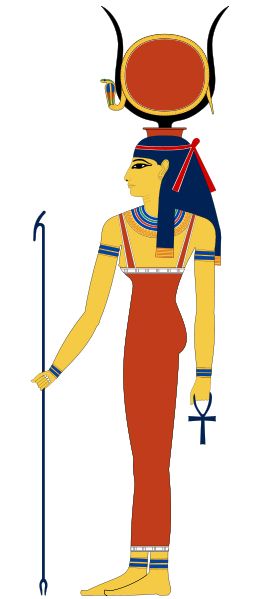
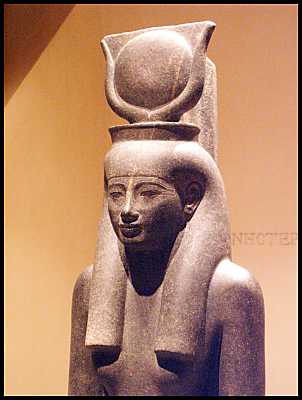
Another possible Egyptian god related to this plague is "Apis". According the Wikpedia, this god was a god of strength and fertility. This is what Wikpedia also says regarding Apis:
"Apis or Hapis (alternatively spelled Hapi-ankh), is a bull-deity that was worshipped in the Memphis region. "Apis served as an intermediary between humans and an all-powerful god (originally Ptah, later Osiris, then Atum)." [quote: Virtual Egyptian Museum]
These are images of Apis
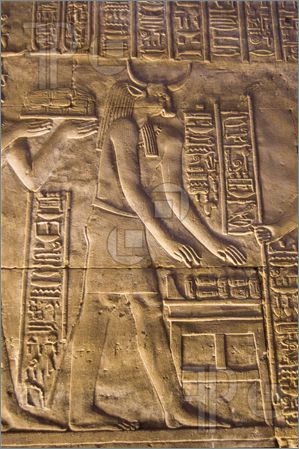
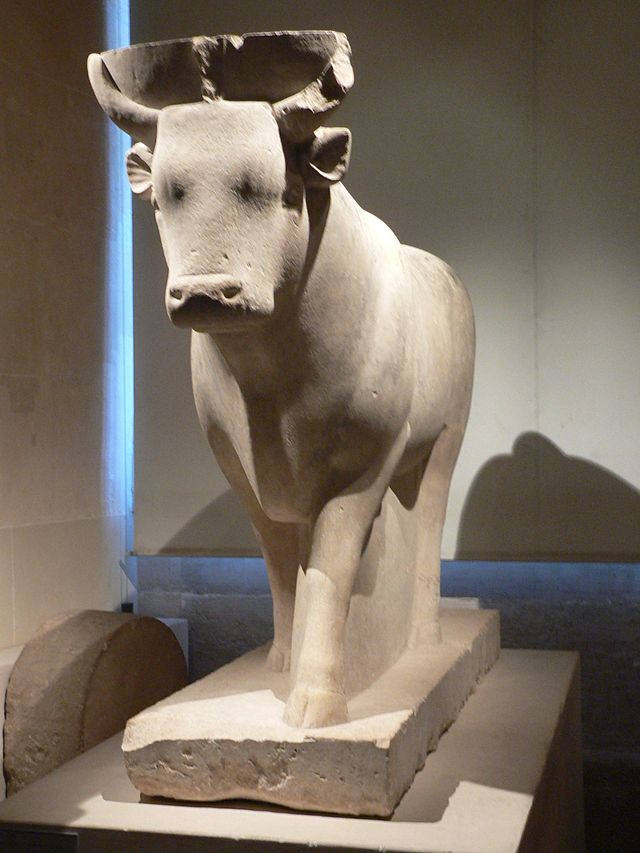
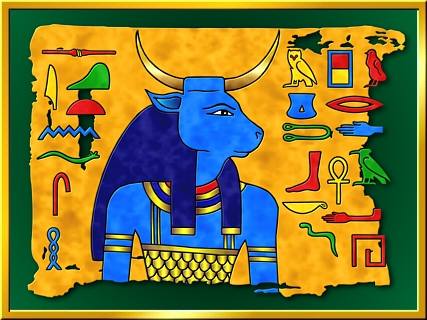
Verses eight through twelve
THE SIXTH PLAGUE
8 And hwhy said to Moses and to Aaron, Take for yourselves fullness of your fists of puffed soot of the smelting furnace, and Moses shall strew (sprinkle) him to the Heavens to the eyes of Pharaoh. 9 And shall be to floating dust (floating powder) over (upon) all of the land of Egypt, and shall be for a boil (inflammation, ulcer?) breaking forth of blains (pustules, eruptions) upon the Adam and upon the animals in all of the land of Egypt. 10 And they took ta-the puffed soot of the smelting furnace, and they stood to the face of Pharaoh; and Moses strewed (sprinkled) him to the Heavens; And became a boil (inflammation) of blains (pustles, eruptions) breaking forth on the Adam, and on the animals. 11 And the magicians (horoscopists, drawing magicians), they were not able to stand to the face of Moses from the facing of the boils (inflammations); for the boil (inflammation) was on the magicians (horoscopists, drawing magicians) and on all of Egypt. 12 And hwhy strengthened ta-the heart of Pharaoh, and did not listen to them; as the which hwhy spoke to Moses.
Pharaoh's heart was strengthened by hwhy ("khazak" (qzx)).
Job experienced having boils that was placed on him by HaSatan, which is noted in his book
Job 2:1 Again there was a day when the sons of the Elohim came to present themselves before hwhy, and Satan came also among them to present himself before hwhy. 2 And hwhy said unto Satan, From whence comest thou? And Satan answered ta-hwhy, and said, From going to and fro in the earth, and from walking up and down in it. 3 And hwhy said unto Satan, Hast thou considered My servant, Job, that there is none like him in the earth, a perfect and an upright man, one that feareth Elohim, and escheweth evil? And still he holdeth fast his integrity, although thou movedst me against him, to destroy him without cause. 4 And Satan answered ta-hwhy, and said, Skin for skin, yea, all that a man hath will he give for his life. 5 But put forth Thine hand now, and touch his bone and his flesh, and he will curse Thee to Thy Face. 6 And hwhy said unto Satan, Behold, he is in thine hand; but save ta-his life. 7 So went Satan forth from ta the Face of hwhy, and smote ta-Job with sore boils from the sole of his foot unto his crown.
THE EGYPTIAN eLOHIM RELATING TO THE SIXTH PLAGUE
The Egyptian goddess affiliated with this plague is "Qetesh". This is what Wikipedia says regarding this deity:
"Qetesh (also Kadesh /ˈkɑːdɛʃ/) is a goddess adopted into theancient Egyptian religion from the religion of Canaan [that figures], popular during the New Kingdom. She was a fertility goddess of sacred ecstasy and sexual pleasure.
The name was probably vocalized by Egyptians as *Qātiša from the Semitic root Q-D-S meaning 'holy'. Her city of worship was Qadesh.
In the Qetesh stele, she is represented as a frontal nude standing on a lion between Min of Egypt and the Canaanite warrior god Resheph. She is holding snakes in one hand and a lotus flower in the other as symbols of creation.
She is associated with Anat, Astarte, and Asherah. She also has elements associated with the goddesses of Myceneae, the Minoans of Crete, and certain Kassite goddesses of the metals trade in Tin, Copper and Bronze between Lothal and Dilmun.
On some versions of the Qetesh stele her register with Min and Resheph is placed over another register showing gifts being presented to ‘Anat the goddess of War and below a register listing the lands belonging to Min and Resheph.
Qudshu-Astarte-Anat is a representation of a single goddess who is a combination of three goddesses: Qetesh (Athirat, Asherah), Astarte, and Anat. It was a common practice for Canaanites and Egyptians to merge different deities through a process of synchronization, thereby, turning them into one single entity. The "Triple-Goddess Stone", that was once owned by Winchester College, shows the goddess Qetesh with the inscription "Qudshu-Astarte-Anat", showing their association as being one goddess, and Qetesh (Qudshu) in place of Athirat. Religious scholar Saul M. Olyan (author of Asherah and the Cult of Yahweh in Israel), calls the representation on the Qudshu-Astarte-Anat plaque "a triple-fusion hypostasis", and considers Qudshu to be an epithet of Athirat by a process of elimination, for Astarte and Anat appear after Qudshu in the inscription".
This is what the SSC Hot Springs website says regarding Qetesh and the relevance of the ash:
"Ash from a furnace makes lye; lye is used in making soap. Soap cleans. Boils picture the opposite of a clean body.
The goddess Qadshu (alternately spelled Qudshu, Qodesh, Qadesh, Qadashu, Qadesha, Qetesh, Qedeshet, Kedesh) was a latter Egyptian goddess of sexuality. (The Hebrew word kedesh means holy-one, and also refers to temple whores in this form of the word.) They were considered clean ones. They would have been unable to do their sexual functions with boils in the worst places".
These are images of the Egyptian goddess Qetesh
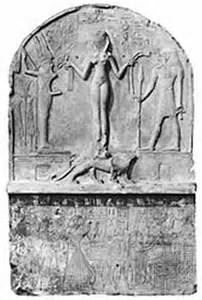
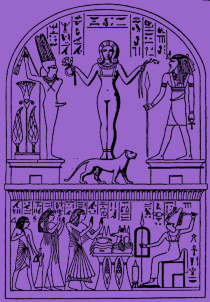
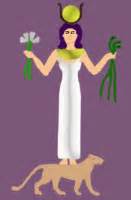
Notice the name of the goddess Qetesh is the similar Hebrew word "kodesh" (sdq), meaning "holy", but on the opposite definition, it means "a male prostitute".
Verses thirteen through eighteen
THE SEVENTH PLAGUE
13 And hwhy said to Moses, Arise early (Wake up, Load up, Start up) in the breaking period (morning), and you shall stand to the face of Pharaoh, and you shall say to him, Thus says hwhy, Elohim of the Hebrim (Hebrews), Send away ta-My People, and may serve Me. 14 For in this time, I will send ta-all of My plagues (smitings) to your heart, and on your servants, and on your people; in order [(in over)] you may know for no one is like Me in all of the Earth. 15 For now, I have stretched out (stretched forth) ta-My Hand, and I have striken you and ta-your people on the pestilence; and you have been cut down (secreted) from the Earth. 16 And surely (howbeit), in order [(in over)] that I have made you stand this, in order [(in over)] that you will see ta-My Power; by that, My Name may be enrolled (scrolled, numbered) in all of the Earth. 17 You are still with exalting (extoling) against My People by failing at sending them away. 18 Behold, according to [(as)] the time tomorrow will I mater-rain much heavy hail which has not been like him in Egypt, by from the day was founded and until now.
Notice in verse thirteen of this week's Torah portion passage that this was the first time Aaron was not involved with Moses when hwhy spoke to him
13 And hwhy said to Moses,... and you shall say to him,
It is most probable that Moses had enough confidence to do it without Aaron, and hwhy brought Moses to Pharaoh by himself. Moses was supposed to do it alone as hwhy said to him from the beginning, which is noted in the Torah portion of Sh'moth, in the book of Exodus
Exodus 3:18 ...and you shall come, you and the Elders of Israel, to the king of Egypt, and you shall say to him, hwhy, Elohim of the Hebrim (Hebrews), has befell (happened, bought about) upon us: and now, we will go now at a way of three days in the wilderness, and we will sacrifice to hwhy, our Elohim. 19 And I, I know for the king of Egypt will not give you to go, and not on a Strong Hand.
hwhy still allowed Aaron to be his sidekick.
Notice also in verse fourteen of this week's Torah portion passage that hwhy that Moses said to Pharaoh
14 ...I will send ta-all of My plagues (stumblings) to your heart,
This is the first time that Moses, or Moses and Aaron, said anything like that to Pharaoh. In previous times, they said to Pharaoh that the plague will strike him only. Now they are to plague his heart.
Looking at the word HAIL
The Hebrew word for hail is "bah-rahd"- Bet, Resh, Dalet (drb). It is from Strong's Concordance number 1259, and its definition
From H1258; hail: - hail ([stones]).
from 1258 "bah-rahd" (drb), and its definition
A primitive root, to hail: - hail.
This is where we get the modern English word "broad", meaning the hail is broad in size. It was probably the size between the size of golfballs and softballs.
Notice in verse sixteen of this week's Torah portion passage what Moses said to Pharaoh:
16 ...I have made you stand this, in order [(in over)] that you will see ta-My Power; by that, My Name may be enrolled (scrolled, numbered) in all of the Earth.
Moses did not say "know" this time, but "see". Why didn't Moses say "know" to Pharaoh? Mabye Pharaoh had "known" hwhy enough, that it was time for him to "see" hwhy's actions. Notice that Moses didn't say hwhy by Name, but Moses said to Pharaoh that His "Name" will be declared.
Verses nineteen through twenty-one
19 And now, Send out the sheltering (retiring, strengthening) of ta-your livestock, and ta all which belongs to you in the field; all of the Adam and the animals which are found in the field, and shall not be gathered to the house, and the hail shall descend (come down) upon them, and they shall be the death [(and they shall die)]. 20 The one revering (giving awe, fearing) ta-the Word of hwhy from the servants of Pharaoh, ta-his servants, and ta-his livestock, were fleeing to their houses: 21 And the which did not set his heart to the Word of hwhy, and was the forsaking of ta-his servants and ta-his livestock in the field.
Comparing to the previous plagues, this was the first time the Egyptians were warned of any plague by the Word of hwhy, and it was the plague of pestilence.
Indirectly related to warnings, compare this plague to all of the Prophets who prophesied against the Israelites throughout the centuries. Some have obeyed the warnings, but most of them didn't. It cost the Northern House of the Lost Ten Tribes of Israel to be divorced from hwhy and exiled from the land, and lost their identity. The Southern House of the Two Tribes of Judah were not, but they were warned by the prophets as well that they would kicked out the land for a while, and returned to the land after seventy years of Babylonian captivity. Yeshua came centuries later, but the Jewish People failed to see His time of visitation. Yeshua warned His disciples that the Temple would be destroyed, and He warned them about "the beginning of sorrows". The Temple was destroyed about forty years after Yeshua's resurrection, and the Jewish People were dispersed from the land again for another 1,900 years before returning to the land again in 1948.
Verses twenty two through thirty
22 And hwhy said to Moses, Stretch out (Stretch forth) ta-your hand upon the Heavens, and shall be hail in all of the land of Egypt upon (over) the Adam, and upon (over) the animals, and upon (over) every herb (plant, grass) of the field in the land of Egypt. 23 And Moses stretched out (stretched forth) ta-his staff (rod, branch) upon the Heavens: and hwhy gave sounds, and hail; and fire, she went (walked) to the Earth; And hwhy did the mater-raining of hail upon (over) the land of Egypt. 24 And was hail, and fire was reserved (fetched, taken) in the midst of the much heavy hail which has been none like him in all of the land of Egypt from since she became for a nation. 25 And the hail struck in all of the land of Egypt ta all which was in the field from Adam and unto animals; And the hail struck ta every herb (plant, grass) of the field, and shever-shattered (shever-broken) ta-every tree of the field. 26 Only in the land of Goshen which the Sons of Israel were there was no hail. 27 And Pharaoh sent, and called for Moses and for Aaron, and said to them, I have sinned that time: hwhy is the Righteous One, and I and my people are the wicked ones. 28 Intercede (Entreat) to hwhy, and much, from becoming of the sounds of Elohim, and hail; And I will send you away, and you shall not add (continue, augment) to remain (stand). 29 And Moses said unto him, As I go out of ta-the city, I will spread out ta-my palms to hwhy; The sound, they shall be idle, and shall not be any more hail; by that, you may know for the Earth belongs to hwhy. 30 And you and your servants, I know for you will not yet revere (give awe, fear) [(you will be hesitant (suspending) at revering (giving awe, fearing))] from the Face of hwhy Elohim.
Notice Pharaoh said in verse twenty seven in this week's Torah portion passage
27 ...I have sinned that time: hwhy is the Righteous One, and I and my people are the wicked ones.
In other words, Pharaoh might as well said, "OK, I didn't sin "until now", and I made a mistake..... oops, you caught me. We are "bad people"", an equivalent of Pharaoh slapping his wrist and saying "Bad Pharaoh. Bad Pharaoh", like it was a big deal to him.
Moses knew that Pharaoh was not going to give up, as well as his servants, for it wasn't hwhy's time yet for the Israelites to leave Egypt.
Notice that in verse twenty nine of this week's Torah portion passage, Moses says to Pharaoh:
29 ...by that, you may know for the Earth belongs to hwhy.
Moses went back to the "know" factor, only "this time", he says that the "earth" belongs to hwhy, meaning that it's hwhy who possesses the earth, and not Pharaoh, so called Rah on earth.
Verses thirty-one through thirty three
31 And the flax and the barley were stricken: for the barley was at aviv stage (earing stage, green earing stage), and the flax was of calyx stage (fused petal stage). 32 And the wheat and the spelt (rye), they were not stricken: for they were unripened. 33 And Moses went out from with Pharaoh of ta-the city, and spread out his palms to hwhy: and the sounds (thunder) and the hail became idle, and the mater-rain had not poured to the Earth.
Based on this week's Torah portion passage, it gives us a hint that this plague occurred before the creation of the new Biblical month of the new Biblical year, or in the beginning of the new Biblical Month of the Biblical year. The hint is based on the barley's stage of growth.
Looking at the word EARRING STAGE
The Hebrew word for earring stage is "ah-veev"- Aleph, Bet, Yod, Bet (byba). It is from Strong's Concordance number 24, and its definition
From an unused root (meaning to be tender); green, that is a young ear of grain; hence the name of the month Abib or Nisan: - Abib, ear, green ears of corn.
Notice that it is the similar word of "av" (ba), meaning "father"
This is the name of the future new Biblical month, which is noted in the Torah portion of Bo, in the book of Exodus
Exodus 12:1 And hwhy spoke to Moses and Aaron in the land of Egypt, to say, 2 This renewed month shall be to you the head of renewed months: he shall be to you the first for the renewed months of the year.... 13:4 Today you came out in the renewed month of the Aviv (byba).
In other words, this "Aviv" month could be also called the "Av" month, meaning that this month was the "father" of months. This would be called the first Biblical month of the new Biblical year. It is possible that the earing, or "aviv", stage of the barley that was smitten by the hail was roughly less than three weeks time prior to Israel's departure in the Exodus Passover.
Verses thirty four and thirty five
34 And Pharaoh saw for the mater-rain and the hail and the sounds (thunder) became idle, and and added to the sin, and his heart became heavy, he and his servants. 35 And the heart of Pharaoh was strengthened, and did not send away ta-the Sons of Israel; as the which hwhy spoke on the hand of Moses.
In verse thirty four of this week's Torah portion passage, Pharaoh made his heart "heavy" ("kavahd" (dbk)), because he was sinning in his own matter, but in verse thirty five, hwhy "strengthened" his heart ("khazak" (qzx)).
King David noted of this plague, which is noted in the book of the Psalms
Psalm 105:32 He gave them hail for rain, and flaming fire in their land.
REVELATION'S RELEVANCE TO THE SEVENTH PLAGUE
There will be hail pouring down on earth in the end times, which is noted in the apostle John's letter in the book of Revelation
Revelation 16:17 And the seventh angel poured out his vial into the air; and there came a great voice out of the Temple of Heaven, from the Throne, saying, It is done. 18 And there were voices, and thunders, and lightnings; and there was a great earthquake, such as was not since men were upon the earth, so mighty an earthquake, and so great. 19 And the great city was divided into three parts, and the cities of the nations fell: and great Babylon came in remembrance before hwhy, to give unto her the cup of the wine of the fierceness of His Wrath. 20 And every island fled away, and the mountains were not found. 21 And there fell upon men a great hail out of Heaven, every stone about the weight of a talent: and men blasphemed hwhy because of the plague of the hail; for the plague thereof was exceeding great.
As Brad Scott of Wildbrach Ministry and Bill Cloud of Shoreshim Ministries say "The end is declared from the beginning".
THE EGYPTIAN eLOHIM RELATING TO THE SEVENTH PLAGUE
There were gods and goddesses involved with the hail.
The first possible Egyptian deity is "Nut". This is what Answers.com says regarding Nut
"Nut: Sky goddess b. Shu: god of air; associated with calm or cooling c. Tefnut: goddess of water/moisture; linked to sun adn moon d. Seth: associated primarily with chaos but also thunder, the desert and infertility".
This is what Wikipedia says regarding Nut:
"Nut (/nʌt/ or /nuːt/) or Neuth (/nuːθ/ or /njuːθ/; also spelled Nuit or Newet) is the goddess of the sky in the Ennead of ancient Egyptian religion. She was seen as a star-covered nude woman arching over the earth, or as a cow. Nut is a daughter of Shu and Tefnut. Her husband and brother is Geb. She has five children: Osiris, Set, Isis, Nephthys, and Horus. Her name is translated to mean 'sky' and she is considered one of the oldest deities among the Egyptian pantheon, with her origin being found on the creation story of Heliopolis. She was originally the goddess of the nighttime sky, but eventually became referred to as simply the sky goddess. Her headdress was the hieroglyphic of part of her name, a pot, which may also symbolize the uterus. Mostly depicted in nude human form, Nut was also sometimes depicted in the form of a cow whose great body formed the sky and heavens, a sycamore tree, or as a giant sow, suckling many piglets (representing the stars)."
These are the images of these deities:
Nut repesents the heavens, and Geb is laying below represents the earth
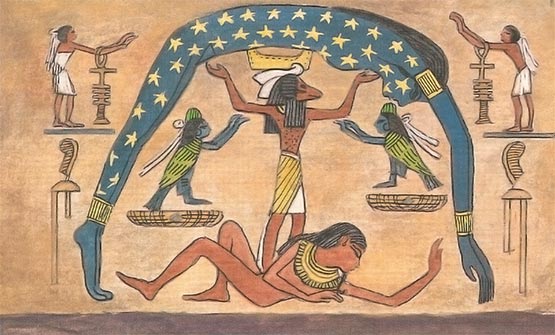
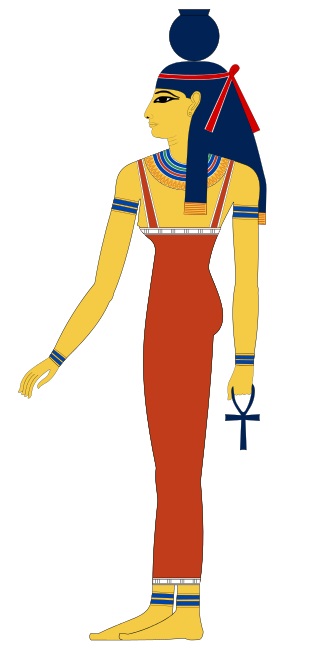

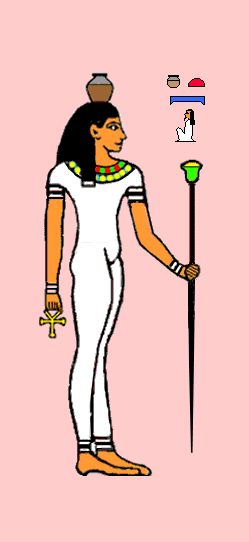

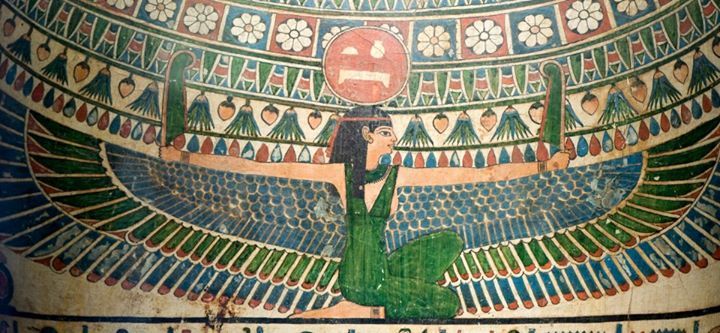
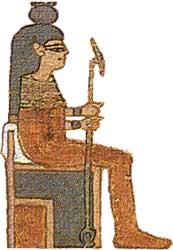
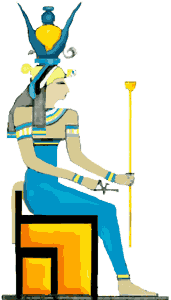
This is Nut in the formation as a cow
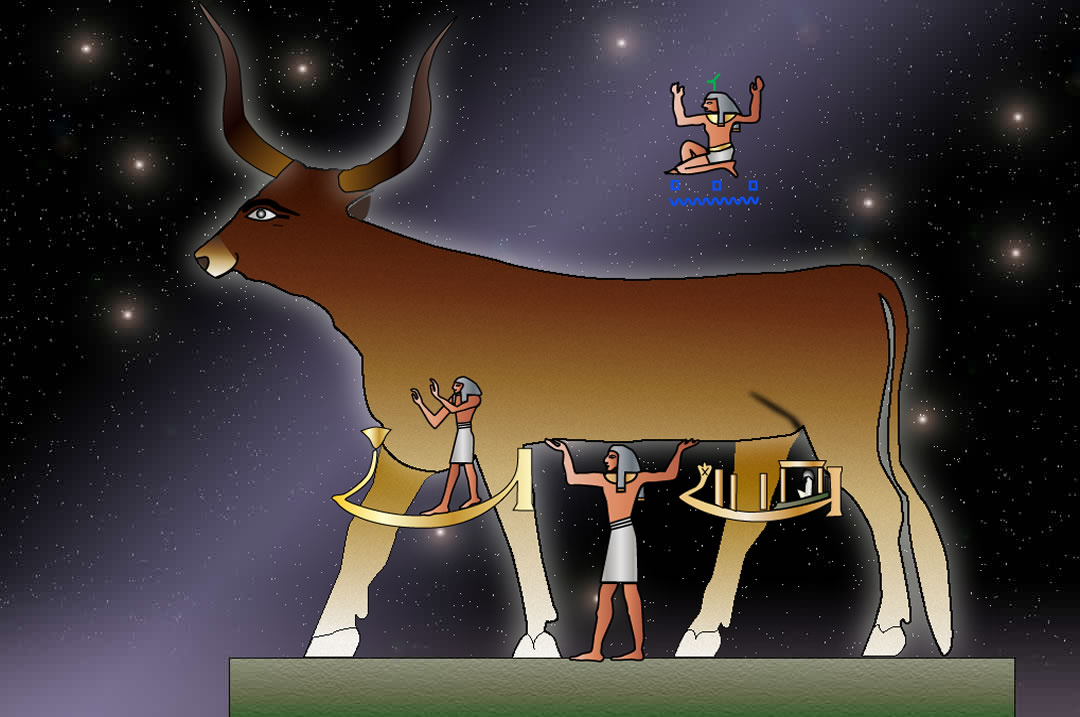
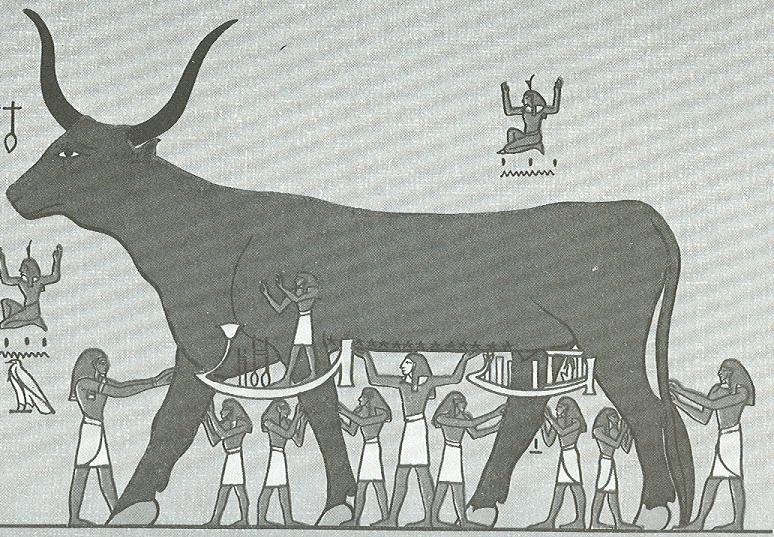
Another possible Egyptian deity relating to the hail is "Shu".
This is what Wikipedia says regarding Shu:
"As the air, Shu was considered to be cooling, and thus calming, influence, and pacifier. Due to the association with air, calm, and thus Ma'at (truth, justice and order), Shu was portrayed in art as wearing an ostrich feather. Shu was seen with between one and four feathers. The ostrich feather was symbolic of light and emptiness. Fog and clouds were also Shu's elements and they were often called his bones. Because of his position between the sky and earth, he was also known as the wind.
In a much later myth, representing the terrible weather disaster at the end of the Old Kingdom, it was said that Tefnut and Shu once argued, and Tefnut left Egypt for Nubia (which was always more temperate). It was said that Shu quickly decided that he missed her, but she changed into a cat that destroyed any man or god that approached. Thoth, disguised, eventually succeeded in convincing her to return.
The Greeks associated Shu with Atlas, the primordial Titan who held up the celestial spheres, as they are both depicted holding the sky.
The air god Shu separated the sky goddess Nut from the earth god, Geb. This treatment symbolized duality, the separation of the world into opposites: above and below, light and dark, good and evil. Shu is mostly represented by a man. Only in his function as a fighter and defender as the sun god does he sometimes receive a lion's head. In Egyptian mythology, Shu arrived as breath from the nose of the original god, Atum-Ra, together with his sister and wife, Tefnut, the moist air. The first pair of cosmic elements then created the sky goddess, Nut, and the earth god, Geb, who in turn created the deities Isis, Osiris, Nephthys and Set.
He carries an ankh, the symbol of life".
These are images of Shu, god of air (notice it wears two different feather dresses, both representing the air)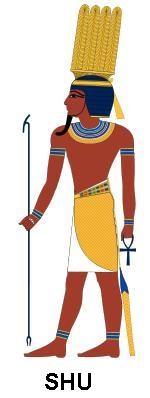

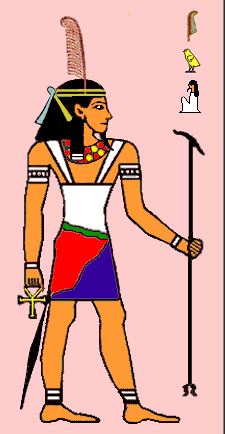
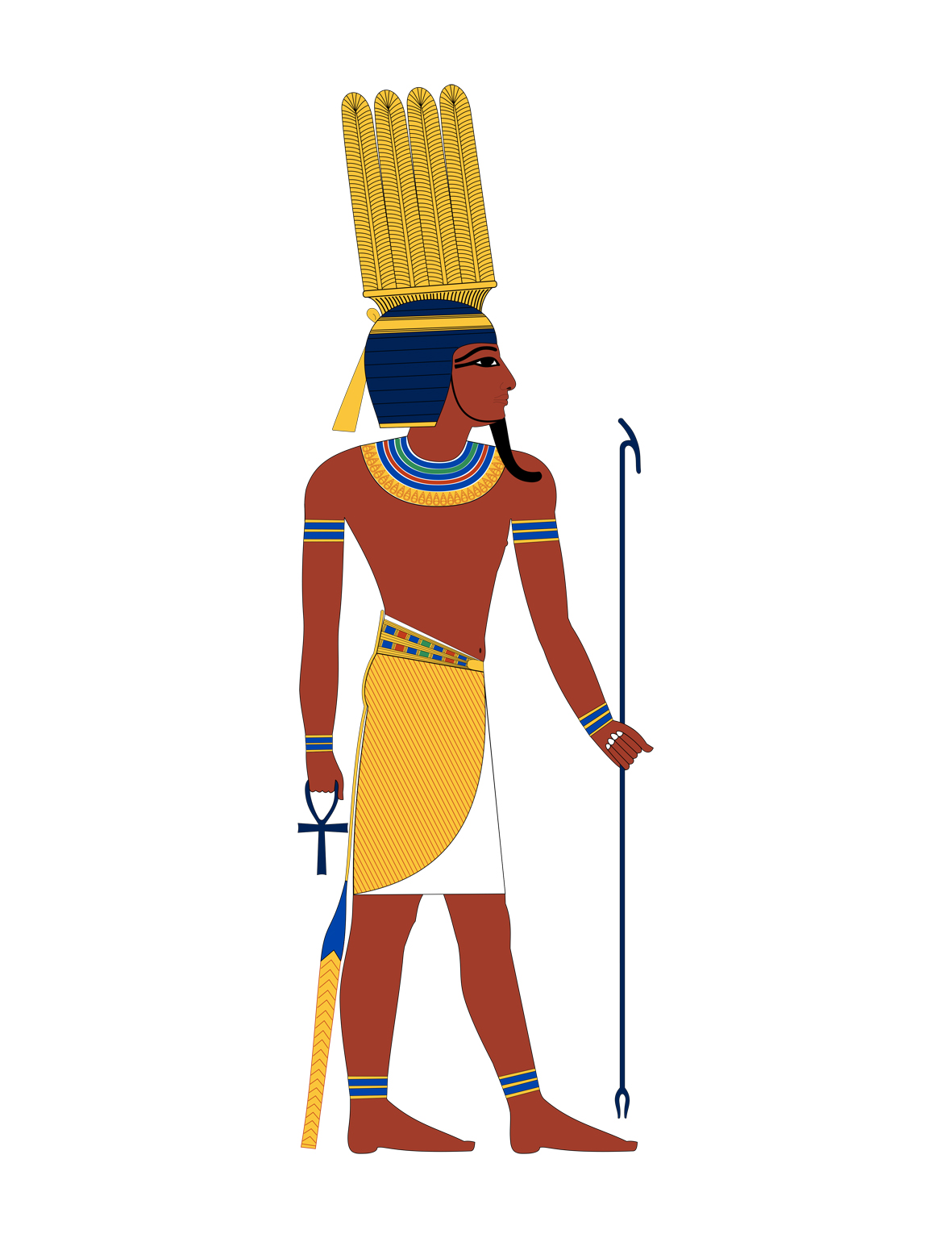
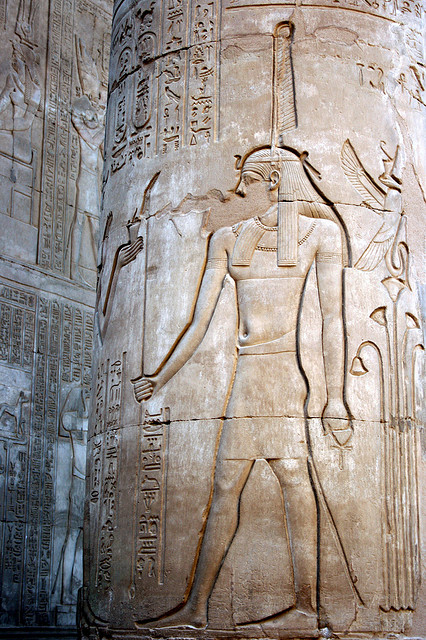
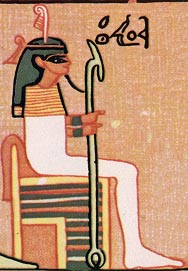
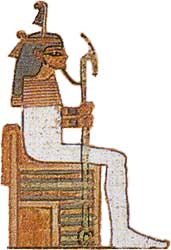
This is Shu between Nut above and Geb below
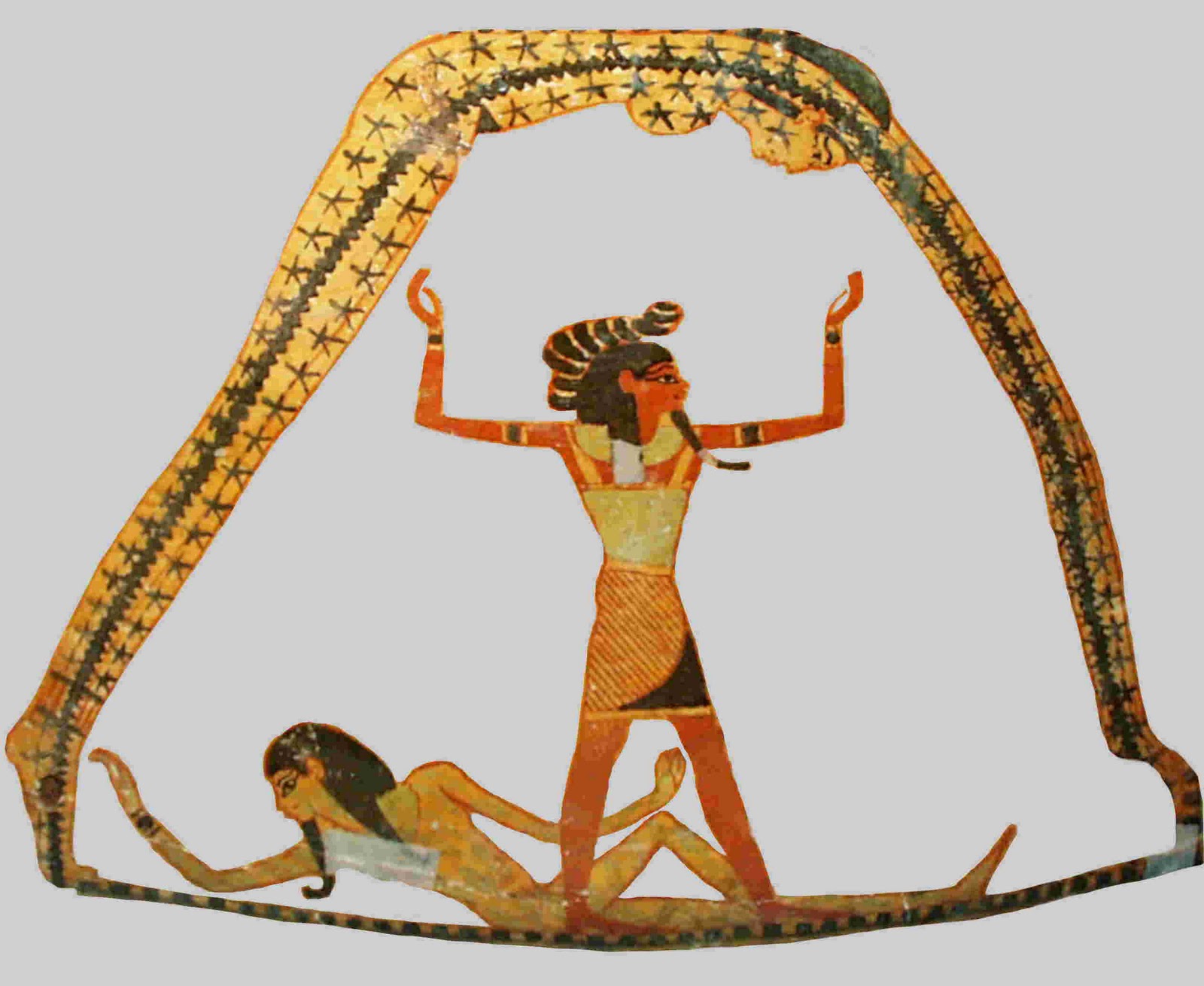
Another possible Egyptian deity is "Tefnut".
This is what Wikpedia says regarding Tefnut:
"Tefnut (Egyptian: Tefenet) is a goddess of moisture, moist air, dew and rain in Ancient Egyptian religion. She is the sister and consort of the air god Shu and the mother of Geb and Nut. Literally translating as "That Water", the name Tefnut has been linked to the verb 'tfn' meaning 'to spit' and versions of the creation myth say that Ra (or Atum) spat her out and her name was written as a mouth spitting in late texts.
Unlike most Egyptian deities, including her brother, Tefnut has no single ideograph or symbol. Her name in hieroglyphics consists of four single phonogram symbols t-f-n-t. Although the n phonogram is a representation of waves on the surface of water, it was never used as an ideogram or determinative for the word water (mw), or for anything associated with water".
Theses are images of Tefnut, goddess of water/moisture
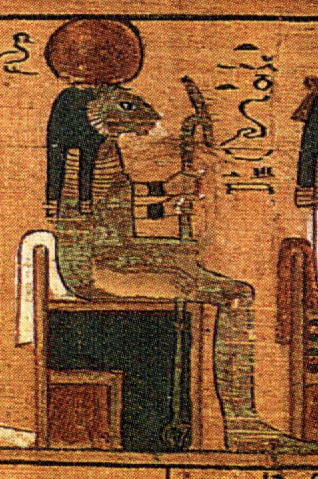
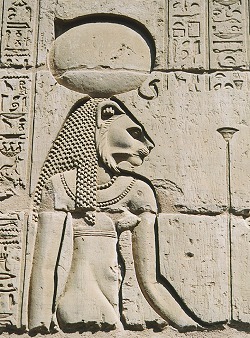
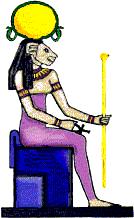
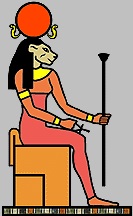
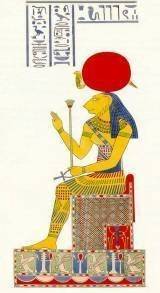
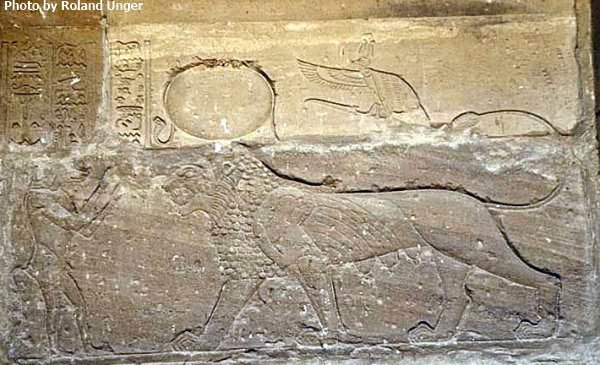
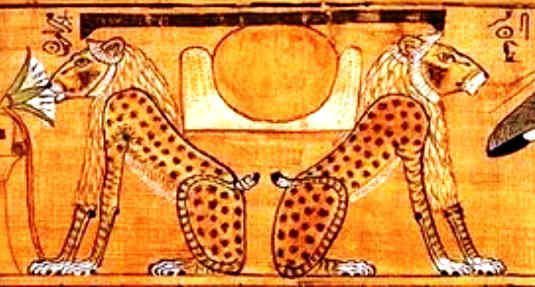

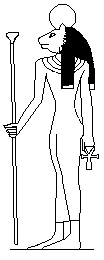
Another possibile Egyptian diety is "Seth".
This is what Wikipedia says regarding Seth:
"Set /sɛt/ or Seth (/sɛθ/; also spelled Setesh, Sutekh, Setekh, or Suty) is a god of the desert, storms, disorder, violence and foreigners in ancient Egyptian religion. In Ancient Greek, the god's name is given as Sēth (Σήθ). Set is not, however, a god to be ignored or avoided; he has a positive role where he is employed by Ra on his solar boat to repel the serpent of Chaos Apep. Set had a vital role as a reconciled combatant. He was lord of the red (desert) land where he was the balance to Horus' role as lord of the black (soil) land.
In Egyptian mythology, Set is portrayed as the usurper who killed and mutilated his own brother Osiris. Osiris' wife Isis reassembled Osiris' corpse and resurrected him long enough to conceive his son and heir Horus. Horus sought revenge upon Set, and the myths describe their conflicts. The death of Osiris and the battle between Horus and Set is a popular theme in Egyptian mythology".
These are the images of Seth, god of storms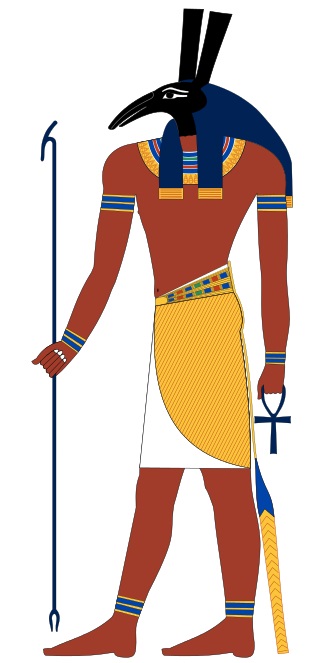
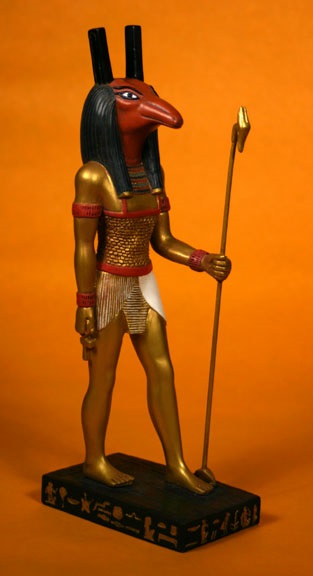
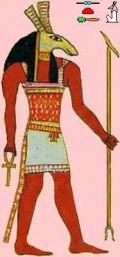
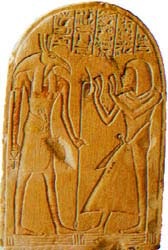
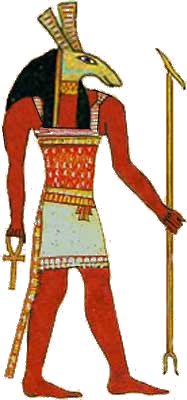
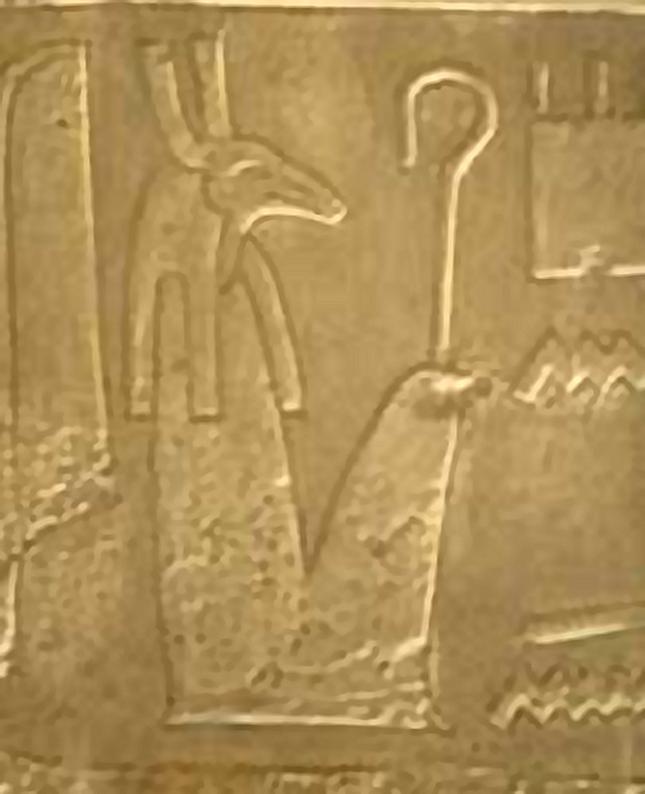
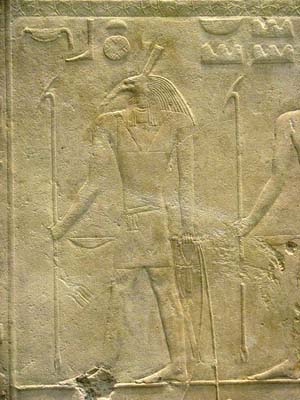
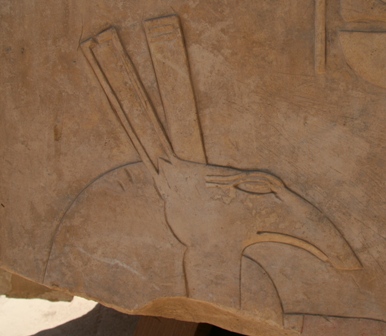
Ending, looking again the "knows" and "see" that Moses stated to Pharaoh in this week's Torah portion:
Exodus 6:7 ...and you shall know for I am hwhy, your Elohim, that brought you out [(the One bringing you out)] from under the burdens of Egypt.
Exodus 7:5 5 And Egypt, they shall know for I am hwhy in My stretching out (stretching forth) ta-My Hand over (upon) Egypt,...
Exodus 7:17 ...On this you shall know for I am hwhy:...
Exodus 8:10 ...by that, you may know for no one is like hwhy, our Elohim.
Exodus 8:22 ...by that, you may know for I am hwhy in the nearness of the Earth.
Exodus 9:16 ...in order [(in over)] that I have made you stand this, in order [(in over)] that you will see ta-My Power; by that, My Name may be enrolled (scrolled, numbered) in all of the Earth.
Exodus 9:29 ...by that, you may know for the Earth belongs to hwhy.
Looking at the verses in full, notice that the first verse from this list related to hwhy's People. The second one noted that Pharaoh would know hwhy through His destruction against Egypt. The next two referred to knowing hwhy, Himself. The fourth one referred to hwhy's existence. The fifth one regarded seeing hwhy without being named, but through the actions of His Power, and His Name to be declared on earth. The last one refers to know hwhy's ownership of the earth.
Judah Ephraim of Lion and Lamb Ministries noted that these plagues that are coming upon Egypt were to make them "know" hwhy, and also to Israel, because in relation to judgments, hwhy will make people know Him through them, whether they are for Him or not.
Indirectly related, the end times, hwhy will be confessed by everybody, which is noted in the apostle Paul's letter to the assembly in Rome
Romans 14:10 But why dost thou judge thy brother? Or why dost thou set at nought thy brother? For we shall all stand before the Judgment Seat of Messiah. 11 For it is written, As I live, saith hwhy, every knee shall bow to Me, and every tongue shall confess to hwhy. 12 So then every one of us shall give account of himself to hwhy.
This is taken from the book of the prophet Isaiah
Isaiah 45:22 Look unto Me, and be ye saved, all the ends of the earth: for I am El, and there is none else. 23 I have sworn by Myself, the Word is gone out of My Mouth in righteousness, and shall not return, That unto Me every knee shall bow, every tongue shall swear.
In a way, this shows us that hwhy will make people know Him whether they were/are righteous, or not, through their confession. This will happen in the end times when Yeshua will come down from the heavens to reveal Himself to the world, which is noted by the apostle John in the book of Revelation
Revelation 6:12 And I beheld when he had opened the sixth seal, and, lo, there was a great earthquake; and the sun became black as sackcloth of hair, and the moon became as blood; 13 And the stars of the heavens fell unto the earth, even as a fig tree casteth her untimely figs, when she is shaken of a mighty wind. 14 And the heavens departed as a scroll when it is rolled together; and every mountain and island were moved out of their places. 15 And the kings of the earth, and the great men, and the rich men, and the chief captains, and the mighty men, and every bondman, and every free man, hid themselves in the dens and in the rocks of the mountains; 16 And said to the mountains and rocks, Fall on us, and hide us from the face of Him that sitteth on the Throne, and from the Wrath of the Lamb: 17 For the great day of His Wrath is come; and who shall be able to stand?
I hope that this has been informative so far.
To be continued.
That ends the commentary on this week's Torah portion.
Any questions or comments can be written to
the.aleph-tav.project@msn.com
SHABBATH SHALOM

_______________________________________________________________________________________________________________________________________________
_______________________________________________________________________________________________________________________________________________
Copyright 2014 The Aleph-Tav Project - NVU's Website Design Software by The Premier Group